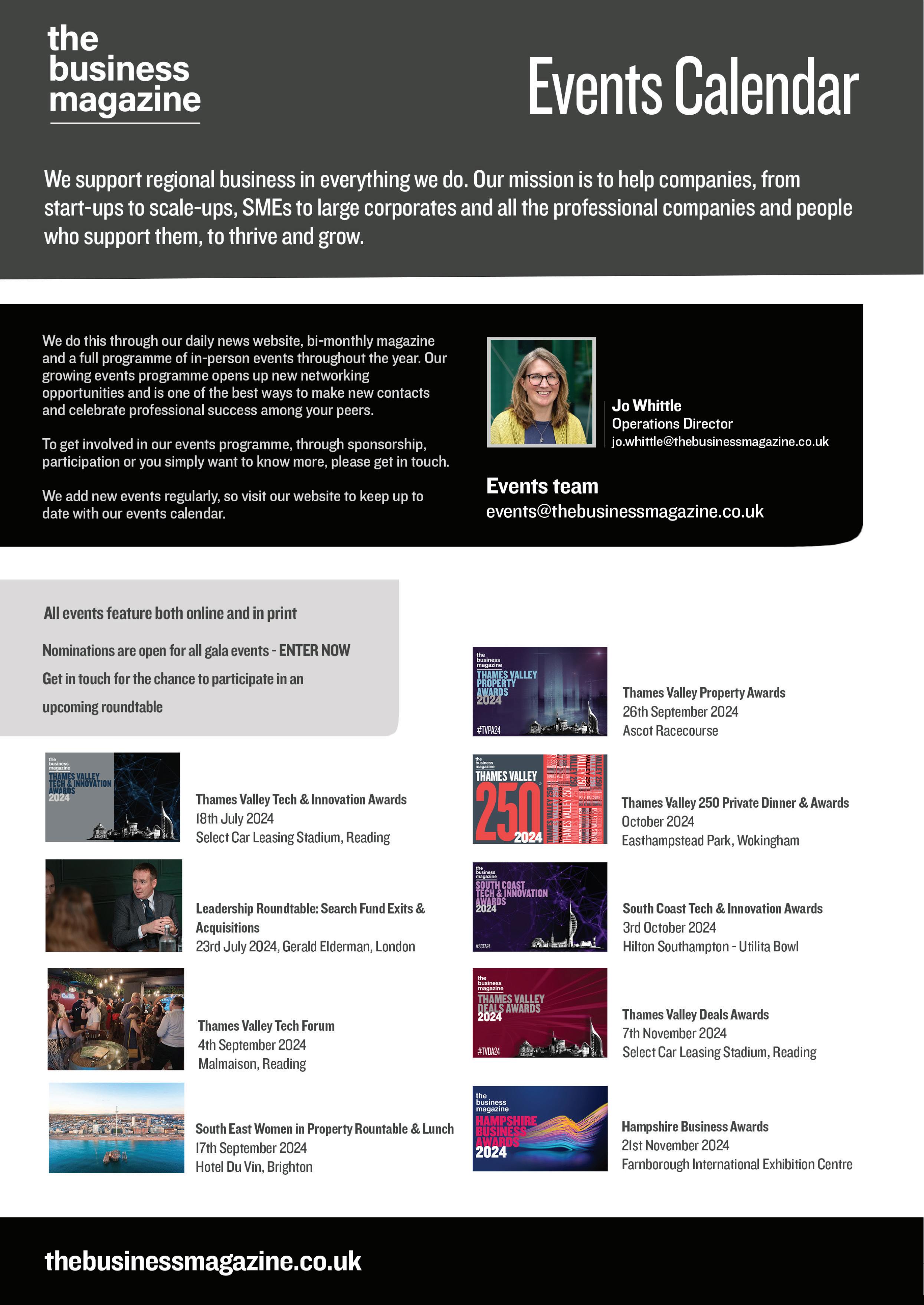FEATURE: THE RURAL ECONOMY
AMBITIOUS LEADERS
ROUNDTABLE: FINANCE



FEATURE: THE RURAL ECONOMY
AMBITIOUS LEADERS
ROUNDTABLE: FINANCE


The future could be bright. Just don’t land businesses with any more surprises
By the time this magazine has been published, we will have a new government.
Will they understand what business need and want? …. and I mean really understand, acknowledge and be prepared to create a fiscal environment that will allow businesses to plan strategically and invest in property, plant and people.
It was in February 2016 that David Cameron announced that there would be a vote on whether the UK should leave the EU. At that time a lot of businesses put a hold on expansion and investment plans until they knew the outcome. But for the next eight years, the seismic shocks have just kept on coming …Covid-19, the Ukraine and Gaza tragedies ….
But it is truly amazing how resilient this region’s businesses are. And in this issue, once again, we celebrate some of the sectors, businesses and business leaders who are resolutely looking ahead.
Our Aviation cover feature looks at how much time, innovation and money are being invested in decarbonising flight. We won’t stop people flying, but there are so many companies investing billions in the technology to allow us to do it guilt-free. Our second feature celebrates the rural

economy. And that doesn’t just mean farming and agriculture. Tourism and manufacturing might sound surprising bedfellows, but manufacturing is flourishing in many tourism hotspots, it’s just often tucked away.
The Business Magazine has also this year embarked on a strategic partnership with CarFest that will be of benefit to our readers and supporters. We speak to its founder, TV and radio personality Chris Evans about his plans for this year and what it offers Hampshire.
Prodrive founder David Richards has one of the longest and most successful careers in the automotive industry and in this issue we speak to him about his career and in what direction he thinks motorsport is heading.
Deals are the heartbeat of the business world and regular visitors to our website will notice that we have continually expanded our Deal Ticket portal. We’re also expanding our deals offering in print by including a behind the deals section which you will find in this edition.
And there is so much more within these pages.
Whatever happens at Westminster, the business world rolls on.
Stephen Emerson Managing Editor stephen.emerson@thebusinessmagazine.co.uk
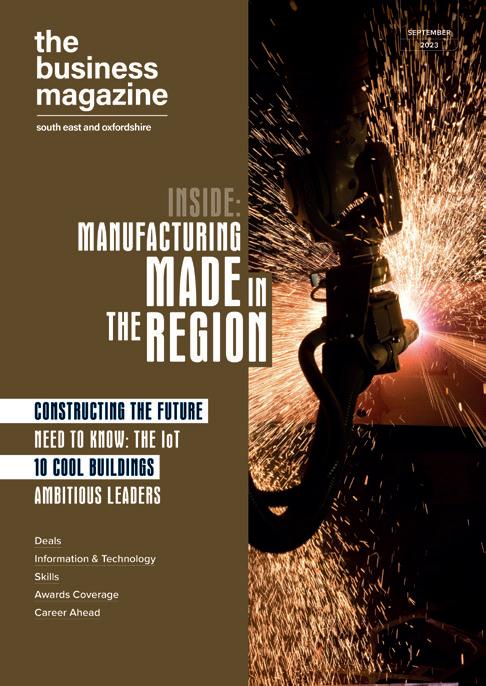
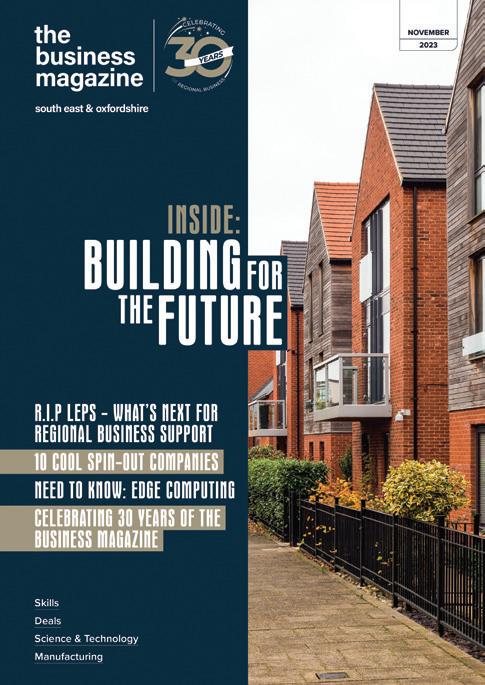

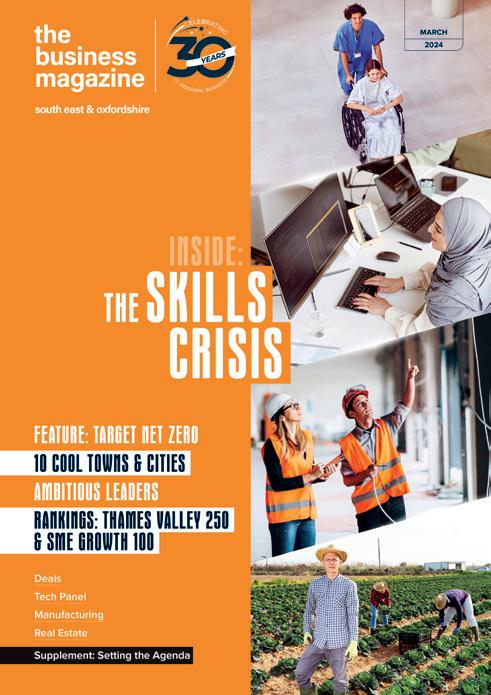
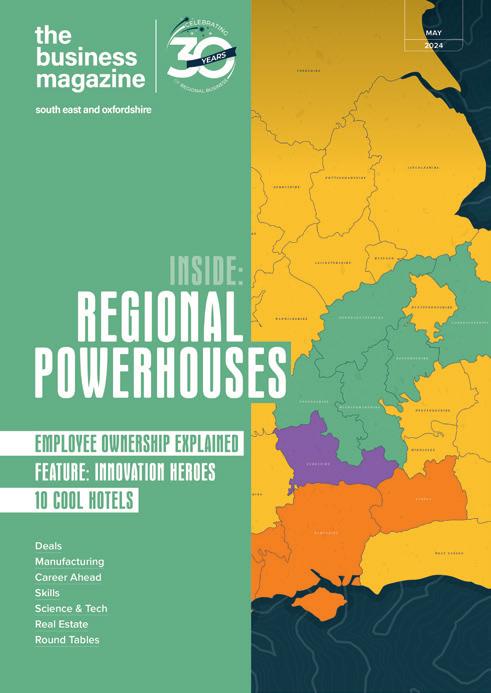






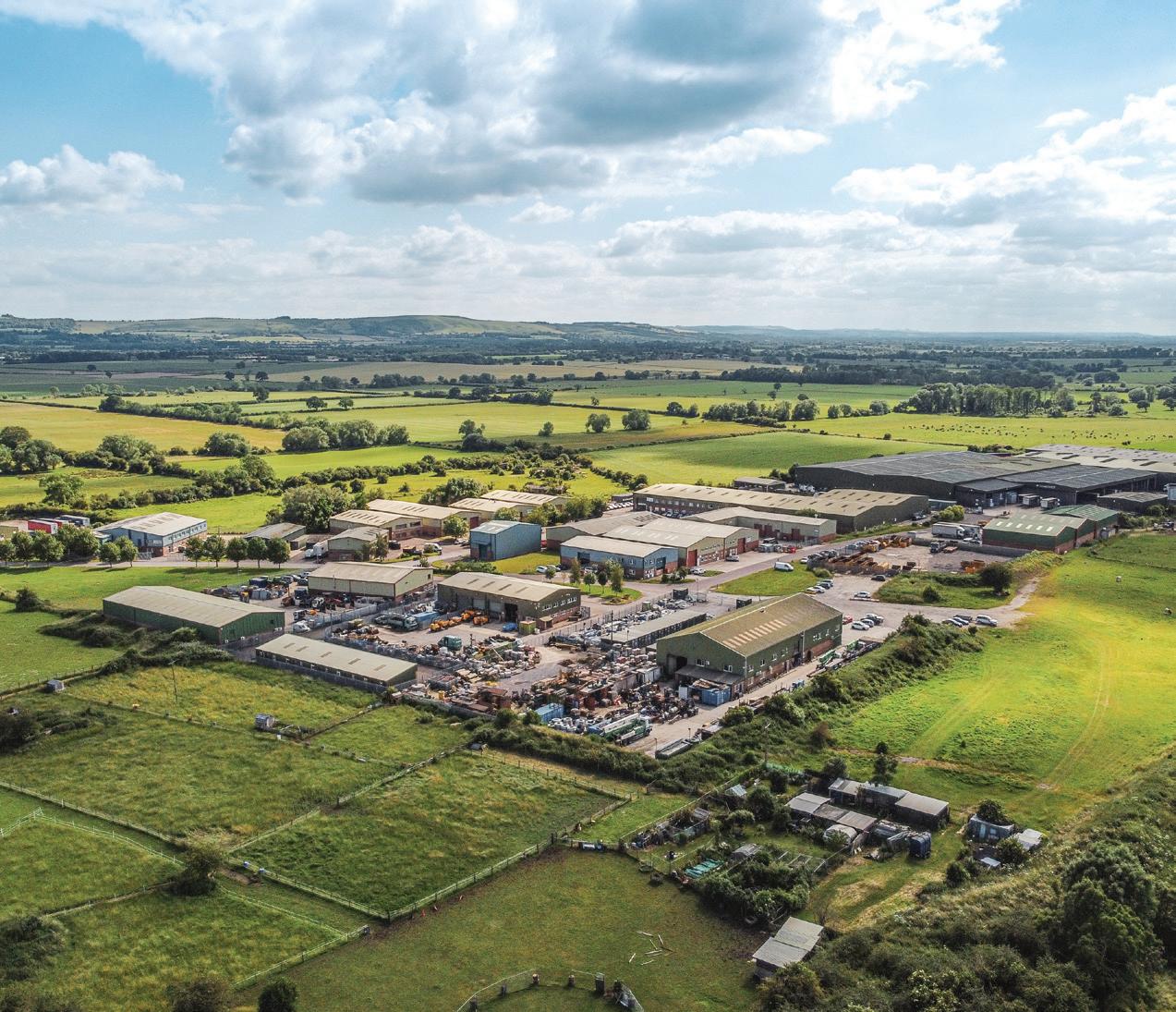


Space test chamber at National Satellite Test Facility.

The UK’s first ‘one-stop shop’ for large satellite testing has opened for business at Harwell Science and Innovation Campus.

LEGOLAND first opened in Windsor in 1996. By 2019 it was attracting nearly three million visitors a year, making it the UK’s most visited theme park.
While Covid temporarily put the kibosh on the UK’s theme park industry, it’s now bouncing back - and some. Revenues from the UK amusement and theme parks industry were £1.2 billion in 2023, according to research.
And Poole-based Merlin Entertainments, which now owns LEGOLAND, is investing again.
Its new hospitality village, worth £35 million and built by RED Construction Group, includes 150 accommodation lodges, nature trails, brick-building activities (obviously), storytime areas, and a host of Lego woodland creatures, all built into the resort’s woodland space.
There is also a new restaurant,
entertainment space, play areas, stage and bar.
Merlin Entertainments operates more than 140 attractions in 20 countries around the world, including Madame Tussauds, The London Eye and Alton Towers.
It also also operates Warwick Castle, where it recently commissioned RED Special Projects to build a £10.3 million 60-room hotel – opening later this summer.
Helen Bull, Divisional Director for LEGOLAND Windsor, said: ““The opening is huge milestone in the history of this iconic and most loved family theme parks.
“The £35 million investment is set to bring thousands of UK and International visitors to Windsor which will undoubtedly be a major boost to travel and tourism to the local area.”
The National Satellite Test Facility, operated by the Science and Technology Facilities Council (STFC) RAL Space, will ensure that spacecraft up to seven tonnes will survive launch and the harsh conditions of space.
It is also capable of testing minibus-sized satellites under similar conditions to those they will meet on their journey through space.
Satellites will be shaken violently to simulate rocket launch conditions, and ‘baked’ in the UK’s largest space test chamber to check their resilience to extreme temperatures in earth’s orbit and further afield.
The UK is investing more than £100 million in the NSTF to help deliver the national space strategy.
Dr Sarah Beardsley, Director of RAL Space, said: “It’s taken a lot of collaborative effort to get to this point, but the exciting part – using this facility to support the delivery of the National Space Strategy and prepare large-scale satellites for their various missions in space – is only just about to begin.”
Contracts have already been signed with Thales Alenia Space and Airbus Defence and Space to test ESA’s FLEX Earth observation satellite and SKYNET 6A, the latest satellite in the UK Ministry of Defence’s secure communication programme.

A first-of-its-kind imaging system is to be established at the University of Surrey thanks to a £3 million grant from the government-funded Engineering and Physical Sciences Research Council (EPSRC).
The new multimodal ion beam imaging facility will allow researchers and businesses to view and understand materials at an unprecedented microscopic level.
This poses a major opportunity not only for drug development, but also for the potential creation of more efficient solar cells and more durable batteries.
It could even help researchers better understand pollutants and develop new ways to combat climate change.
Similar to a powerful microscope, the system will be the first in the world to use beams of charged particles at high and low energies, providing a detailed map of the elemental and molecular make-up of biological systems and materials.
These high-energy beams are to be delivered by a particle accelerator at the UK National Ion Beam Centre, a national research facility funded by EPSRC and led by Professor Roger Webb at Surrey.
Professor Webb said: “We’ve been a national research facility since 1979 and support more than £100 million in funding from more than 30 universities.
“This is one of several upgrades to our centre, and we’re looking forward to opening our doors to researchers
across the UK to make the most of this investment.”
Surrey will be working with the University of Manchester and Hampshire-based electronics manufacturer Ionoptika to bring the new facility to fruition.
Professor Paul Townsend, executive dean of Surrey’s Faculty of Health and Medical Sciences, added: “There’s currently nothing in the world quite like this new facility of ours.
“It signals to the global scientific community that the UK means business.
“We’re confident that we’ll attract researchers worldwide to use this facility, giving the UK an edge in materials science.”
Rocksteady Music School, based in Liphook, Hampshire, has received investment from Vespa Capital, funded by alternative lender ThinCats.
Rocksteady runs lessons in a band setting for tens of thousands of children across thousands of primary schools – from mini rockers at reception to year two, to rock heroes in years three and four and up to rock icons in year six.
The Rocksteady Foundation also delivers more than £2 million worth of free teaching each year through bursary places and provides hundreds of free charity events.
It allows some of the most vulnerable children in society to enjoy the benefits of playing music in a band.
The funding from ThinCats via Vespa Capital will help Rocksteady roll out lessons across the UK – and internationally.
Founded by Mark Robinson in 2007, Rocksteady is among the FT1000 Fastest Growing Companies.
Mark said: “Seventeen years ago, I witnessed first-hand how many children were put off learning an instrument with outdated curricula and teaching methods.
“I wanted to break down barriers and empower more children with a music education that was enjoyable and enabled every child to succeed.
“I’m thrilled that this new partnership will lead to Rocksteady being enjoyed by many more children.”
Scott Monks, CEO of Rocksteady, added: “Building on Mark’s original vision and insights, the incredible team at Rocksteady have created a unique, for-profit, for-good business of scale, which ensures tens of thousands of primary school children get to experience the joy of music education and the wider social and academic benefits that performing in a Rocksteady band brings.
“Along the way, Rocksteady has become the largest employer of musicians on a full-time basis and is leading the way in measurement through an Ofqual regulated, exam-free music qualification, which harnesses an impressive propriety technology stack and revolutionises the way children are recognised for their achievements.
“We’re determined to bring the magic of Rocksteady to many more children worldwide.”
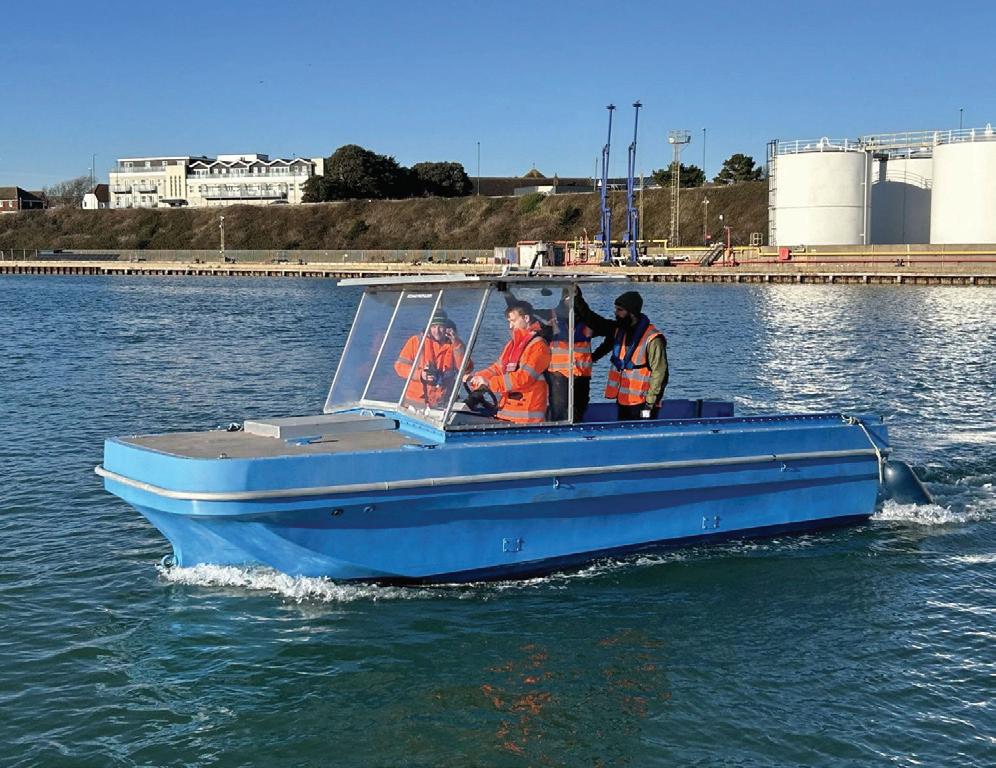
Ecomar Propulsion Hampshire has joined forces with Shoreham Port on a three-year project to adapt and test a 30-year-old recycled battery-powered boat.
The partnership between the design and manufacturing company and port aims to demonstrate how inland waterways and ports can benefit from Ecomar’s zero emission motors.
Two years ago, the old glass reinforced plastic (GRP) boat, originally built by Vikoma on the Isle of Wight, was lying in a scrap yard in Aberdeen.
During its working life, the boat had been used to contain oil spillages around the harbour and North Sea rigs.
Ecomar bought the boat – which due to its GRP composition, could not be recycled – and send it back out onto the water for what the team hopes will be at least another 10 years.
Eugene Bari, CEO of Ecomar Propulsion, said: “Plastic boats that have no remaining useful purpose are becoming a big issue.
“We aim to prove that it’s economically viable to recycle boats like this and to get them working to offset carbon.
“This boat is a great example of how industries can adapt apparently useless machines”.
David Daish, sales manager for Ecomar, said: “The team designed and installed the maximum number of recyclable parts. The motor is a high-power, axial flux design with a minimal space requirement and the aluminium wheelhouse, console and nontoxic cooling systems were designed and fabricated by the team in Fareham.”
The Vikoma will now be a regular sight patrolling Shoreham Port’s 1.6-mile canal

Aerospace companies are investing billions in decarbonising flight. It’s the global industry’s number one challenge
By Nicky Godding, Editor

In less than a decade, when you look up to the sky, the planes may look the same, but the way they’re powered will be very different.
Aerospace companies are investing billions in decarbonising flight. It’s the number one challenge for an industry which is one of the UK’s biggest success stories.
Our aviation industry is the third largest in the world. It contributes more than £22 billion to the country’s economy and underpins more than 350,000 jobs.
Alan Fisher is CEO at Farnborough Aerospace Consortium, one of the UK’s most established aerospace associations which supports the growth of the sector.
“Our biggest challenge is how we can fly aircraft without the current major impact on the environment. Battery technology might
work for cars, but not to power long-haul aeroplanes,” he says.
“While batteries will power general aviation, such as air taxis and other urban air mobility systems, as the planes go up in size the industry will move towards hydrogenfuelled aircraft, or hydrogen cell-fuelled aircraft.”
Hydrogen can either be burned in a jet engine or used to power a fuel cell to generate electricity and power electric propulsion. If powered by hydrogen, an aircraft requires four to five times the volume of conventional fuel to carry the same onboard energy. Providing hydrogen in gas form also requires a lot of storage volume.
While the government has hydrogenpowered aircraft as part of its future aviation initiatives, the technology isn’t there yet –nowhere near in fact.
But there is an interim step – sustainable aviation fuels (SAFs), and the world is making significant progress here. Last November a Boeing 787 flew from Heathrow to New York entirely powered by SAF. It was a first. The downside is that SAF is basically farm, animal (or human) waste, fats, greases and oils - and we don’t have enough human or animal waste – or used chip fat.
And despite what the headlines might suggest, SAF isn’t carbon-free, it’s carbon neutral.
Alan explains: “To create SAF, unlike hydrogen, you create carbon on the ground. While you’re not burning it in the sky and it makes aerospace look environmentally-friendly, that’s not the

whole picture. You can’t create SAF without creating carbon.”
So back to hydrogen and the immense technical challenges around that.
“If you put hydrogen in aircraft, where do you put it?” asks Alan. “And will it be cryogenically cooled, which means putting an icebox on the plane? Or are you going to put in methane, a noxious chemical, to make it fluid? And how are you going to pump it around and use it as propulsion?”
Then there’s the infrastructure needed to support both SAF and hydrogen, on the ground and in the air. To use a different type of fuel, an aeroplane’s infrastructure – all the piping, pumping, connectors and seals will have to change too.
It’s almost like going back to the drawing board for how a plane will operate.
The aerospace industry is looking at everything, including reducing the weight of aircraft.
“The lighter the aircraft, the less propulsion is needed, so less fuel is required leading to lower environmental damage,” said Alan.
“The Boeing 787 is 60 per cent composite now, making it a lot lighter, and the Airbus A320 has a more efficient environmentallyfriendly engine.”
How an aircraft is flown can also contribute to its fuel efficiency – just as with road vehicles.
“An aircraft is at its most efficient in cruise control,” said Alan. “The most inefficient part of a flight is the take-off and landing. We can’t do much about improving the take-off (rather than make it less steep, which can’t always be done), but technology can stop pilots having to go round and round to wait for a landing slot.
“There is a lot of ground to aircraft communication technology being developed allowing air traffic control to tell pilots to adapt their speed further out so that they arrive and can land without stacking. These are logical solutions that take practical thinking rather than large investment.”
There are so many challenges to making flight environmentally-friendly, but the commercial prize is so great that the world’s biggest aerospace companies are investing billions to be first in the race.
Luckily for this country, the UK’s aviation engineering prowess is among the best in the world and a lot of that is down to the huge amount of collaboration that goes on among aviation companies and their engineers.
A good example of this is a programme called HyFive, a collaborative venture between aerospace companies such as GKN Aerospace, Parker Meggitt and others researching hydrogen propulsion and hydrogen systems on aircraft.
But while collaboration hasn’t stopped, the freedom of movement previously made
possible by the UK’s membership of the European Union is more of a problem thanks to Brexit. Engineers can still commute between the UK and, say, Airbus in Toulouse, but it’s more time-consuming and there’s more paperwork involved.
Skills is another issue in any industry, but particularly in aerospace. There is a skills shortage of maintenance engineers needed to service and maintain electric aircraft and that will only grow as numbers of electric aircraft grow, unless more are trained.
Alan is aware of this problem. “The principal of Farnborough College is on our board so that we can tackle this together.”
“Ask any company in aerospace and aviation what their biggest challenges are, and they will say skills, access to finance, technology exploitation and export,” said Alan.
“We have technology managers to support young companies seeking finance, and we link them into funding streams and programmes to help them.
“The big problem in this country is that after Technology Readiness level three (TRL3) – where proof of concept has been established, there’s no funding.
“And that’s right at the start of what we call ‘the valley of death’ where a start-up is facing costs but no revenue. So, while the development of technology is supported by government, when our innovators have got proof of concept, we leave them. And two things can happen – either the innovation just dies on the vine, or a global enterprise will buy the company. And this isn’t healthy for the company, or the UK because the key thing about having a start-up is they’re able to be extremely agile.”
Farnborough Aerospace Consortium, and fellow organisations such as the West of England Aerospace Forum, NorthWest Aerospace Aliliance, Aerospace Wales and the Midlands Aerospace Alliance all work with start-ups to help them in practical areas such taxes, export licences and space to grow.

The chief executives at Virgin Atlantic and British Airways have called for radical collaboration between government, aviation fuel providers and the wider industry to reach net zero by 2050.
Virgin Atlantic’s Shai Weiss and British Airways’ Sean Doyle were speaking during a panel at the 2024 Sustainable Skies World Summit, held in Farnborough.
Also on the panel were Julie Kitcher, Chief Sustainability Officer at Airbus and Brian Moran, Chief Sustainability Officer at Boeing.
They discussed the positive steps made between the organisations and the increased investment in sustainable technology to reduce carbon emissions. While the government’s SAF (sustainable aviation fuels) mandate is welcome, the panel agreed that it’s not just the airline manufacturers and airlines’ responsibility to drive change and more needs to be done by government and the wider
sustainable aviation fuel infrastructure to achieve the targets set.
Shai Weiss said: “It’s not often that you see two sets of competitors going toe to toe on stage.
“We agreed that radical collaboration is required for our industry to reach net zero by 2050 with a focus on the near-term, including fleet modernisation, wide adoption of SAF, as well as longer term technological innovation including hydrogen and electrification.
“Virgin Atlantic recently published its much-anticipated findings from Flight100 (which flew on 100 per cent SAF from Heathrow to New York) as an open resource to show the industry that SAF is a safe, 100 per cent drop-in replacement for fossil fuels.
“Decarbonisation is a big issue. Our position at Virgin Atlantic is clear – if enough SAF is made, we will fly it.”
Held at the Farnborough International Exhibition and Conference Centre, Sustainable Skies World Summit 2024 brought together international aviation and aerospace companies, with government.
The Jet Zero Council (a partnership between industry, academia and government) discussed the delivery of net zero and zero emission aviation through UK production of zero-emission flights and SAF.
Government ministers also participated in round table and panel sessions.
Gareth Rogers, CEO of Farnborough International, said: “The meetings and discussions held over the two days will propel strategy and partnerships forward.
“We look forward to continuing the conversation with the global industry at Farnborough International Airshow this month.”
The Ministry of Defence has ordered a further six Airbus H145 helicopters as the next step in renewing its rotary fleet and cutting the number of different types in service.
The new aircraft will be deployed to Cyprus primarily for emergency response duties and to Brunei to support UK military training in jungle warfare and will replace Airbus Pumas currently performing those roles.
Oxford-based Airbus Helicopters Managing Director, Lenny Brown, said: “We congratulate the MoD on this smart acquisition which simultaneously provides the right-sized helicopter for the Cyprus and Brunei requirements, represents excellent value for the UK taxpayer, and is another key step in the rationalisation of types in the transport helicopter fleet.”
“The H145 Jupiter, and its sister H135 Juno, continue to demonstrate exceptional reliability and versatility in the training role

in the Military Flying Training System (MFTS) and will bring these crucial attributes to their new tasks.”
The new helicopters will be delivered next year and will serve alongside 29 H135s and seven H145s in the Defence Helicopter Flying School which trains all UK military pilots. The enlarged H145 fleet brings economies of support costs and substantially reduces pilot conversion training time.
at this
Farnborough International Airshow, which takes place from July 22-26, has reported record-breaking demand for exhibition space and sponsorship packages.
Despite the ongoing supply chain challenges, the aerospace and space industries are set to soar during the next year.
The IATA (International Air Transport Association) estimated that the global airline industry expected to return to profitability in 2023, reaching $5 billion in profit, and Accenture reported that maintenance, repair and operation (MRO) was expected to stay steady through 2023, with most executives anticipating MRO budgets will stay the same or increase in the next 24 months.
The air show also includes the global space market, which has grown to approximately $447 billion, up from $280 billion in 2010, and is estimated to reach $1 trillion by 2030, according to a report by McKinsey and World Economic Forum.
The industry’s reporting of high, pre-pandemic level results is reflected in the increased demand for exhibition opportunities and floor space at Farnborough International Airshow 2024.
The latest version of Airbus’ best-selling H145 adds an innovative five-bladed rotor to the multi-mission H145, increasing the useful load of the helicopter by 150 kg. Worldwide there are more than 1,675 H145 family helicopters in service, with a total of more than 7.6 million flight hours. Powered by two Safran Arriel 2E engines, Airbus says its particularly low acoustic footprint makes the H145 the quietest helicopter in its class, while its CO2 emissions are the lowest among its competitors.

Gareth Rogers, CEO of Farnborough International, said: “As the first internationally renowned airshow to take place after the pandemic, Farnborough International Airshow 2022 signified the revival of the aerospace, defence, and space industries and proved the value and need for global airshows. Since then, we have seen the aerospace industry accelerate partnerships and sustainable strategies to take their operations to new heights.
“At Farnborough International, we are ready to support the industry within this period of growth and act as a catalyst for positive, future-focused change that will steer the trajectory of aerospace, space and defence for the next decade. We are working tirelessly with the global aerospace industry to provide opportunities at the 2024 airshow and will be implementing a waitlist for those who are still keen to engage with the event.”

Independent aircraft designer and manufacturer Britten-Norman has secured new investment from a group of investors led by private equity firm 4D Capital Partners LLP. The total amount of the investment was not disclosed.
The company can now concentrate on its platinum anniversary. This year marks 70 years since Britten-Norman was founded.
Based on the Isle of Wight, BrittenNorman’s aircraft include the Islander, Trislander and Defender 4000, which are typically used in aerial surveys, air ambulance services, surveillance, law enforcement and security.
John Britten and Desmond Norman started the business in 1954 after completing apprenticeships at De Havilland.
First conceived as an aircraft modification company, the two entrepreneurs soon identified a gap in the market for a high payload, short sector, short take-off and landing aircraft capable of operating in some of the most remote parts of the
world. Ten years later, the Islander was born.
Britten-Norman Chief Executive, William Hynett OBE, said: “The board has been in an extended process to secure the right investment that would allow BrittenNorman to deliver its plans to scale up output to meet demand.
“We are a brand with a rich and entrepreneurial aviation heritage which takes great responsibility in playing a vitally important role in supporting its world-wide customer base. These customers are the bedrock of their societies, often providing critical infrastructure or life-critical services such as maritime search and rescue and medical evacuation.
“Following a great deal of interest in the business, we are pleased to have identified a new investor that shares our vision and strategy.”
Alex Silk, founder of 4D, said: “We saw the latent value in Britten-Norman which has been underperforming since the
pandemic. In addition to bringing working capital, our team will help the company ramp up production to meet demand for its sought-after Islander aircraft.”
William added: “This is a very important year for Britten-Norman. 2024 will see the first all UK-built Islander being delivered from our Isle of Wight manufacturing base.”
Last year, Britten-Norman moving manufacturing of the Islander back to Bembridge in the Isle of Wight, from overseas.
The iconic Islander aircraft, variants of which have been manufactured by the company for more than 50 years, are being built in the UK for the first time since production was moved to Eastern Europe in the late 1960s.
To help build its skills base, Britten-Norman has introduced a new apprenticeship scheme in partnership with the Isle of Wight College. The new apprentices will be directly involved in the manufacture of the new aircraft.
Barnbrook Systems has won a six-figure order supplying its helicopter refuelling enablement system to an aircraft being built by Italian aerospace firm Leonardo.
The Hampshire company’s innovative refuelling switch has made mid-air refuelling easier, safer and more efficient.
Barnbrook is supplying 80 of the systems for Leonardo’s AW101, AW149 and AW159 helicopters for use by the military and search and rescue operators, among other customers.
This latest transaction follows an initial deal signed between the two companies at Farnborough International Air Show in 2016.
Andrew Barnett, a director at Barnbrook, said: “This is a major order for our innovative refuelling switch system and biggest order of 2024 so far.
“Our inflight refuelling enablement system has generated significant recurring revenues for the business over the past eight years.
“This success reflects the commitment, time and money we invest in developing and continually improving technology-driven solutions for our key markets in defence, rail, fire and security.”
The system uses intelligent sensing technology to detect fuel movement in tanks and cut off pumps in fractions of a second to prevent spills.
This allows for refuelling at speed, during turbulence, or on ship decks in heavy seas, while also improving an aircraft’s range, performance and operational capabilities.
Founded in 1978, Barnbrook is expecting turnover to grow by 30 per cent this year.
Barnbrook plans to attend its 14th consecutive Farnborough Air Show this month.
In a first-of-its-kind achievement, the UK has successfully completed commercial flight trials of advanced quantum-based navigation systems that cannot be jammed or spoofed by hostile actors.
While GPS jamming is currently relatively rare, new quantum-based Positioning, Navigation, and Timing (PNT) systems could help ensure that the thousands of flights that take place around the world daily, proceed without disruption.
Infleqtion, a global quantum technology company with a major base in Oxford, in collaboration with aerospace companies BAE Systems and QinetiQ, completed the trials at MoD Boscombe Down in Wiltshire.
These tests are the first time that this sort of ground-breaking technology has been tested in the UK on an aircraft in flight.
The project received nearly £8 million in government backing. This funding, together with the £2.5 billion National Quantum Strategy and the National Quantum Technologies Programme, aims to cement the UK’s position as a leading quantum-enabled economy.
PNT helps us know our location, navigate, and keep track of time. The cornerstone of modern PNT technology is precision clocks. These ultra-accurate timekeepers are crucial for various applications.
The test is part of a project funded by UK Research and Innovation (UKRI) specifically focusing on creating quantum sensors to address the UK’s heavy reliance on GNSS/GPS for location, navigation, and timing data.

This dependence creates a vulnerability, as a single point of failure (like jamming or spoofing GPS signals) could disrupt critical economic, defence, and strategic activities.
Infleqtion UK President, Dr Timothy Ballance, said: “Our trials mark a significant step forward in the development of quantum PNT solutions.
“The work we have done directly addresses the critical need to reduce our reliance on satellite navigation systems, which are vulnerable to various risks.
“The successful flight trials demonstrate the potential of quantum technology in overcoming navigation system challenges, which is an exciting development for future applications in the aerospace industry and beyond.”
Simon Galt, Managing Director (Air), at QinetiQ, said: “We’re proud to be partnering with BAE Systems and Infleqtion to enable the successful trial of this technology, demonstrating our ability to rapidly and effectively collaborate across the defence ecosystem, combining our quantum expertise with our Airborne Technology Demonstrator jet.”

In January last year, ZeroAvia made flight history. The aviation pioneer, which is developing the world’s first zero-emissions engines for commercial aviation, flew a 19seat Dornier 228 testbed aircraft retrofitted with a full-size prototype hydrogen-electric powertrain.
The plane successfully took off and landed at ZeroAvia’s research and development facility on the Gloucestershire/Wiltshire border. It was a 10-minute flight that changed the way the industry sees sustainable flight for ever.
Since then, ZeroAvia has joined the government’s hydrogen propulsion
taskforce, signed agreements to provide maintenance and support with a number of aircraft operators which are taking steps to convert their fleets to zero-emission propulsion.
And as the industry and investors become increasingly confident in the potential of its technology, last November, ZeroAvia completed a $116 million Series C funding round, backed by the UK Infrastructure Bank alongside Airbus, Barclays Sustainable Impact Capital and NEOM Investment Fund (NIF).
It will also offer some of its key components designed for its hydrogen-
electric engines to other clean aviation innovators. The move allows ZeroAvia to build on the multi-billion dollar per annum market for its hydrogen-electric powertrain family, maximizing the company’s investment in research and development.
The most environmentallyfriendly and economic answer
ZeroAvia is developing hydrogenelectric propulsion systems, which it says is the most environmentally-friendly and economically attractive solution to aviation’s growing climate change impact.
Hydrogen-electric engines use hydrogen in fuel cells to generate the electricity needed to power electric motors turning an aircraft’s propulsors making these engines the cleanest and most efficient path to powering future aircraft.
The business was founded in 2017 by USA cleantech entrepreneur Valery Miftakhov. His company eMotorWerks had developed smart EV-grid integration hardware and software, which he sold to an Italian energy company.
He went on to found ZeroAvia to solve the aviation industry’s growing climate impact.
ZeroAvia now employs more than 350 people across its UK and California sites. It is initially targeting a 300-mile range in 9-19 seat aircraft by the end of next year and up to a 700-mile range in 40-80 seat aircraft by 2027.
To drive such ambition, you need the best people and in 2021 the company recruited James McMicking from his previous role as one of the founding executives and Chief Strategy Officer at the Cranfieldbased Aerospace Technology Institute (the body developing the UK’s aerospace technology strategy).
“The industry is interested in hydrogen because it generates no CO2 emissions at the tail pipe and can be generated using a variety of sources of energy which are all clean,” he said.
Isn’t sustainable aviation fuel (SAF) already contributing to cleaner flights? The International Air Transport Association (IATA) estimates that SAF could contribute around 65 per cent of the reduction in emissions needed by aviation to reach net-zero in 2050. But that will require a massive increase in production to meet demand.
“While SAF helps reduce CO2 emissions, there isn’t enough waste available to produce the amount needed to sustain the global aviation industry,” says James.
“Producing enough SAF will require new and expensive production processes, including ‘power-to-liquid’ fuels that need both clean hydrogen and captured CO2 combined to make the jet fuel. The cost of this will be astronomical compared to today’s fuel prices and using hydrogen directly to power aircraft will be more efficient and cleaner.”
ZeroAvia has a highly skilled workforce with a Silicon Valley mindset: Let’s do it and learn
So why not use batteries, as in electric road vehicles? Because hydrogen is much lighter compared with batteries and can be stored as a gas or liquid, James points out. And every extra ounce of weight matters when you’re in the air.
True innovation is led by new entrants to the sector, James said: “Entrepreneurial start-ups don’t have the baggage associated with maintaining a legacy product line based on different capabilities and are entirely focused on one mission: the introduction of new technology.”
ZeroAvia launched in California and became an Anglo-American company thanks to ATI support. Having seen what it was hoping to achieve, James moved to the company.
“ZeroAvia has a highly skilled workforce with a Silicon Valley mindset: let’s do it and learn.”
The company undertakes engineering and aircraft research, development and integration at Cotswold Airport, and after the pioneering flight using its prototype hydrogen-electric powertrain last year, it now runs regular flights to test the engine further.
“We have built up a strong flight test team at ZeroAvia to conduct all our engineering test flights which is essential for feeding important learnings back into the development of our commercial engine. We’re the only company in the UK with this capability.” he said.
Historically, planes have been designed to carry fuel in the wings, but you can’t easily store hydrogen there, so if more aviation companies adopt ZeroAvia’s technology at the design stage (rather than retrofitting existing planes as will be done in the
medium term), future planes could look very different.
“A new plane might have more propellers,” said James. “Most planes have two engines, but with an electric powertrain the electricity can be created in one place and power directed where it’s needed. This could make the fuselage more bulbous to accommodate the extra fuel, and the wings skinnier to make the plane more aerodynamic.”
ZeroAvia is already working with airframers developing new future aircraft to run on hydrogen.”
New infrastructure will also be needed by airports around the globe to deliver the hydrogen production, storage and distribution required to support future zeroemission routes – and ZeroAvia is working with international airports on developing such hydrogen infrastructure.
James admits that ZeroAvia’s technology doesn’t yet solve the problem of longer flights. “It may well be that hybrid engines are used on long haul flights, a combination of hydrogen turbine and fuel cells working together.”
The biggest challenge for any flight is getting the plane up to cruise altitude, which requires a huge amount of power. Once at cruise, the power needed to propel a plane reduces substantially.
James sees those using large turbo-props for regional flights this decade, followed by new narrow body jets in the 2030s for regional flights being the first to make the switch.
“Our challenge is scaling the technology as quickly as possible to bring zero emissions to every aircraft; so far we’ve doubled power output about every two years and aim to continue or even exceed that rate of development.” he added.
There are more than 350 of aviation’s best minds at ZeroAvia determined to be the first.


Are you ready for the October 2024 deadline?
A new legal duty is being imposed on UK employers to take “reasonable steps” to prevent sexual harassment of employees in the course of their employment. The new duty is expected to come into force in October 2024 and originates from the Worker Protection (Amendment of Equality Act 2010) Act 2023, which aims to enhance protections against sexual harassment for employees. B P Collins’ employment team explores the steps employers need to take now to help prevent issues in the future.
Sexual harassment is a form of discrimination that involves unwanted conduct of a sexual nature that has the purpose or effect of violating a person’s dignity or creating an intimidating, hostile, degrading, humiliating or offensive environment for them.
The unwanted conduct could be verbal or physical, so inappropriate comments, gestures, or jokes of a sexual nature; unwanted touching or advances; displaying sexually explicit materials; and requests for sexual favours are all potentially sexual harassment.
Treating someone unfavourably because they submit to or reject unwanted conduct of a sexual nature will also be harassment.
What changes are coming?
Be proactive: Employers will be required to proactively implement measures to prevent sexual harassment, rather than just reacting to incidents. The specific steps considered reasonable may vary depending on the size and resources of the employer and the nature of the workplace.
Tribunal powers: Employment tribunals will have the authority to increase compensation by up to 25% in cases where an employer is found to have failed in their duty to prevent sexual harassment. Compensation for sexual harassment can often run into tens of thousands of pounds before any uplift.
Role of the Equality and Human Rights Commission (EHRC): The EHRC will be able to enforce the new legal duty, including investigating suspected harassment, entering into binding agreements with employers, and assisting individuals with legal proceedings.
What should employers do now?
There shouldn’t be any delay in delivering:
Updated policies: Review and update anti-harassment policies to ensure they are comprehensive and clearly communicated to all employees.
Training sessions: Provide regular and effective training for all employees and managers on recognising and preventing sexual harassment.
Updated reporting procedures: Establish clear and accessible methods for
employees to report harassment, and ensure these reports are handled promptly and effectively.
Risk assessments: Conduct regular risk assessments to identify potential areas of concern and implement targeted measures to address them
What does the legal duty not cover?
It’s important to note that the new legal duty for employers does not cover harassment based on other protected characteristics such as race, religion or disability.
Additionally, originally proposed protections against third-party harassment, such as by customers or clients, were watered down in the final legislation. However, employers should not ignore potential third-party sexual harassment and should consider taking steps such as installing appropriate signage, which is visible to customers and clients.
B P Collins LLP has a dedicated employment law team and runs the HR consultancy, HR2HELP, which can help employers navigate constantly evolving employment legislation.
For detailed advice on the new duty, and what reasonable steps need to be taken to encourage a safe and respectful workplace, you can contact us on enquiries@bpcollins.co.uk or call 01753 889995.





A new arboretum and research facility is to be built in Wokingham.
The new Bartlett Tree Experts Arboretum and UK Research Laboratory in Spencers Wood is expected to be open late next year. Construction will begin this December.
The new site will serve as a research and educational centre for Bartlett clients and arborists in the UK and Ireland.
Bartlett Tree Experts was founded in 1907 by Francis A Bartlett and is now a global scientific tree and shrub care company.
The building will include office, research and lecture space. Surrounding the laboratory, Bartlett’s arboretum will be a “living museum,” the company said, featuring environmentally tolerant collections of rare and unusual trees and
plants, woodland walking trails and native wildlife habitats.
When completed, the 50-acre arboretum and research laboratory will complement the RA Bartlett Tree Research Laboratories and Arboretum in North Carolina in the United States.
Jon Banks, Research Lab Manager for the UK Bartlett Tree Research Laboratory, said: “The arboretum and research laboratory will allow us to develop and demonstrate the latest in scientific tree care best practices.”
With unanimous approval granted from Wokingham Borough Council, Bartlett is developing the project with a team of more than 20 Bartlett arborists, research scientists, architects and specialty consultants including Snug Architects and Harris Bugg Studio.

A Didcot automotive business which specialises in repairing the classic Nissan Figaro car model is expanding into a new location with support from HSBC UK.
The Figaro Shop will use a £1.66 million funding package from HSBC to acquire a service station in Thatcham, Berkshire, which has been used as a service and tyre repair shop for the past 15 years.
Its services will include tyre fitting, MOT and car repair services for local residents to Nissan Figaro enthusiasts, as well as for local council vehicles.
The Figaro Shop has already created two new jobs in Thatcham and is planning to hire further staff in the area as it looks to boost annual profits 30 per cent this year.
Tobyn Brooks, owner of The Figaro Shop, said: “As a business founded by someone from a disadvantaged background, I’m extremely committed to creating jobs and making a positive impact within communities.
“The automotive industry has been instrumental in my success, and HSBC UK has been an incredible partner in supporting The Figaro Shop with future growth.
“This funding means much more than bricks and mortar – it represents hope, resilience and opportunity.”
A partnership has been launched between measurable.energy and national construction group Morgan Sindall.
The Reading energy firm provides small power device monitoring, energy savings and carbon reduction solutions to help eliminate wasted small power –energy consumed by devices left on standby or idle.
This wasted energy can account for up to 40 per cent of total electricity usage in commercial buildings and 95 per cent in site accommodation.
The company’s system includes dual-gang wall sockets, fused spurs for higher-powered devices, extension leads for desks and an online dashboard for monitoring, reporting and remote control.
These tools will be applied across Morgan Sindall’s own offices and site accommodation.
Dan Williams, co-founder and CEO of measurable.energy, said: “We’re thrilled to partner with Morgan Sindall to advance sustainability efforts within the construction and infrastructure sectors.
“Our collaboration will empower Morgan Sindall to achieve significant and tangible reductions in energy consumption and carbon emissions, aligning with their commitment to lead the industry in reducing environmental impact.”
Technology and supply chain management company ByBox has introduced the world’s first battery-powered locker technology.
The Slough company says its radio frequency identification (RFID) lockers will help improve product tracking accuracy and reduce stock loss by minimising the risk of human error.
ByBox currently has more than 45,000 smart lockers across more than 1,500 sites throughout the UK.
The new lockers will enable businesses to securely collect and return equipment and parts.
The new lockers use radio frequency identification to scan products in and out, and internet of things (IoT) networks to update the locker contents to the ByBox Cloud, meaning that users no longer have
to manually scan items at collection or drop off.
George Wiltshire, director of product management at ByBox, said: “RFID lockers are an incredible innovation for ByBox, which prides itself on leading the development and implementation of new technology.
“When picking up or dropping off parts, users no longer need to manually scan items in or out of lockers or record them.
“The lockers will automatically scan all the products in the locker after the locker is closed, offering the ultimate combination of convenience and stock integrity.”
Operating in 31 countries, ByBox delivers 30 million items per year, supporting vital infrastructure including hospitals, telecoms, utilities and data centres.
Reading-based HR software-as-aservice provider, Ciphr, has further bolstered its payroll business by acquiring Shape.
The Southampton firm’s platform is used by 1,500 UK firms and was established by husband-and-wife team Alex and Cheri Bartlett.
Sion Lewis, CEO of Ciphr, said: “We’re thrilled to welcome Alex and Cheri to the Ciphr team.
“Shape is a cutting-edge, API-first payroll solution that has a great
reputation in the payroll sector.
Shape’s applications are extensive and well-suited to medium and large-sized organisations, like Ciphr’s customers.”
Ciphr Group is a privately held company backed by ECI Partners and headquartered in Reading. It provides integrated HR, payroll, learning and recruitment solutions.
More than 200 employees work across the group, which includes Ciphr and Marshall E-Learning – a specialist diversity and inclusion learning provider.

A local artist has teamed up with R Young Art Gallery in Wokingham to produce an illustrated map of the town’s independent businesses.
The gallery has printed 50,000 copies of Vic Delaney’s illustrated maps which are available from each of the 39 participating companies. They’ll also soon be stocked by local hotels. Wokingham Borough Council sponsored the leaflet holders, while Jay Printers covered printing.
And law firm Blandy & Blandy has installed a large feature of the map at their reception in Market Place.
Gallery owner Richard Young said: “We created the map to raise awareness of Wokingham’s independent businesses and attractions for residents and visitors alike.
“Business maps aren’t new, though ours stands out from others as being far more artistic and informative.
“We wanted it to be valued, collectable and not perceived as an advertisement or flyer.
“It’s also been excellent in bringing our high street business community closer together.”
Slough-based IRIS Software Group, which provides accounting and payroll solutions around the world, has snapped up US-based Swipeclock.
The American firm is a leader in small and medium-sized business workforce management through its cloud platforms WorkforceHub and ApplicantStack, which will now be integrated into IRIS’s core accountancy and HCM products.
Elona Mortimer-Zhika, CEO of IRIS Software Group, said: “In this emerging talent economy, the combination of IRIS and Swipeclock brings easy and much-needed process integration to support finding the right people for jobs, planning and scheduling their work, and paying for their time and contribution in one simple solution.”
IRIS added that it will invest additional capital to bring Swipeclock’s product roadmap to market.


Buckinghamshire technology company Halma has acquired transport safety firm MK Test Systems.
Somerset-based MK Test Systems tests the electrical wiring of aeroplanes, trains and other vehicles for safety and quality to protect workers and passengers.
Halma has acquired the company for £44 million with MK Test set to operate as a standalone company within Halma’s Safety sector, led by its current management team.
MK Test’s unaudited revenue for the 12 months to March 2024 was £12.4 million.
Marc Ronchetti, Group Chief Executive of Halma, said: “MK Test further enhances our capabilities in electrical safety and brings new opportunities for growth, driven by increasing safety regulation and the need to protect high value assets.
“Its technology plays an important role in automated electrical testing and in ensuring the integrity of electrical systems.”

Hampshire is hosting CarFest again next month.
Chris Evans is the driving force behind it
by Nicky Godding, Editor


Q: When you launched CarFest in 2012 what came first: the chance to celebrate your love of cars with the wider world, or to raise money for children’s charities?
A: You know, it was probably both. The main reason behind CarFest is that I wanted to give something back. I’ve been so lucky in my life that I felt that I had a responsibility to use a platform to do some good in the world if I could. I’ve always been mad about cars and music so when I came up with the idea, over a decade ago now, it was really because I wanted to enjoy a festival with my wife Tash and our children that felt safe, inclusive and a big party atmosphere. I thought, wouldn’t it be brilliant to share that passion with everyone?
But as I’ve got older, I’ve discovered more things I’m excited about and they’re all a huge part of CarFest now, such as our wellness area. We’ve got no less than seven festivals in CarFest that stand alone all packed with free, brilliant activities. So, if you’re a family, couple or a group of friends that come along with different interests you’ll all have an equally exciting time.
Q: Why do it? You must be busy enough with the day job
A: Yes, it’s a lot of work but when you’re doing something you care about, it doesn’t feel like it. Sure, there are long hours and a million and one things to do, but it’s all worth it when you see the smiles on people’s faces and the funds coming in for the charities. Plus, I’ve got a fantastic team around me who make it all happen. I couldn’t do it without them. They work tirelessly behind the scenes to make sure everything runs smoothly.
Q: How has the festival developed over the years?
A: It’s been an incredible journey, watching it evolve from an idea I first ran by my friends Clare and Jody Scheckter, who own Laverstoke Park Farm where we host CarFest, into this massive celebration.
What makes CarFest still so special after all these years though is the atmosphere. It’s not just about the amazing acts and entertainment – it’s about a sense of community. Admiring a beautiful sunset at CarFest with thousands of happy people around you is something you don’t forget.

Q: How involved are you with the festival planning?
A: I’m pretty hands-on. I like to be involved in the detail because CarFest is my baby, actually my soon-to-be teenager. I’ve poured my heart and soul into it and the team and I want to make sure everything is just right so that visitors, exhibitors and the artists who give up their time to help us, all have a fantastic time, and we push ourselves to make it better every year.
Q: What has been your favourite moment (to date) at CarFest?
A: That’s a tough one – every year there’s a gem. I think one of my favourite moments was when Rob Brydon came out on stage as Gavin and Stacey’s Uncle Bryn. He introduced James Blunt and his ‘cracking voice’ and the crowds went wild.
Unbeknown to any of us he and Ruth Jones, who plays Nessa, had a surprise for everyone and suddenly they were both on stage in costume singing ‘Islands in the Stream’ and were then joined by Rick Astley.
It was a magnificent moment, Rob is amazing, he not only makes me howl with
laughter he is also such a generous human being. We are so lucky that all the amazing talent that comes to CarFest offer their time to make the weekend so brilliant.
That moment was spontaneous, an unforgettable duet that had everyone cheering. It takes a lot to surprise me but Brydon managed it. I cannot wait to see what this year brings.
Q:. … and what would you prefer to forget?
A: Well, there was that time when the heavens opened, and we had a bit of a mud bath on our hands. That was a challenge, and thankfully unusual, but everyone just got stuck in and made the best of it.
That’s the amazing thing about people who come to CarFest, nothing stops them. Everyone was still out there, enjoying themselves. And our team was incredible, working around the clock to make sure everything was safe and the festival could go on. Moments like that test you, but they also show what you’re made of and bring everyone closer together. So, while I probably wouldn’t wish for it again, we became better for it.
Q: What is your favourite part of the festival weekend?
A: The best moment for me is when we get to applaud and celebrate the wonderful work the CarFest charities do by welcoming their Ambassadors on stage. These children and their families are just incredible.
The unimaginable challenges they are facing in their young lives are hard to compute: life-threatening illnesses, long hospital stays and gruelling treatments – it makes us realise how the things we worry about day to day are so minuscule in comparison. Yet despite all they have been through, these children have so much love, positivity, hope and joy that just radiates across the fields. By being there, they remind us to never take a second for granted.
It is an utter privilege and honour to be side by side with them and to remind every visitor at CarFest that they are helping to support these little superheroes and their families. We’ve raised more than £25 million since we started and raising money for the charities is the only reason we keep on going.
Q: How important is it to you to involve Hampshire’s business community?
A: It’s hugely important. I mean, we’ve been part of this community for more than a decade already. We want to give back, support the local economy and create opportunities for people. It’s not just about putting on a great festival; it’s about making a positive impact. We work closely with local councils, businesses and charities to make sure we’re doing everything we can to benefit the area.


Whether it’s using local suppliers, promoting local attractions, or raising money for local causes, we’re always looking for ways to make a difference. CarFest wants to be a force for good in the community, it’s about being kind and supportive. That’s what matters to us and it’s what drives us to keep going.
People who come to CarFest travel from across the UK so often this is their first visit to Hampshire and because they love it, see how beautiful it is and what great services and businesses there are in the area, they come back. It’s that ripple effect that lasts long after the festival is over.
Q: What’s so special about this year’s CarFest?
A: Well, other than the fact that we’ve got just about the most exciting content we’ve ever had, there is an incredible music line-
We’ve got amazing DJ sets, expert panels and chats with stars including Rob Brydon, Tim Peake, Dr Rangan Chatterjee, Briony May Williams and the inimitable Shirley Ballas. CarFest is more than just a festival, it’s a celebration of everything that’s great about life, a chance to escape from the everyday. And everyone who buys a ticket is making a difference to people’s lives through our charity fundraising.
I’d say to anyone who hasn’t experienced CarFest yet – come and join the party. Bring your team, your mates, your family. You won’t regret it. It’s magical. Trust me.
CarFest is on at Laverstoke Park Farm, Hampshire, from August 23-25. www.carfest.org

As leaders of our organisations, we must navigate the changing business landscape and take charge of digital transformation. This requires a clear vision, a well-defined strategy, and effective change management. The crucial question is not whether to embark on this journey but how swiftly we can get started and how effectively we can lead our teams through this transformation.
The Digital Imperative
Digital transformation is now an essential part of modern enterprises, no longer just buzzwords. Here’s why:
Customer Expectations: Our valued customers expect nothing less than seamless experiences, personalised interactions, lightning-fast responses, and the convenience of digital channels. This is not just a desire; it’s a demand that we must meet to stay relevant in today’s competitive landscape.
Operational Efficiency: Transform manual processes, paperwork, and legacy systems with digital tools to eliminate inefficiency. Streamline workflows, minimise errors, and reclaim valuable time for strategic thinking.
Data-Driven Insights: Data is the new gold. Organisations that leverage data for decision-making gain a significant competitive advantage. From predictive analytics to real-time dashboards, data empowers us to navigate our path with unparalleled precision.
Agility and Innovation: Embracing digital transformation empowers us to swiftly pivot, experiment, and adapt to evolving market dynamics. It creates an environment where innovation thrives.
Let us focus on the alternative option and the precarious repercussions of remaining stagnant. The risks are not just potential; they are imminent and can lead to irreparable damage.
Beware of Competitive Displacement: Organisations that stick to outdated models risk being outpaced by nimble competitors. Just consider Blockbuster and Kodak, whose reluctance to embrace digital disruption led to their demise.
Customer Abandonment: Customer behaviour can be unpredictable. Failing to satisfy their digital needs leads to higher churn rates and reduced loyalty.
Inefficiency and Cost Overruns: Manual processes are expensive. They drain resources, demoralise employees, and hinder growth. Without digital transformation, we face significant challenges.
Cybersecurity Vulnerabilities: Legacy systems are at risk of cyberattacks, posing a severe threat to our security. Inadequate security measures create opportunities for disaster.
Embracing digital transformation is essential for our organisations’ success, and it all begins with proactive leadership. While the initial investment may seem significant, the long-term benefits outweigh the costs. Strategic resource allocation is crucial. Investing in technology, talent, and training will lead to substantial and exponential returns on investment. By following a strategic roadmap, we can effectively manage the complexity of digital transformation and ensure a successful journey.
The world is changing rapidly. Let’s use technology to adapt, move forward, and create a better future by showcasing our ability to thrive and innovate in the digital world. We can make a legacy for next-generation leaders by showing our ability to change and grow.
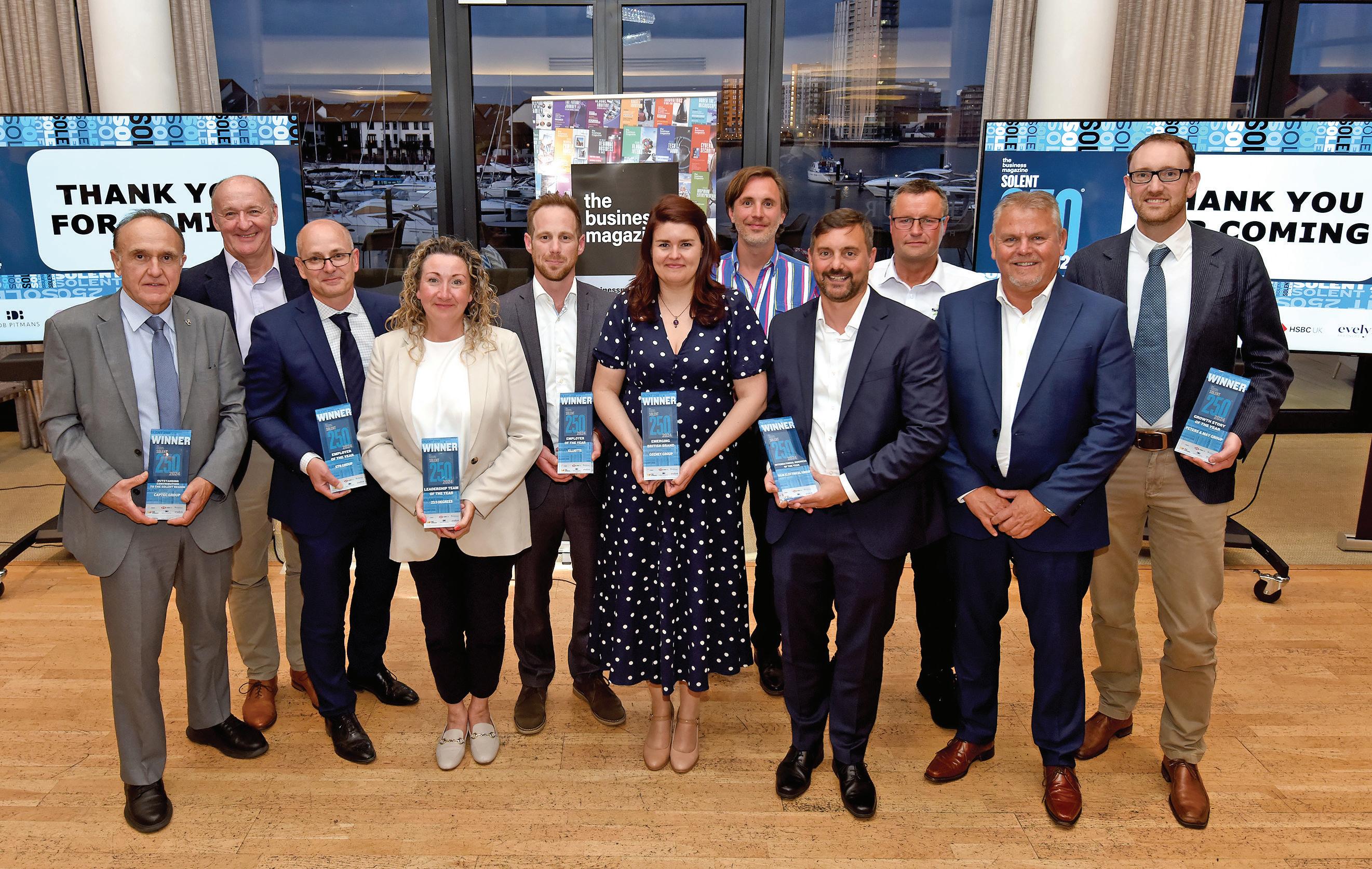
The tenth annual Solent 250 Awards celebrated the achievements of the top privately-owned businesses (by turnover) headquartered in the Solent region.
CEO of The Business Magazine Richard Thompson said: “This year, Solent 250 businesses employed over 51,000 people and contributed significantly to the UK economy.”
The Solent 250 listing is compiled by The Business Magazine and sponsored by BDB Pitmans, CMA Recruitment Group, Evelyn Partners, HSBC UK, University of Southampton Business School and Vail Williams. Richard thanked the sponsors for “their participation and enthusiasm.”
Judging in the International Business of the Year category was so difficult that an additional Emerging British Brand award was added. And the quality of finalists in the Employer of the Year category was so high that joint winners were announced.
An inaugural Outstanding Contribution to the Solent Region Award was given this year. Computing solutions provider Captec scooped the accolade.
The event was held at the Harbour Hotel Southampton and the evening’s guest speaker was Stu Baker, Managing Director of Maritime UK Solent and Executive Director of the Solent Cluster.








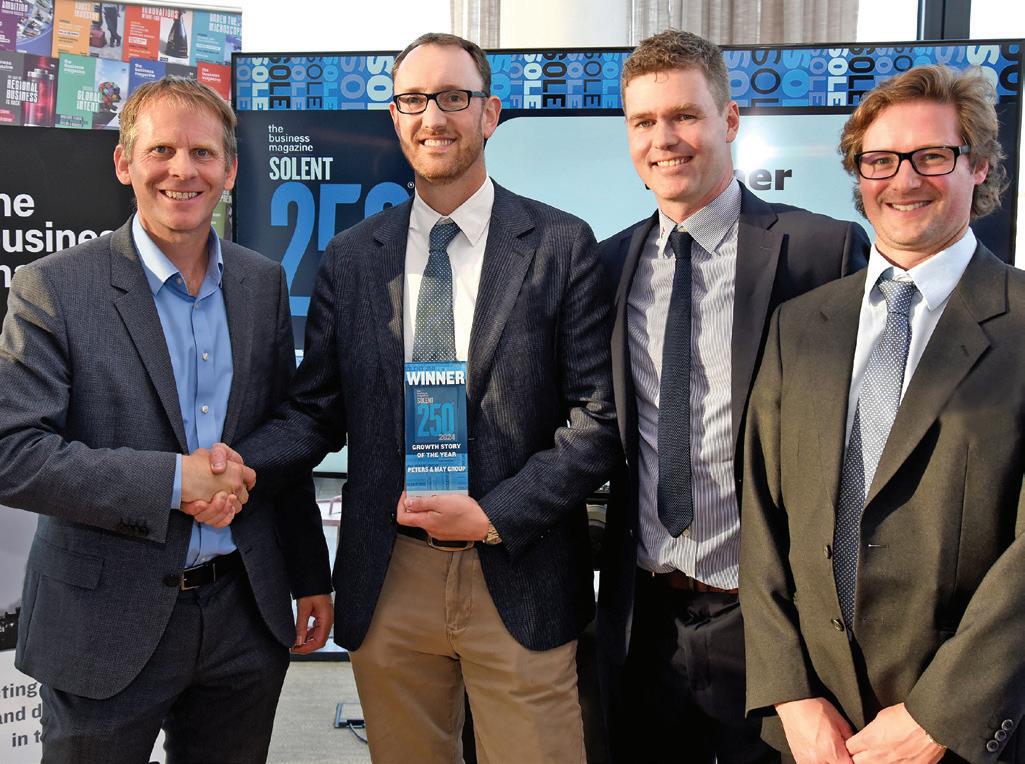
GROWTH STORY OF THE YEAR
Sponsored by CMA Recruitment
WINNER: Peters & May Group
FINALISTS: Amiri Construction • CLC Group PHL (Partnering Health) • C&O Tractors
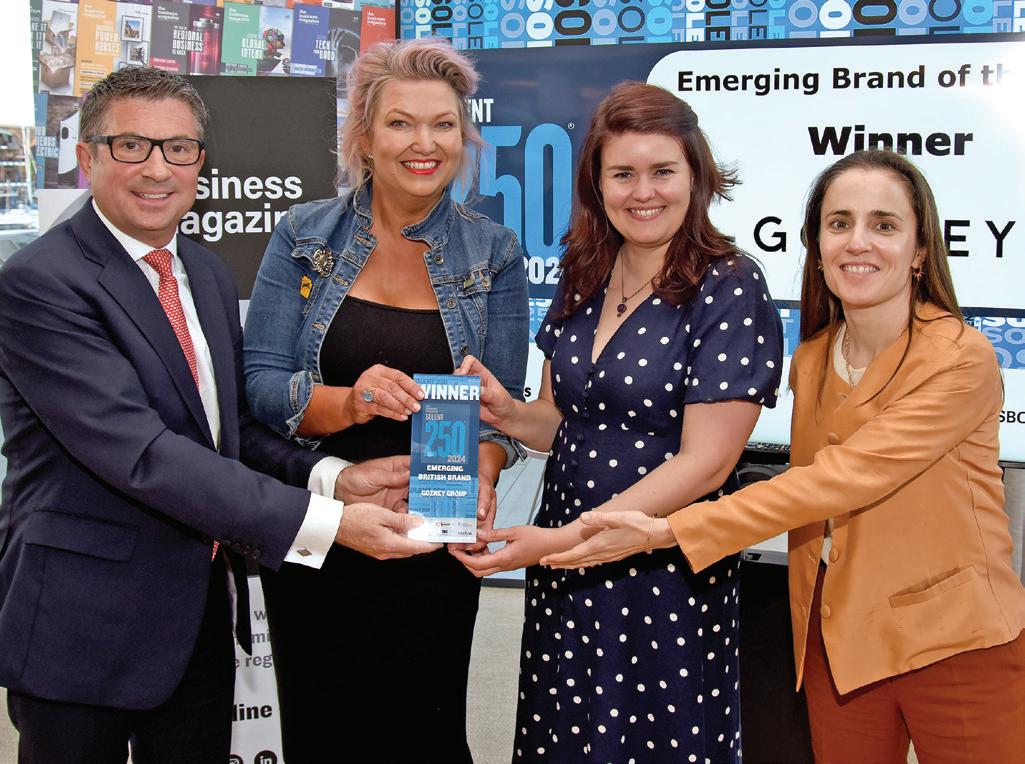
EMERGING BRITISH BRAND OF THE YEAR
Sponsored by HSBC UK
WINNER: Gosney Group
FINALISTS: Captec • Dextra Group • Gozney Group • LeMieux • Platinum Components


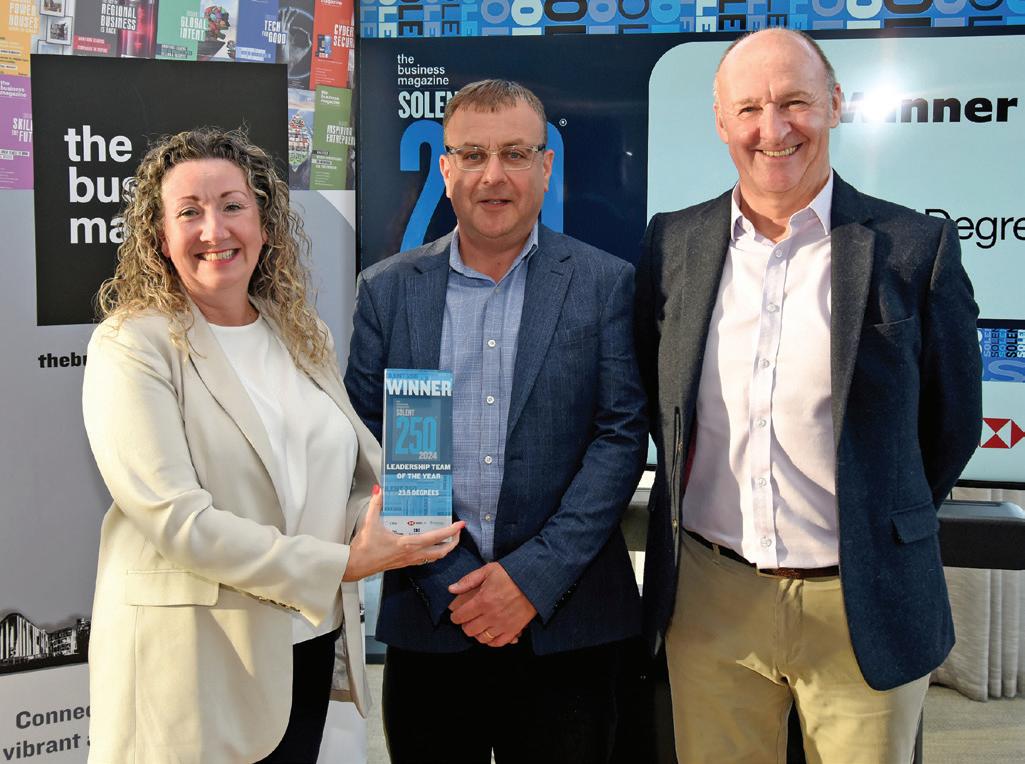
LEADERSHIP TEAM OF THE YEAR
Sponsored by Evelyn Partners
WINNER: 23.5 Degrees
FINALISTS: Barfoots of Botley • Draper Tools Innovation Group • J&B Hopkins




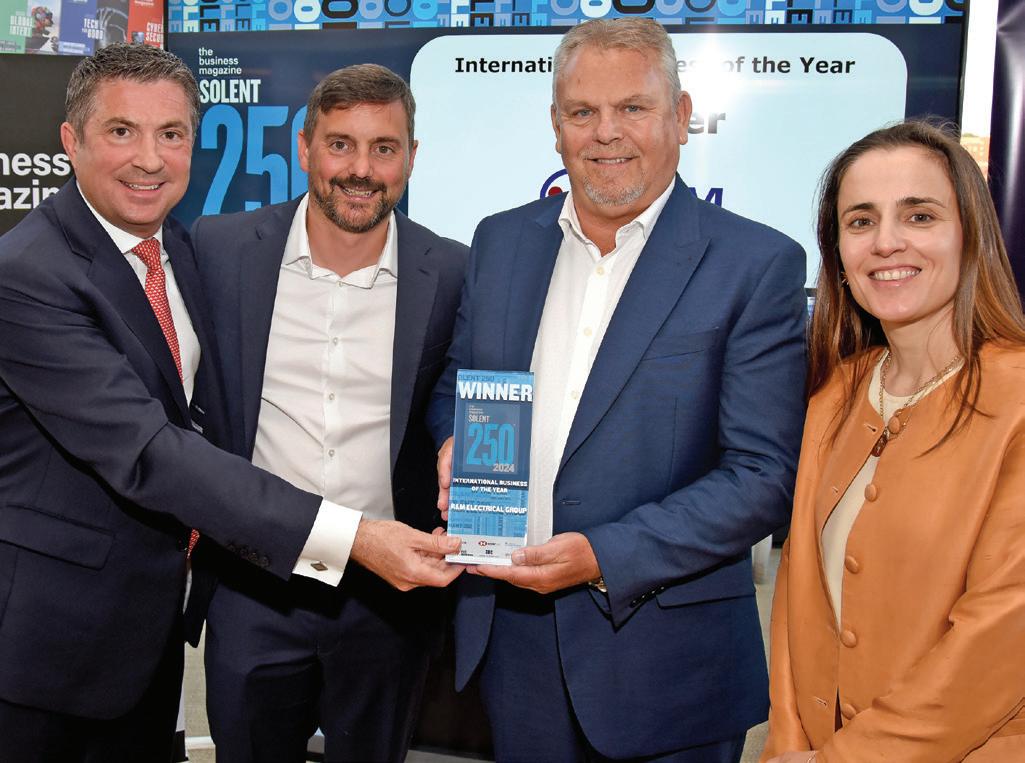
INTERNATIONAL BUSINESS OF THE YEAR
Sponsored by HSBC UK
WINNER: R&M Electrical
FINALISTS: Captec • Dextra Group • Gozney Group • LeMieux • Platinum Components

EMPLOYER OF THE YEAR
Sponsored by the University of Southampton Business School
JOINT WINNER: Elliotts
FINALISTS: Carrington West • Ocean Automotive STR Group • U-Drive



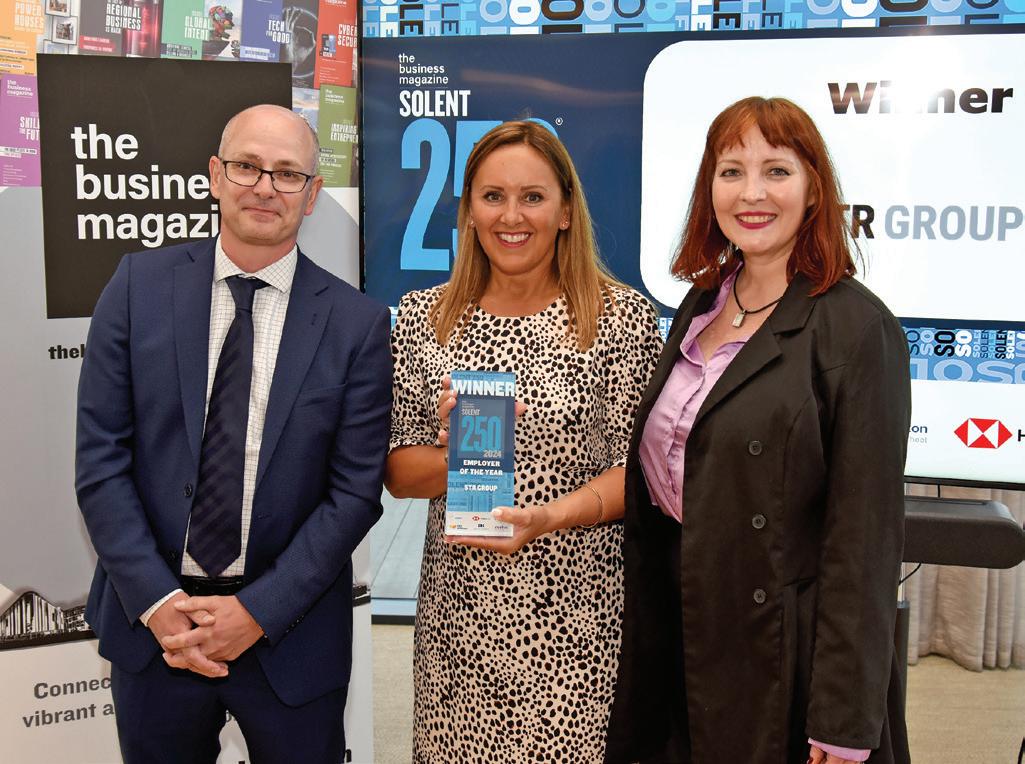
EMPLOYER OF THE YEAR
Sponsored by the University of Southampton Business School
JOINT WINNER: STR Group
FINALISTS: Carrington West • Ocean Automotive STR Group • U-Drive




CLIMATE & SUSTAINABILITY AWARD
Sponsored by Vail Williams
WINNER: Silverlake Automotive Recycling
FINALISTS: Double H • Lionel Hitchen Paultons Park • VES

OUTSTANDING CONTRIBUTION TO THE SOLENT REGION
WINNER: Captec


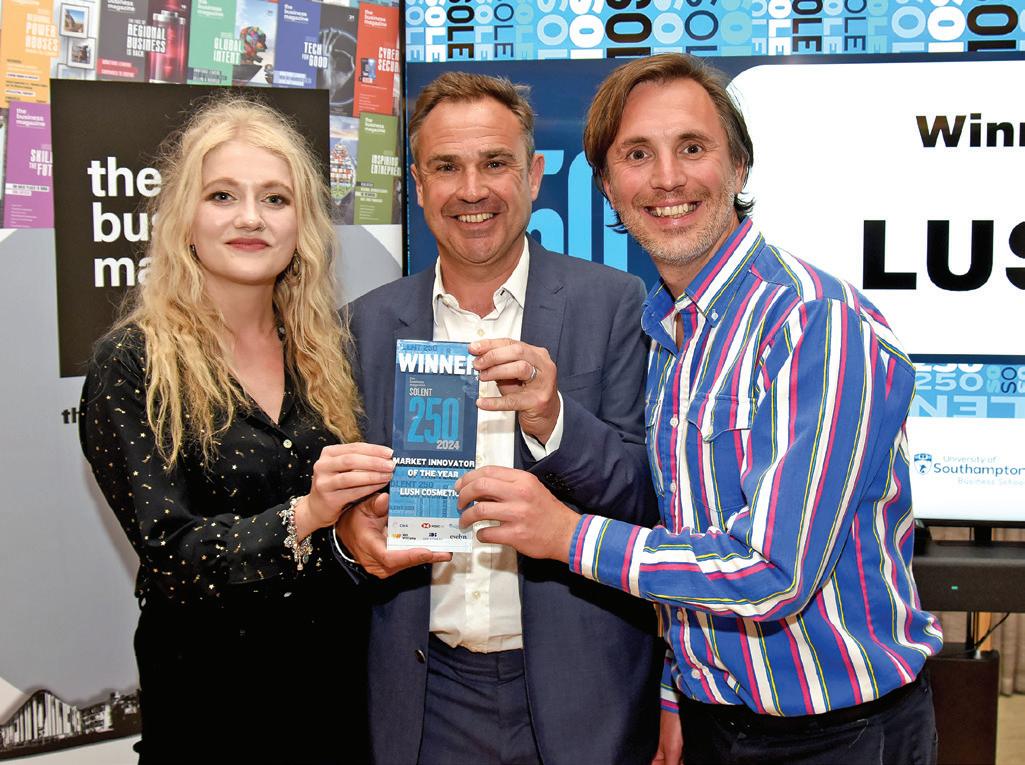
MARKET INNOVATOR OF THE YEAR
Sponsored by BDB Pitmans
WINNER: Lush Cosmetics
FINALISTS: Airsys • Captec • Kortext • Raymond Brown Quarry Products • Williams Shipping

TO READ MORE SCAN THE QR CODE





With its sights set on significant growth, leaders at the full-service national law firm Shakespeare Martineau have established permanent roots in Southampton and the Central South. With a commitment to excellence, sustainability and a client-centred approach, Shakespeare Martineau is poised to make a significant impact on the local legal market and community.
The certified B-Corporation firm, which already has 11 hubs across the South West, London, East and West Midlands, Yorkshire, and Scotland, secured office space at the prestigious University of Southampton Science Park, recognised as the South of England’s innovation hub, in April this year.
This strategic location is not just a new office; it represents the firm’s dedication to fostering innovation and supporting the region’s vibrant business community, as well as posing a perfect opportunity to service existing clients on their doorstep and attract new talent.
Victoria Tester, managing director at Shakespeare Martineau, said: “We work with several clients in Southampton and the Central South region already across a range of our sectors. With Southampton sitting in the UK’s top 10 most populated urban areas, it felt like the next natural move for our on-the-ground presence.
“While many of our peers are shying away or retrenching from bricks and mortar investment in regional spaces, we’re more committed than ever to growing and investing in local expertise and establishing deep roots in new regions.”
Heading the new local office is James Hawkeswood, a leading corporate partner who joined the firm from Blake Morgan, where he was the national head of its corporate practice. With more than 25 years’ experience in corporate law, including mergers and acquisitions (M&A), joint ventures, private equity investments, and complex cross-border transactions, James is the perfect fit to spearhead Shakespeare Martineau’s expansion in the region.
Commenting, James said: “My primary mission is to establish Shakespeare Martineau in the Central South –supporting a significant recruitment drive and raising the profile of the firm locally. I recognise it as a region with huge influence and opportunity – particularly in research, technology, and innovation –making it a great location for Shakespeare Martineau.”
Since announcing the Southampton expansion, Shakespeare Martineau has welcomed a further four legal experts into the fold.
Paula Swain, who joined in May, is a highly-experienced commercial litigator. Formerly the head of Shoosmiths’ Solent office, Paula joined the firm’s debt and asset recovery team as partner, bringing more than 24 years of post-qualification experience to Shakespeare Martineau. Her expertise includes handling disputes around guarantees and indemnities, complex asset recoveries, breach of warranty, and fraud claims.
Embedded in the community, Paula is on the board of the Solent Freeport and a visiting fellow at Solent University’s law school.
She said: “The calibre of Shakespeare Martineau’s debt and asset recovery team was already very well known to me. I love nurturing positive relationships with colleagues and clients, and I am looking forward to bringing my energy, passion, and experience to the team.”
Banking and finance expert Jake Holmes also joined as partner in June. After spending more than a decade at Blake Morgan, Jake is highly regarded for his work in acquisition, real estate, and development finance. He regularly advises banks, corporate and individual investors, as well as other institutional lenders and borrowers across various sectors, including leisure, healthcare, and education.
Jake is eager to contribute to the firm’s growth, saying: “I am delighted to have joined Shakespeare Martineau and be based in our newly-established Southampton hub. Having worked in the Solent region for the majority of my career, I know what fantastic businesses there are in this area and what a terrific opportunity there is to work alongside these businesses as their strategic legal advisors.”
Paula and Jake have been joined in the Southampton hub by team supervisor Ray Welsby, who was previously at Shoosmiths, and solicitor Lauren Green, who joined the firm from Blake Morgan.


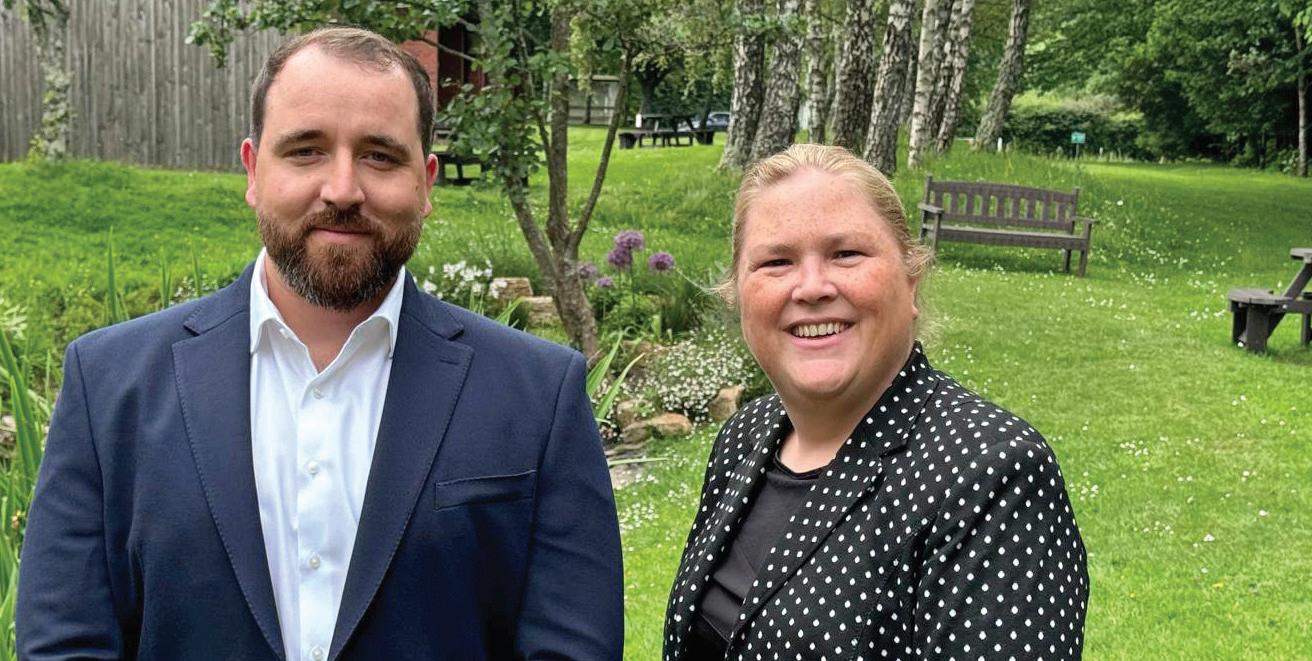
As part of Ampa, Shakespeare Martineau has been awarded B-Corporation certification, which means it is legally required to consider the impact of business decisions on its people, customers, suppliers, communities and the environment.
The rigorous auditing process for B-Corporation certification ensures that only businesses with the highest standards of social and environmental performance are recognised.
James said: “It is absolutely possible for a business to be both purposeful and profitable – it’s not about ‘balance’ but about doing what’s right and knowing that this is not just the morally astute approach, but a commercial one too, as more and more of our clients are also looking for responsible suppliers and partners for their businesses.”
It is not just clients and referrers who can identify positively with the B-Corporation message. Together with the firm’s approach to empowered working, it also resonates strongly with those looking to work within an ambitious firm – a point of difference that will come in handy, as the
firm is looking to reach a double-figure headcount in Southampton by the end of the financial year.
This may sound like a significant undertaking, but as James notes, the firm has a strong track record for growing teams from ground zero in new geographies; something evidenced by its recent successful expansions in Edinburgh, Lincoln and Sheffield.
James said: “Aside from having a strong bank of ‘lessons learned’ from previous office openings, the key is the firm’s ability to marry up a passionate regional focus with the depth and calibre of expertise we have across the country.
“With more than 1,200 legal and business experts, our clients are able to call upon niche specialisms and the strength in depth a firm our size can offer, while knowing that their key contacts are committed to the growth and success of their local region.”
Shakespeare Martineau’s expansion into Southampton is more than just a strategic move; it’s a commitment to excellence, innovation, and the local community. With a team of top-tier professionals and a clear vision for the future, Shakespeare Martineau is set to become a cornerstone of the legal landscape in the Central South.

Farnborough firm AALTO has secured a £78 million investment from a consortium of Japanese businesses and banks.
AALTO manufactures and operates the world record-breaking Zephyr High Altitude Platform Station (HAPS), which can fly continuously for months at a time.
Flying above 60,000 ft, Zephyr operates in the stratosphere, above weather and conventional air traffic. It remains the only fixed-wing HAPS to have demonstrated day and night longevity in the stratosphere.
The solar-powered Zephyr station offers
both mobile connectivity and earth observation services.
It also makes use of Airbus’s earth observation service, Strat-Observer, to monitor, track and sense detection applications – which could prove useful in Japan’s response to natural disasters.
The investment marks the beginning of an alliance to commercialise connectivity and earth observation services using HAPS in Japan (where AALTO aims to launch in 2026) and across Asia.
Leading the consortium are Japanese
The route between Portsmouth and Ryde may be served by all-electric ships and a new port on the island if plans put forward by Wight Gateway get the go-ahead.
As reported by the BBC, WGL intends to use land it owns west of Ryde to build the new port, with hopes to win National Significant Infrastructure Project status from the government which would allow the planning permission to be fast-tracked.
On the mainland, Portsmouth City Council has agreed to draft terms on a mainland berth at Portsmouth Port to allow discussions to progress.
WGL is fronted by former army colonel and ex-chairman of Isle of Wight NHS Trust, Danny Fisher.
Both Wightlink and Red Funnel have previously said that the national grid cannot supply enough power to run electric ferries on the Solent.
telecoms company NTT DOCOMO and Space Compass, together with Mizuho Bank Limited and the Development Bank of Japan Inc.
Airbus Defence and Space will remain AALTO’s majority shareholder. The investment is subject to regulatory approvals.
Samer Halawi, CEO of AALTO, said: “This is a landmark investment for AALTO. It’s the natural next step in the roadmap of the company’s targeted entry-intoservice in 2026, as we industrialise and commercialise our technology.”
Hampshire County Council has inaugurated Cllr Nick Adams-King as the new leader of the council – with Cllr Jan Warwick as deputy leader and Cllr Keith Mans as chairman. Nick takes over from Cllr Rob Humby.
Nick has been councillor for Romsey Rural since 2021, and a member of the county council’s cabinet since 2022.
A chartered surveyor by profession, Nick’s career has also spanned the property and hospitality sectors.
He was first elected as a Bournemouth Borough councillor in 2005, a Test Valley Borough councillor in 2015, and then the borough council’s deputy leader from 2017 until earlier this year.

DP World is lifting rail freight targets from Southampton
Logistics company DP World is lifting its target for the amount of freight carried by rail from the port city of Southampton to 40 per cent in 2026 following the success of its modal shift programme.
The trial, which has been extended until the end of next year, offers customers a financial incentive to move their imported goods off the road and on to rail.
The share of rail freight at Southampton has reached 30 per cent since the programme launched last September, up from 21 per cent.
This has led to four new daily rail services at the Southampton terminal, taking the total number of weekly scheduled trains at Southampton to 172.
The firm said it has already contributed to DP World’s goal to take an estimated 300,000 truck journeys off UK roads each year and saved customers and supply chain partners around an incremental 6,400 tonnes of carbon dioxide in the first six months.
Paris Smith has selected Hampshire and Isle of Wight Air Ambulance as its charity of the year for 2024-5, kicking off the partnership with a ‘Dash in the Dark’ this September.
The Southampton-based law firm has been confirmed as headline sponsor for the annual event, a 5km fun run on Southampton Common which over the years has raised more than £100,000 for the air ambulance.
Charlotte Farrell and Tabytha Cunningham, co-chairs of the charity committee at Paris Smith, said: “By supporting this vital emergency service as our charity of the year, Paris Smith aims not only to contribute financially and make a meaningful impact on the lives of those in need of emergency critical care, but also to raise awareness about the crucial importance of the air ambulance service within our local community.

“The Dash in the Dark event is a unique and fun way to highlight the work the service does and raise vital funds to keep the air ambulance flying and saving lives.”
Hampshire and Isle of Wight Air Ambulance has responded to 18,000 missions since
its first flight in 2007 and 901 missions since the start of the year – a year-on-year increase of more than 20 per cent.
On average, each mission costs the charity £3,500, and their daily running costs are £17,750.

The Hampshire Business Awards will return for a second year following a highly successful first event which celebrated business success in the region.
The Business Magazine, supported by Hampshire County Council and headline sponsor Farnborough Airport, will be hosting the event at Farnborough International Exhibition & Conference Centre on November 21.
The showpiece event will be attended by entrepreneurs, business leaders, venture
capitalists and policymakers.
Chief Executive Officer of The Business Magazine, Richard Thompson, said: “We are delighted to return with the Hampshire Business Awards for a second year and were blown away by the response to the inaugural event last year.
“For an awards in its first year, it attracted 262 nominations and was attended by nearly 500 people on the night which was beyond all of our expectations.”
Nominations are open, with a closing date set for September 15.
Sponsors of the awards include Farnborough Airport as headline sponsor alongside aerospace company Gulfstream, accountancy firm Menzies, legal firm Herrington Carmichael, Southampton port operator AB Ports, Milestone Infrastructure, industrial training specialist Noble Holdings and housebuilder Barratt Developments.
Southampton-based RAD Propulsion, which makes electric motors for boats, has raised more than £4 million to drive business growth, smashing its initial target of £2.5 million.
The funding round was led by One Planet Capital, Ocean Infinity, The FSE Group and High Growth Robotics, supported by Blake Morgan LLP, FAIR Advisers Ltd as well as existing investors.
RAD was founded in 2018 by Rich Daltry
and Dan Hook. They had previously built some of the world’s most advanced marine robot boats for the offshore industry, defence and oceanographic sectors.
The company is behind the RAD 40 product, a 60hp equivalent electric drive system, which has customers in the US, Norway, Finland, Germany, Spain, UK and the Netherlands.
The funds will ramp up the tech firm’s scale as its RAD 40 goes into mass production.
The company says demand is growing in what is a $12 billion maritime market. Dan co-founder and CEO, said: “The requirement for electric propulsion in the marine world is happening now as customers transition away from their reliance on fossil fuels.
“RAD’s unique, tech-focused approach ideally positions us to deliver boat builders, commercial operators and high-end leisure users the solutions they need to reduce their carbon footprint.”



Bramble Energy, a Crawley firm focused on hydrogen fuel cell technology, is aiming to accelerate the UK’s transition to an electrified automotive industry.
In 2022, the company was awarded £1.8 million by the Advanced Propulsion Centre (APC), a non-profit investor in cleantech innovations, to improve the assembly of fuel cell stacks – towers of individual cells which generate electricity from chemical reactions.
Since then, it’s successfully developed a system to manufacture up to 2,000 50 kW stacks a year at the low cost of $100 per kW, accelerating the production of custom fuel cells from over a year to just 30 days.
The assembly makes use of Bramble Energy’s trademarked printed circuit board fuel cell, PCB-X, which can be customised for various clean energy applications.
This latest project follows the company’s contribution last year to the APC-led Hydrogen Electric Integrated Drivetrain Initiative (HEIDI), which saw it provide fuel cell technology for a new hydrogenpowered double-decker bus.
Dr Tom Mason, CEO of Bramble Energy, said: “In our efforts to help the automotive and public transport industries find a clean, reliable and cost-effective way of powering vehicles, these projects have
helped us deliver internal efficiency development, refine our build process and create more flexibility with our design.
“The government’s aim to halt new petrol and diesel car sales by 2035 influences our plans. However, it’s just part of a larger vision.
“Our focus extends beyond this goal as we work towards creating real-world, commercially viable solutions for the wider transportation sector.”
Automotive fuel cells have lowered in cost by 70 per cent since 2008 as the industry develops more efficient and scalable production processes.

A combined tennis and padel facility is coming to the new Hove Beach Park, part of a project to regenerate the seafront of West Hove.
Thought to have originated in Mexico in the 1960s, the game of padel shares the scoring system of tennis and uses similar balls, but the racquets and courts are
different, with players able to bounce the ball off walls – as in squash.
It’s quickly gaining in popularity and now Brighton & Hove City Council has chosen national padel operator Game4Padel to run new courts on the beachfront.
Also featuring bowls, croquet and a new skatepark, Hove Beach Park will stretch from Hove Lagoon to the King Alfred Leisure Centre.
It’s been predominantly funded through the government’s levelling up fund and is expected to be completed towards the end of this year, with the courts opening in the summer.
Game4Padel will be responsible for the site’s six tennis and four padel courts, facilitating bookings, running coaching and ensuring the facilities are well used by building a thriving racket sport community in the area.
The company has been operating an uncovered popup padel court at nearby Withdean Sports Complex since October 2022, and has received planning permission from the council to install a permanent three-court covered floodlit facility there this summer.
Game4Padel hopes to host social events and tournaments across both Brighton sites once they’re up and running.
This year’s forum asked ‘What does the consumer want?

Headline speakers at this year’s Kent Future Food Forum, hosted by trade organisation Produced in Kent, gave a damning indictment on the state of the current food system and the proliferation of ultra-processed foods (UPFs).
The annual event took place at the University of Kent Business School in Canterbury and brought together independent food and drink businesses, sector specialists and representatives from industry and local government.
Among the keynote speakers for the forum – titled ‘What does the consumer want?’ – was Kimberley Wilson, a psychologist, nutritionist and bestselling author.
Kimberley raised concerns that poor
nutrition from UPFs is fuelling a mental health and obesity crisis, calling for a legislative body free from the influence of big corporations.
She was joined by Sheila Dillon, food journalist and presenter of BBC Radio 4’s The Food Programme, who added that the current food system is leading to a health and environmental disaster.
She called out the misleading traffic light system that allowed a UPF snack bar to be given green lights across the board, while a pack of almonds was all red.
David Edwards, deputy chair of the Food Farming Countryside Commission, urged a grassroots approach to inclusive and sustainable food policies.
And Tessa Stuart, managing director of consumer research firm Asset Research, agreed that UK customers are too used to cheap food, leading more people to choose UPFs over fresh produce.
Susie Warran-Smith, CEO of Produced in Kent, said: “We’ve reached a critical crossroads in the food sector, and we absolutely need to be having these conversations.
“This is where organisations like ours, representing the local independent food and drink sector, can help to drive change.
“Our members hold the key to a better future for food in this country as consumers seek transparency and demand better quality food.”

Siemens Healthineers is building a new £250 million facility in North Oxfordshire that will design and manufacture superconducting magnets used in healthcare facilities for MRI patient scans across the world.
The site will be home to novel technology that minimises the use of helium, making scanners lighter, easier to install and more sustainable. Construction has begun on the 56,000 sq m site, which will support more than 1,300 skilled jobs.
It will be the UK’s first major production site for the new so-called DryCool technology by Siemens Healthineers, which reduces the amount of helium required in an MRI scanner from 1,500 litres to under a single litre. The new facility will be operationally carbon-neutral.
Siemens Healthineers will provide vital additional capacity to help satisfy rising global demand for MRI products as populations age and chronic diseases become more prevalent.
As one of six current and planned Siemens Healthineers manufacturing sites in the UK, the new site will retain more than 600 Oxfordshire-based jobs currently at the existing Siemens Healthineers facility in Eynsham, as well as adding new roles.
“As a world leader in medical imaging, we are very proud to open the next chapter of our history in Oxford,” said Bernd Montag, chief executive of Siemens Healthineers. “This factory will be the global centre for our innovative low-helium magnet technology, meaning we consume far less of a scarce natural resource and enable access to MRIs for many more patients.”
University of Oxford spin-out and OrganOx has opened a new 18,000 sq ft global headquarters for research, development and production in Oxford.
OrganOx, founded in 2008, has developed its lead product called the metra which preserves donor livers at body temperature by circulating oxygenated blood and nutrients through them.
It was launched in Europe in 2018 and the US in 2022 and has quickly gained market adoption.
Craig Marshall, CEO of OrganOx, said: “Our new facility opening is a major milestone, providing OrganOx stakeholders access to world-class facilities and technologies as we work together in ways that were simply not possible previously. We are proud to be a growing member of the Oxford
business and scientific community.”
Professor Peter Friend, chief medical officer and co-founder of OrganOx, added: “We continue to push the scientific and clinical boundaries with technology designed to improve the lives of patients experiencing acute or chronic organ failure. This remarkable new facility will support us in that mission for many years to come.”
Open Cosmos, which designs, builds and operates space missions, has secured a €60 million contract to deploy an earth observation constellation of seven satellites supplying daily high-resolution imagery to the Greek government.
The Oxfordshire firm will collaborate with the European Space Agency on the project for the benefit of both Greek and European citizens.
It’s hoped the ‘OpenConstellation’ – set to be the largest shared infrastructure in space – will help improve public services such as the land registry, combat sea pollution, co-ordinate disaster response and boost agricultural efficiency.
Rafel Jorda Siquier, founder and CEO of Open Cosmos, said: “We faced competition from some of the world’s leading players in the industry, and to win is a true testament to the hard work of everyone at Open Cosmos and the strength of our advanced satellite technology.
“Delivering this contract will position us at the forefront of satellite data providers, opening up further collaborations and growing the OpenConstellation.”
The programme will complement existing European Space Agency systems such as EU Copernicus, while being fully compatible with the Atlantic constellation.
Dimitris Papastergiou, Greek minister for digital governance, added: “Greece is making significant steps in space.
“By investing in both capacity-buying and capacity-building space programmes, our aim is to stimulate local high-tech space industries, foster job creation, retain our skilled engineers and space experts in the country and attract additional talent.
“The development of cutting-edge satellite technology will cultivate a sustainable economic framework that integrates advanced science and technology sectors, bolstering long-term economic resilience in the country.”

Sky Wave Distilling Company has been named Distillery of the Year 2024 in this year’s Gin Guide Awards.
The distillery, based at Bicester Motion in Oxfordshire, also picked up medals for four of its seven gins, with another highly commended – and the winning medal for design and branding thanks to its recent investment in a bespoke new British-made bottle.
Andrew Parsons, co-founder and master distiller of Sky Wave, said: “Hundreds of distilleries from more than 35 countries entered, so we’re thrilled, proud and humbled to have been selected as Distillery of the Year.”
Sky Wave was launched by adventureloving founders Rachel and Andrew’s pursuit of the perfect gin.
Their global adventures took them to across the world, and throughout their travels they always sought out their favourite spirit – gin, but never managed to find one they really loved. So they decided to do it themselves.
Sky Wave gins combine quality produce, with globally sourced premium botanicals.
Oxfordshire growers provide rhubarb and apples, while village hedgerows are foraged for blackberries.
Natural mineral water from Oxfordshire’s historic Blenheim Palace is used in every blend.
Madagascan vanilla pods, Moroccan coriander and ginger from across Asia add to the gin’s international flavour.
Oxford North, the city’s new innovation district, has partnered with Matchable to get more businesses in the county involved in volunteering.
Matchable is a digital platform which matches companies and their teams with charities, social enterprises and start-up volunteering projects.
Launched in 2019, it works in 15 countries with local partners to drive corporate volunteering activity, and has now extended its reach to Oxfordshire.
The team has identified around 30 organisations in Oxfordshire for Matchable to approach and introduce the parties.
Members of the client, consultant and construction partner teams for Oxford North will have their skills sets and interests matched with different charities to maximise the value of volunteering days.

The Oxfordshire business community turned out in their hundreds for the 2024 Oxfordshire Business Awards
Since the Oxfordshire Business Awards began in 1994, they continue to have a positive impact on the county’s business community, and show the diverse talent, entrepreneurialism and drive for excellence across the county. The Awards were held at The John Henry Brookes Building, at Oxford Brookes University.
THE OXFORDSHIRE LEP NEW BUSINESS AWARD
WINNER: Wild Bioscience
Designing crops to take on the world’s biggest challenges
THE GREATEST HITS RADIO CHARITY & COMMUNITY AWARD
WINNER: Sobell House
Providing specialist palliative care and support to adult patients and their family, friends and carer

THE METRO BANK SME OF THE YEAR AWARD
WINNER: High Spec Composites Manufacturer of aluminium tooling and high-spec carbon fibre components
THE CHERRY PICKED RESIDENTIAL PROPERTY DEVELOPER OF THE YEAR AWARD
WINNER: Tsoy
Unlocking value from derelict sites to deliver new homes and community spaces
Philip was awarded an OBE for services to business and innovation in 2015. 1 2 3 4 5 6
THE OXFORD TRUST & OXFORDSHIRE BUSINESS FIRST EMERGING TECH BUSINESS AWARD
WINNER: Wild Bioscience
THE JAMES COWPER KRESTON BUSINESS PERSON OF THE YEAR AWARD
WINNER: Philip Shadbolt OBE, EZ-Charge
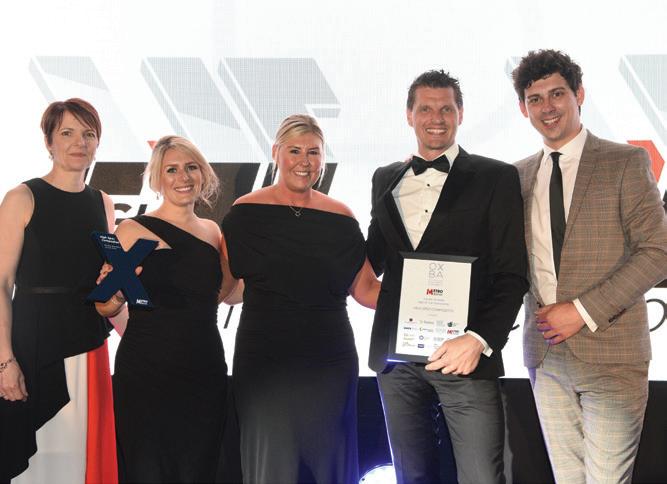
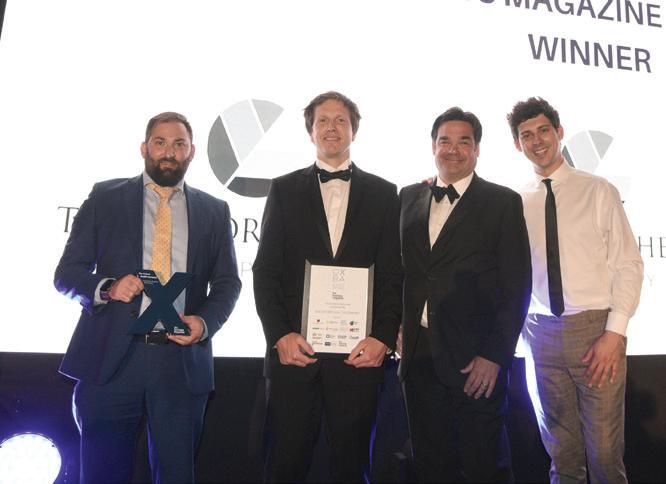
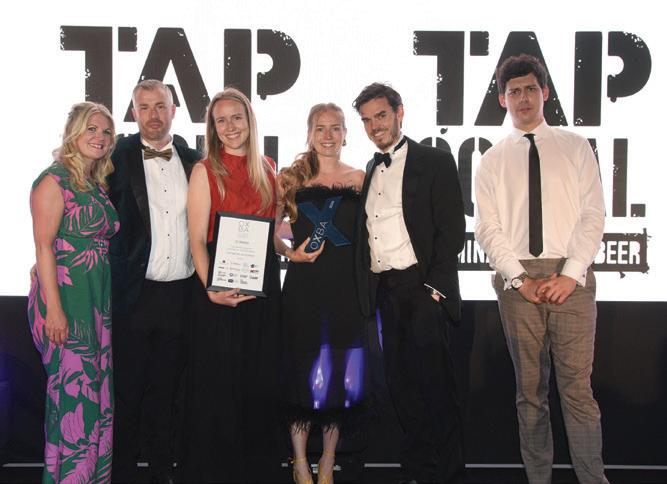
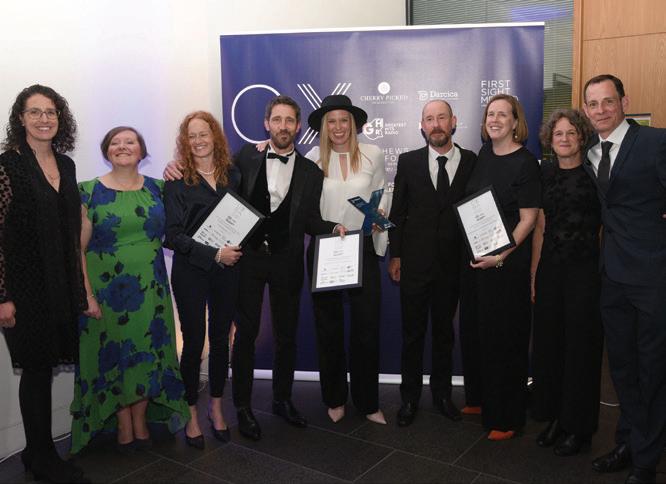
THE BUSINESS MAGAZINE GREEN AWARD
WINNER: The Oxford Health Company
One of the leading independent dietary supplement brands manufactured in the UK
THE HAYS EMPLOYER OF THE YEAR AWARD
WINNER: Audley Travel Tailor-made travel
THE OXFORD SCIENCE PARK INNOVATION AWARD





THE FIRST SIGHT MEDIA TECHNOLOGY EXCELLENCE AWARD
WINNER: GHM Communications Business telephone systems, WiFi and IT Support
THE RWK GOODMAN LARGE BUSINESS AWARD
WINNER: The Oxford Health Company
THE DARCICA LOGISTICS BUSINESS OF THE YEAR AWARD
THE MATHEWS COMFORT YOUNG BUSINESS PERSON OF THE YEAR AWARD
WINNER: Amy Taylor, Tap Social Movement Social enterprise that creates community hospitality venues to help turn lives around for prisoners and prison leavers through direct employment and advocacy
THE OXFORD BROOKES BUSINESS SCHOOL PURPOSEFUL BUSINESS AWARD
WINNER: High Spec Composites
WINNER: The Project PT Personalised support to unlock the potential in every young person. 7 8 9 10 11 12 13 14
WINNER: Tap Social Movement
He’s done pretty much every job in the motorsport handbook, but David Richards, CBE, isn’t putting the brakes on yet
by Nicky Godding, Editor
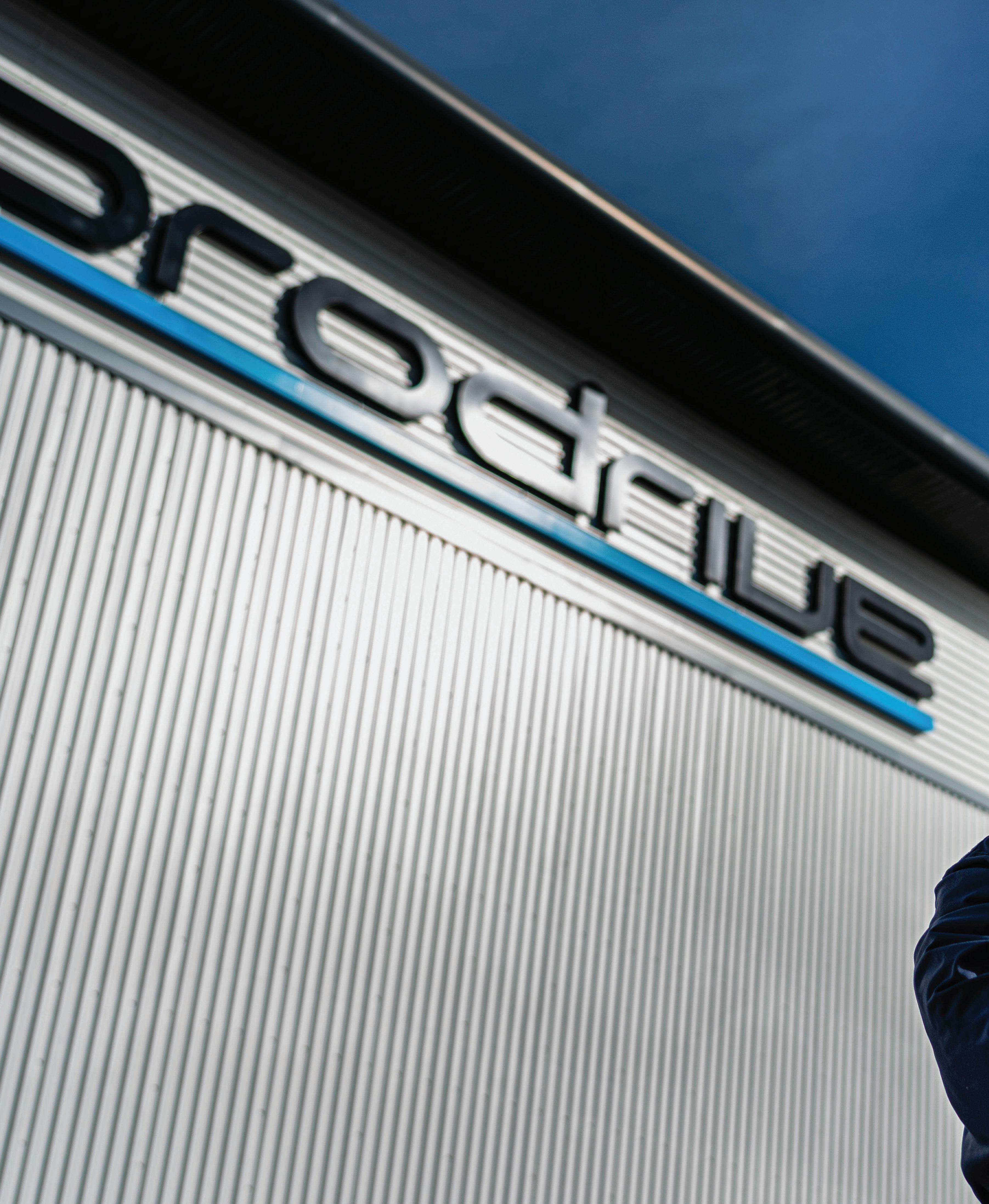
David Richards, CBE, has one of the longest and most successful careers in the automotive industry – in the driving seat and out of it.
But mention the word retirement (he’s 72), and a wry smile lights up his face.
“I’ve certainly got no intention of retiring in the short term. Now is my opportunity to put all my experience and years in the sport to good use. I’d like to help channel things for the future so my grandchildren’s generation can enjoy all the opportunities that I’ve had.”
Since the 1980s, those opportunities have enabled him to win a world rally championship, chair Aston Martin Lagonda, become team principal of Formula 1 teams BAR and Benetton, found motorsport and advanced engineering
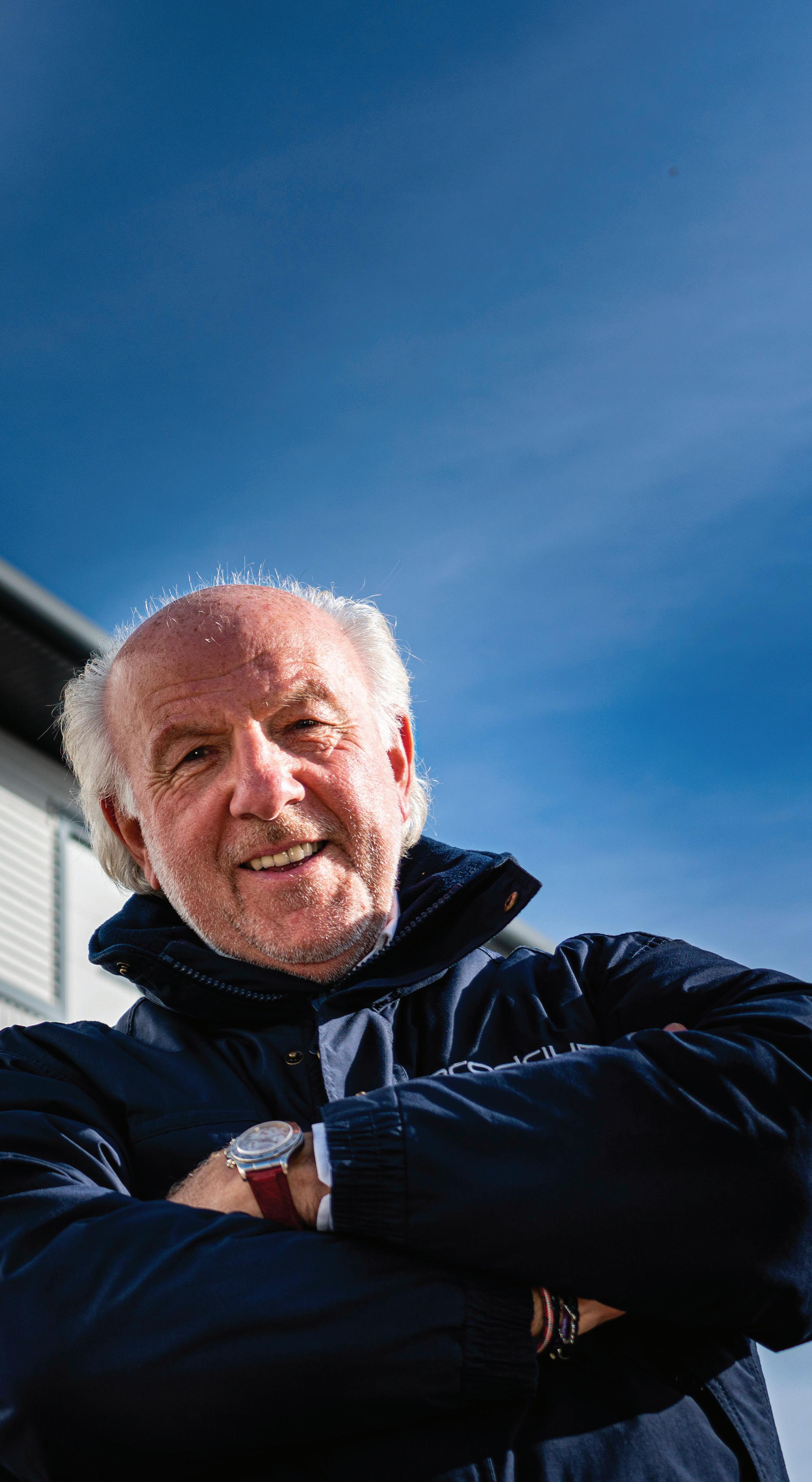
company Prodrive (which now has an annual turnover of around £120 million and employs around 600 people from its Banbury headquarters), take on the Chairmanship of Motorsport UK and become a trustee of the FIA’s charitable foundation. Oh – and receive a CBE for services to motorsport.
What is there left to achieve?
Lots, he says.
“One of the key things I still want to do is to look at the sustainability of motorsport in the long term. How we make it more environmentally-friendly through the further development of technology and sustainable fuels.
“Over the last couple of decades Formula 1 has become more of an entertainment sport, and that’s all very well, but the technology developed by motor sports engineers is already helping to significantly lessen the negative environmental impact of cars. In a couple of years, a new engine will be launched which will be lighter and with an electrical hybrid system which will make it probably the most efficient internal combustion engine in the world.”
From 2026, the FIA, motor sport’s governing body, has indicated that all competing cars’ engines must have an almost 50/50 split between internal combustion engine and electrical power. New chassis rules will also see the cars being made between 40-50kg lighter.
David continued: “We can’t get away from the fact that we will have to use fossil fuels for some time to come, but by making engines more efficient, and by applying motor sport engineering to road cars as well, we can dramatically reduce emissions.
“The teams competing in Formula 1 are leading the way in motor sport’s net zero debate, because they want to –and have to.
“There is a commercial imperative, because teams won’t get sponsors unless they can show their environmental credentials. It’s become a fact of life.”
Let’s reverse a bit and meet David Richards at the start of his career.
He grew up on a small farm near Ruthin, North Wales.
“My father wasn’t a motorsport enthusiast per se, but he did like cars, and I drove tractors, farm vehicles and motorbikes around the farm at a very early age.”
After school, he trained as an accountant, but not very enthusiastically. “Motorsport was my escape at the weekends, and I really threw myself into it.”
Diagnosed with dyslexia, long considered a drawback for many, proved the opposite for David when he was rallying. “I can picture a map immediately and have a very good sense of direction. I’m sure that was down to dyslexia, and it stood me in very good stead in those early days.”
He spent eight years as a professional rally co-driver, culminating in becoming British and Scandinavian champion and winning the World Rally Championship as co-driver to Ari Vatanen in 1981.
Having achieved his ambition, he stepped out of the car and into the business world. In 1983 he established his own motor racing team and launched Prodrive in Banbury, where he is now Chairman.
Prodrive, now a multi-million-pound business, has gone on to win dozens of international motorsport titles and grown into a world-leading independent motorsport company which designs and manufactures a wide range of technology across the mobility sector (not only in motor sport). It has a composites factory in Milton Keynes which manufactures for leading original equipment manufacturers and where its designers are driving the development of recyclable and natural fibre composites.
Since 2004, Aston Martin has fully outsourced its racing programme to Prodrive which has helped the luxury car marque establish itself as one of the leading manufacturers in global sports car racing by winning numerous Le Mans and world sports car championship titles.

And Prodrive supplies race cars to customers across the globe, alongside a full support services programme.
“Any weekend they’ll be dozens of cars we’ve built competing on tracks around the world, from the World Rally Championships, Dakar Rally, the Peking to Paris challenge and Formula One, often with our own engineers supporting them.”
Everyone in motorsport, and in fact in many other areas of engineering, knows and respects David Richards and Prodrive’s engineering expertise and prowess.
The Group also has a merchandising business which produces branded clothing and accessories for major brands. But as you would expect from any company within the Prodrive group, Brand& doesn’t just design and sell shirts. it experiments with new clothing materials to find which best suit the sport for which they’re designed.
“We supply many football clubs, made for teams in last year’s Rugby World Cup and are doing some projects for the Olympics in Paris this year,” said David.
“Whatever we do, our whole culture is based around motor sport, and that means excellence, in engineering and anything else we get involved with.”
So much so that some of the world’s biggest automotive manufacturers turn to Prodrive for concept and product
development rather than undertaking some research and development themselves.
And there’s Prodrive’s Ventures which looks at any engineering opportunity, and the company’s restoration work on old race and rally cars, including its iconic Subaru P25s.
The Group’s advanced technology group is working on a number of projects including a last mile electric truck and a concept for an aeroengine manufacturer.
But instead of me listing everything the company does, imagine the most sophisticated shed at the bottom of the garden packed with some of the world’s cleverest motor sport engineers who’ve been told by the boss to “think outside the box”, and there you have Prodrive – willing to take on any challenge and suggest many of its own.
How does the company continue to be so entrepreneurial after 20 years? “I like the less orthodox approach to solving problems. We have a couple of hotels in Cornwall and when we’re employing people there my mantra to the team is employ on personality and train for the rest – which you can do in that industry. We can’t do that at Prodrive obviously, but that’s the way we think.”
With all this technical prowess though, Prodrive is still relatively unknown to the consumer at large. So, for the last few years it’s been branching out with a few products
to put itself in the public eye. It’s developed what it claims is the lightest weight folding bike in the world and developed a racing simulator.
“That came about from a conversation I had with my wife who said that they were very ugly things and she’d never have one in the house. So, we have designed the most beautiful racing simulator we can. Now we’re moving into travel luggage.”
Will my battered old Samsonite soon be overtaken by a turbo-charged Prodrive suitcase at Heathrow?
“The world only progresses through imagination and creativity, but such achievements aren’t possible by individuals alone,” said David. “At Prodrive, as a body of people, we’ve managed to do things that most would find extraordinary.”
There is one job, though, that David hasn’t yet done, and that’s President of FIA –motorsport’s global governing body.
“I’m too old to do that and also a little bit too unconventional for that sort of role,” he says. But as chair of the FIA’s charitable foundation, he is working with the United Nations on global road safety.
“In some parts of the world, too many children still get killed in road traffic accidents. We want to change that.”
David Richards admits to being a “bit of a free spirit” which is why he’s so valuable to UK engineering. He doesn’t accept conventional opinion but looks at problems more broadly.
“Science will get us out of many of the problems the world faces, so let’s invest in science, let’s invest in schools where science subjects should be more dominant.”
As our interview wraps up, David says he’s off to Motorsport UK headquarters at Bicester where he’s meeting some people to work on solving another problem –making racing circuits safer.
Can a sport be faster, more exciting and safer? That’s another conundrum that David’s determined to tackle next. I’m not sure about the turbo-charged suitcases though.

BARRATT IS COMMITTED TO INSPIRING CHILDREN AND YOUNG PEOPLE TO EXPLORE SKILLS DEVELOPMENT AND CAREER OPPORTUNITIES. NOW A PARTNERSHIP WITH JAMES PETERS, A SUCCESSFUL MOTIVATIONAL SPEAKER AND MEMBER OF THE TEAM GB SAILING TEAM, IS SET TO INJECT NEW ENERGY INTO ITS EDUCATIONAL OUTREACH PROGRAMME.
RAs the nation gears up for the Paris 2024 ummer Olympics, no-one could be more excited than James Peters. Nominated for BBC Young Sports Personality of the Year in 2008, progress looked likely to come quickly for the virtuoso sailor, who grew up on Hayling Island.
Instead, fluctuating fortunes and the sheer strength of British interests in the men’s skiff class meant that physics graduate and business strategist James had to wait 15 years to make his Olympic debut.
James joined the British Sailing Team in 2012 and was a training partner in the Rio 2016 cycle. He formed a successful partnership with Fynn Sterritt that led to World Cup gold on Olympic waters in 2018 and 2019, earning world No.1 status in the lead-up to the original dates for Tokyo 2020.
But James and his partner were beaten in the British selection races by Stu Bithell and Dylan Fletcher, who went on to win Tokyo Olympic gold.
At that point, James stepped away to pursue his career in business. However, he was tempted to team up with Fynn Sterritt again in late 2021 and the pair won European bronze in 2022, finishing sixth at the 2023 World Championships to qualify for Team GB for a Paris quota place in the 49er class.
Barratt saw James Peters as the perfect partner, to help support its programme of activities with schools, colleges and youth groups that aims to give young people across the South the skills and insights they need as they prepare to enter or reenter the workforce.
“After meeting James, it is clear to Barratt that he is an exceptional speaker and we’re confident that he will be a strong asset to our schools and career development plan,” said James Dunne, MD at Barratt David Wilson Southampton Division.” It’s hoped the partnership will benefit all the group’s southern regions: Hampshire, Dorset, West Sussex and the Isle of Wight.
“Barratt works with a number of schools
in the division, talking to students about the career options they might want to consider and discussing opportunities in the housing sector. So often when we talk to young people, we hear that they find it difficult to stay focused and motivated while studying, particularly when preparing for exams.”
When Barratt was looking for someone who could not just help them inspire young people but also be a relatable role model, James seemed absolutely ideal. “Not only is he a world-class athlete; he has also built a very successful career as a business strategy consultant,” continued James.
“We want young people to feel that their goals are achievable and that the path to achieving them can be fun. It’s also crucial for them to understand that setbacks


happen and the way you deal with them is really important. James really is an inspiration when it comes to important life skills like resilience, tenacity and mental stamina.”
Talking about being focused during training and how he balances this with the need to make sure he is enjoying what he’s doing, James sees that when you are training, you must have an understanding of what you need to achieve and how it fits into the bigger picture. You create the motivation you need by having an end goal and mapping out your training time to build towards that.
James believes there’s no doubt that his strategy consulting career has helped him as an Olympic athlete. Working in strategy, he was surrounded by people who were exceptional at ‘framing’ problems. Before considering any solutions, he first had to understand the problem.
He also believes his strategy work has helped him understand what is achievable in a small timeframe, and how planning and tracking progress helps with creating and managing deadlines – skills that are so important for young people entering higher education or embarking on their careers.
James’s journey from his early days in the
JAMES REALLY IS AN INSPIRATION WHEN IT COMES TO IMPORTANT LIFE SKILLS LIKE RESILIENCE, TENACITY AND MENTAL STAMINA.
British Sailing Team through to qualifying Team GB in the Paris 24 49er class, alongside his career in business and as an inspiring public speaker, will provide young people with excellent pointers in how to develop their skills, work as part of a team and keep their ultimate goal in mind when considering their future careers.
In teaming up with Barratt, James’s first activity took place on home turf in a preOlympics appearance at Hayling Island Sailing Club on 20th June. Although their partnership will focus on assisting Barratt with its motivational work in schools, he will also host events with Barratt’s head office team about teambuilding, working together and conquering adversity, as well as giving a talk on men’s mental health at an event for Barratt’s sub-contractors.
“Barratt takes its responsibility to its workforce very seriously, and that includes nurturing the next generation,” continued MD James Dunne. “We have tailored
opportunities for apprentices, graduates, experienced professionals and ex-Armed Forces personnel to build the homes that Britain needs.”
Last year, the group provided jobs for almost 48,000 people through direct and indirect employment.
James Dunne added: “We believe that house building is a great career and we’ve partnered with the House Building Skills Partnership to promote careers in house building with a focus on attracting new entrants into the industry.
“Our work with James Peters will underpin this commitment, helping improve young people’s confidence, skills and career prospects as well as giving them an insight into our industry. Meanwhile, we’re all routing for James and Team GB in the Paris 24 Olympics!”




Winners across 15 categories were honoured at the seventh annual South Coast Property Awards. The outstanding line-up of finalists made judging as tough as ever.
The high standard of firms and individuals who have stood out in the past 12 months produced an impressive list of nearly 60 finalists. Independent judges helped ensure the selection process was thorough and fair.
The Awards brought together developers, agents, planners, consultants, property lawyers and dealmakers to recognise the achievers.
Highlighting a notable recent trend, Richard Thompson, Chief Executive at The Business Magazine, said: “Companies are becoming used to new ways of working, with technology bearing the strain for the hybrid working practices of most businesses. The move from fully remote working has meant


a need for flexible, high-quality office space resulting in the significant growth of that market.”
The Awards’ headline sponsor was Amiri Construction. The other sponsors were AECOM, Lester Aldridge, MSP Capital, Barratt Developments, Goadsby, Cobweb Solutions, South Coast CPS, LGCS Fitout, The Escape, Eddisons incorporating Daniells Harrison, Blake Morgan, Gracelands and SHW. In addition, Moore Barlow sponsored the drinks reception and event programmes.
This year’s charity was Hannah’s Holiday Home Appeal, which supports children’s oncology wards by providing families with free holiday breaks. On the night, generous donations totalled over £3,400.
Comedian Simon Evans hosted the lively proceedings with his trademark curmudgeonly wit.
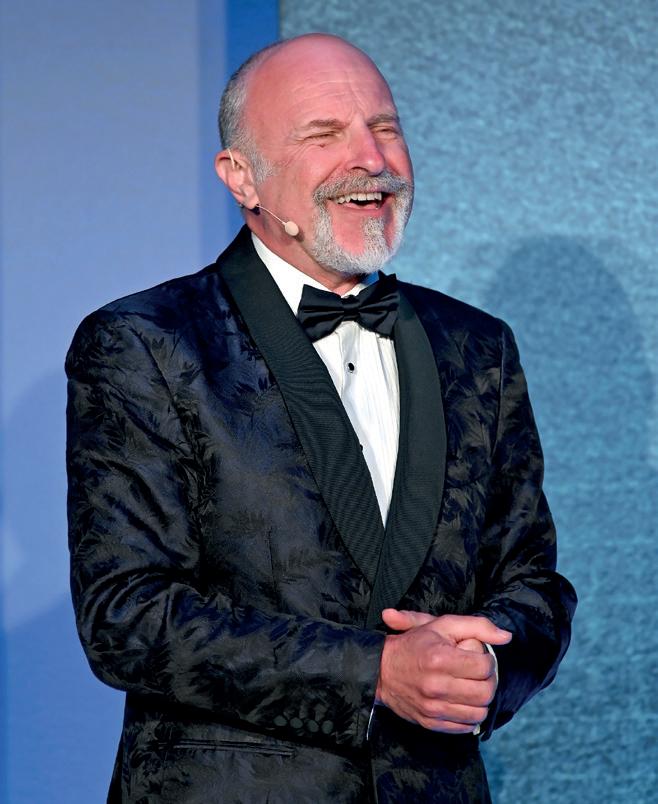





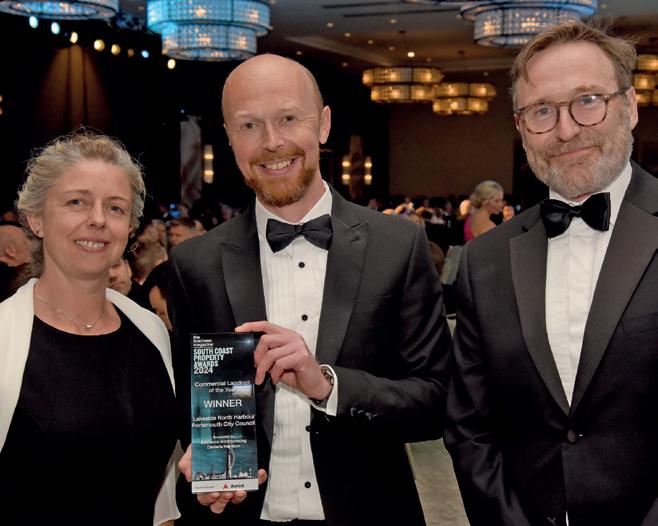
COMMERCIAL LANDLORD OF THE YEAR
WINNER: Lakeside North Harbour
SPONSOR: Eddisons incorporating Daniells Harrison
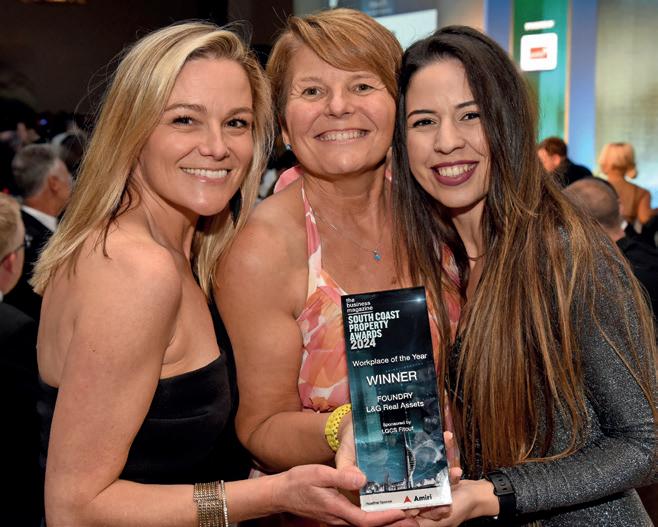
WORKPLACE OF THE YEAR
WINNER: FOUNDRY, L&G Real Assets
SPONSOR: LGCS Fitout

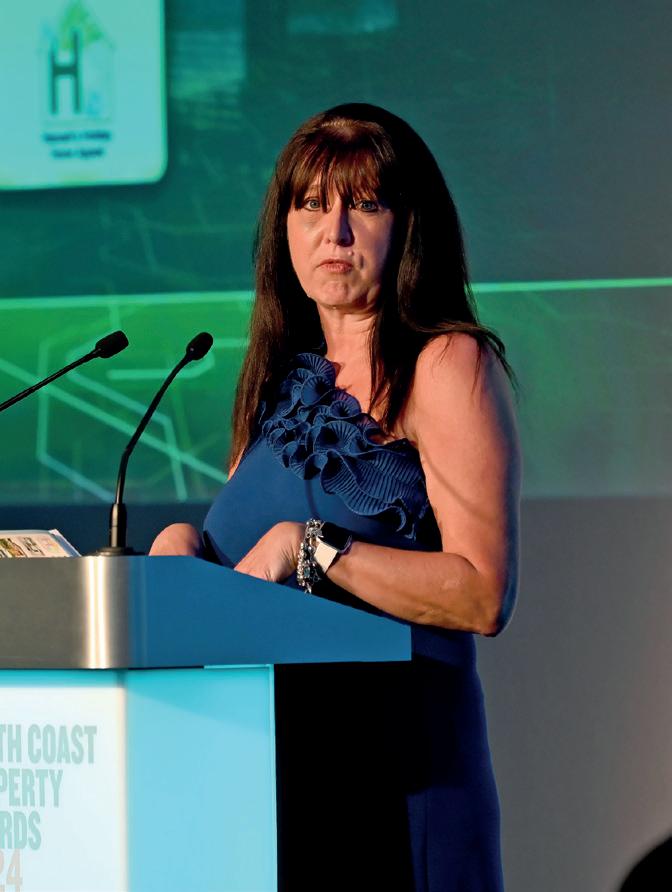




PROPERTY AGENCY OF THE YEAR – COMMERCIAL
WINNER: Lambert Smith Hampton
SPONSOR: Cobweb Solutions



PROPERTY LAW FIRM OF THE YEAR
WINNER: Lester Aldridge
SPONSOR: Goadsby
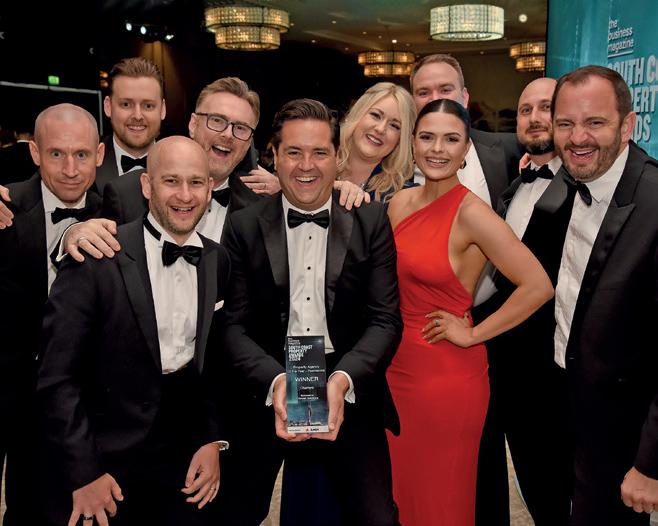
PROPERTY AGENCY OF THE YEAR – RESIDENTIAL
WINNER: Charters
SPONSOR: Cobweb Solutions








COMMERCIAL DEVELOPMENT OF THE YEAR
WINNER: Langstone Park – XLB Property
SPONSOR: South Coast CPS


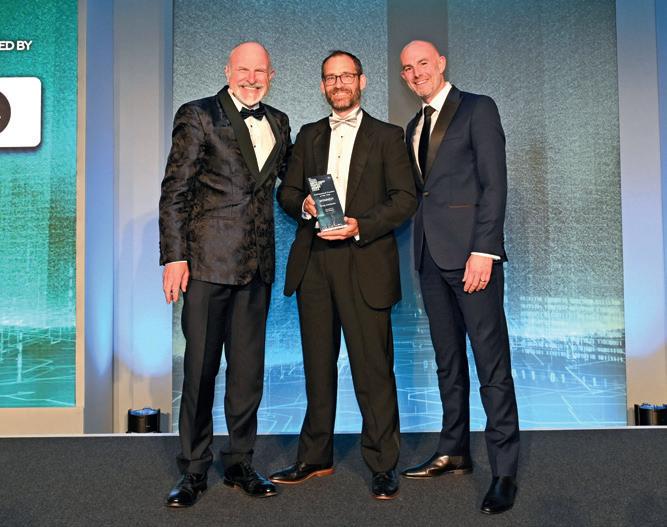
ARCHITECTURAL PRACTICE OF THE YEAR
WINNER: Snug Architects
SPONSOR: The Escape
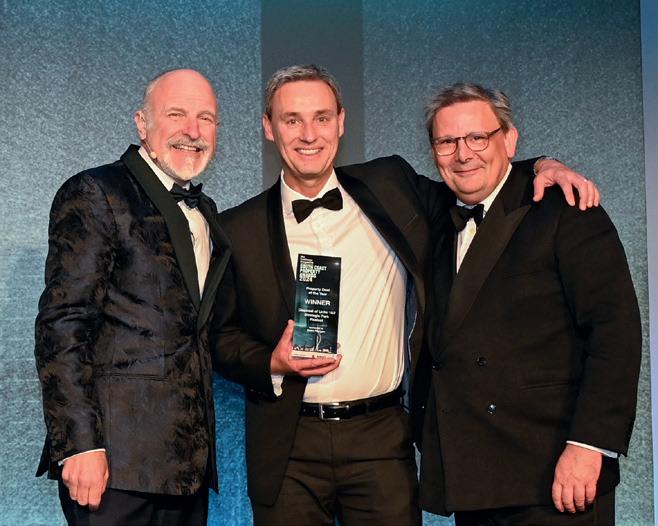
PROPERTY DEAL OF THE YEAR
WINNER: Disposal of Units 1&2 Strategic Park, Southampton – Realest
SPONSOR: Blake Morgan




HOUSEBUILDER OF THE YEAR
WINNER: AJC Group
SPONSOR: Lester Aldridge
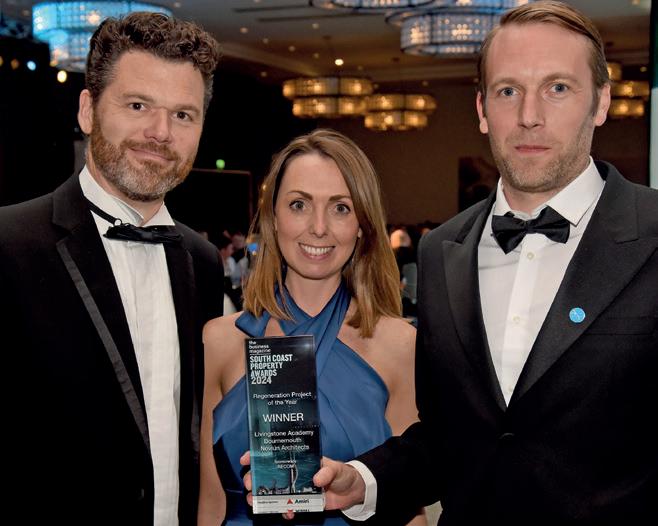
REGENERATION PROJECT OF THE YEAR
WINNER: Livingstone Academy Bournemouth – Noviun Architects
SPONSOR: AECOM



PROPERTY AWARDS WINNERS
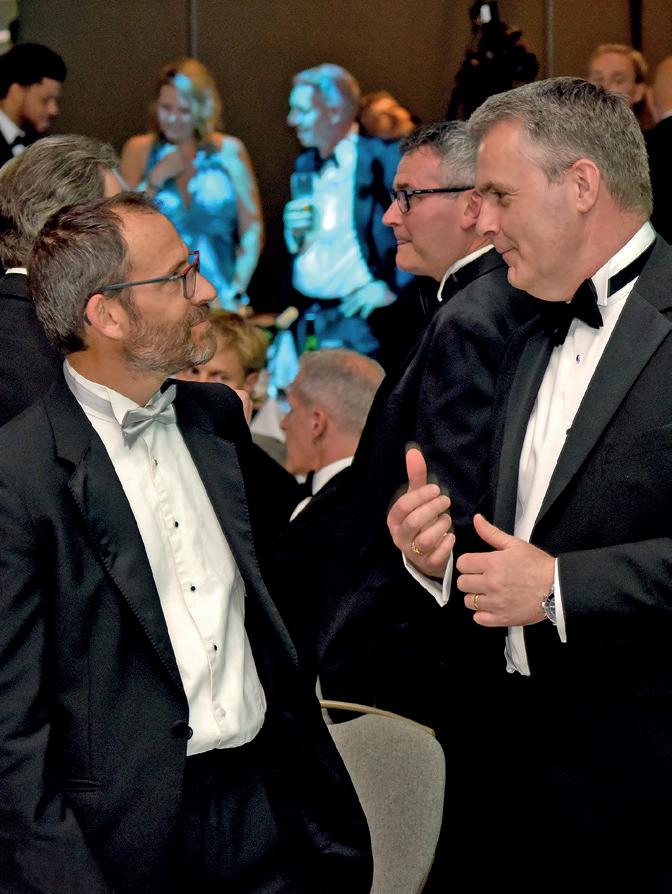
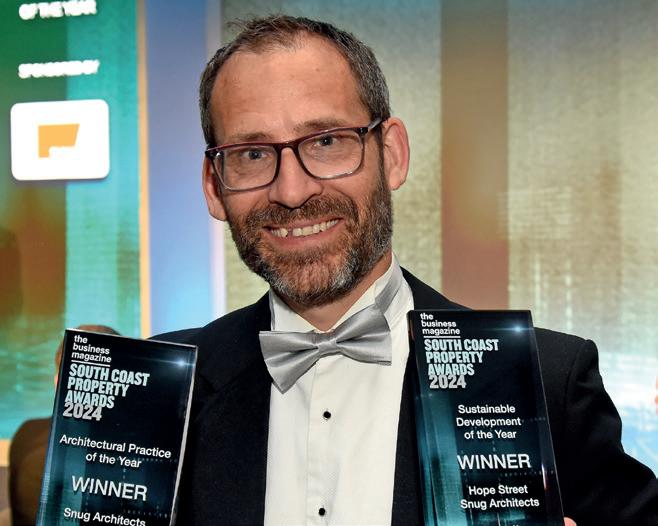
SUSTAINABLE DEVELOPMENT OF THE YEAR
WINNER: Hope Street – Snug Architects
SPONSOR: Barratt Developments

YOUNG PROPERTY PERSON OF THE YEAR
WINNER: Rosanna Parker – Steele Raymond
SPONSOR: SHW



FAST-RISING PROPERTY BUSINESS OF THE YEAR
WINNER: Ridge and Partners
SPONSOR: MSP Capital

RESIDENTIAL DEVELOPMENT OF THE YEAR
WINNER: The Sloop – AJC Group
SPONSOR: Gracelands


THE MARK VINCENT LIFETIME ACHIEVEMENT AWARD
WINNER: Tony Boyle – Boyle & Summers
SPONSOR: Amiri Construction




FOR FULL GALLERY AND TO READ MORE SCAN THE QR CODE





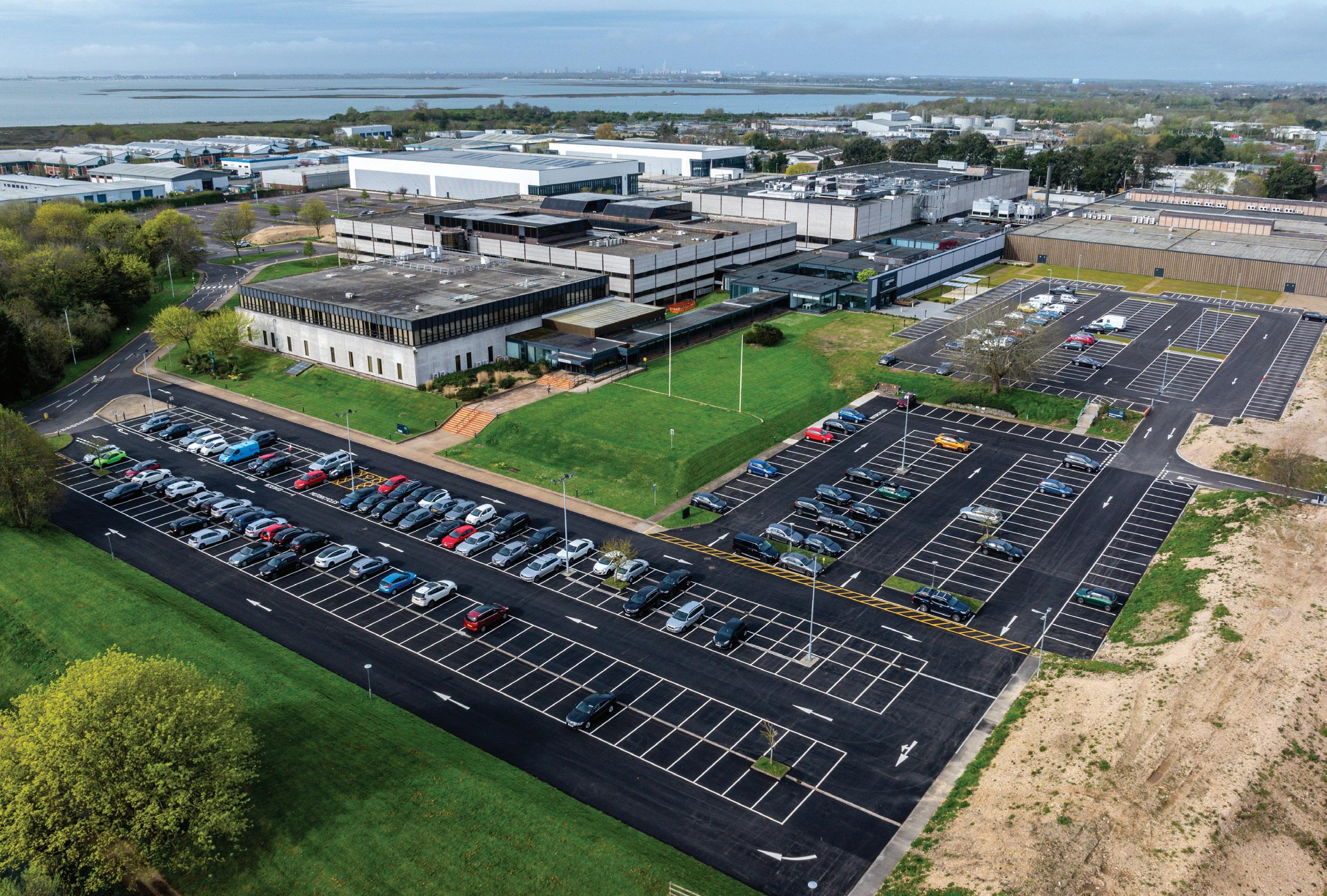

The 40-acre site, once home to IBM who manufactured computers there in the early 70s, now has a secured long-term vision. The park is a key employment site within the local community and had over the years failed to fulfil its potential in supporting local and global businesses with a modern and sustainable business park. It was acquired by global investment manager, Alberta Investment Management Corporation (AIMCo) and leading UK asset manager and developer, XLB in 2020 and has since undergone a major transformation.
The park is currently home to a number of existing buildings and occupiers, who have recently enjoyed a programme of investment to rejuvenate the common areas, provide high-quality workspace alongside a range of amenities. There is an on-site café, nursery, gym, business lounge, meeting rooms, showers and cycle facilities.
The occupiers who call the park home represent a variety of sectors, emphasising its place as a leading R&D and technology draw on the South Coast. These
include leading global organisations in biotechnology and life sciences, defence and maritime systems, agricultural pharmaceuticals, data centre storage and operations, and electronic technologies.
It is evident that the park is providing space for a clustering of high-quality businesses in key innovation sectors within the UK.
The long-term vision for the park will see a phased redevelopment of the park, where existing buildings have become obsolete from both a design and environmental perspective. The consent secured provides for 680,000 sq. ft of modern, sustainable buildings under uses classes E, B2 & B8.
Phase 1 of that vision has already been delivered and is majority let to exciting occupiers. This phase of development recently won the much coveted ‘Commercial Development of the Year’ award at the 2024 South Coast Property Awards.
It has been developed to an exceptionally high standard, setting a new benchmark for the South Coast, both in terms of sustainability and specification. The units achieved BREEAM Excellent and have been rated EPC A+. The solar panels on the roof generate enough energy to offset the consumption of the units, meaning they can operate at net zero carbon.
The next phase of development comprises three units ranging from 26,000 – 34,000 sq.ft. with everything from solar panels to green roofs.
Stephen Wormald, partner at XLB comments: “We are aware of the depth of demand for quality R&D, manufacturing and logistics accommodation within the region and have responded with a contemporary new scheme offering best-in-class, sustainable fit-for-purpose buildings alongside best-in-class amenities. We look forward to delivering the next phase of development on this award-winning business park alongside our partner, AIMCo.”.

The Oxford Trust has launched a fund to help improve science learning for children and young people who are less likely to have access to STEM activities and resources in their schools and community groups. The Accessing Science Fund will cover Oxfordshire and Buckinghamshire.
Delivered through The Oxford Trust’s well-established Science Oxford STEM programmes, the fund will raise money with the region’s corporate partners to support schools that have a high percentage of pupils eligible for free school meals.
The Oxford Trust will work with companies to raise funds which will be doubled by the trust up to £30,000 each year.
The Fund has been launched as part of the Trust’s fifth anniversary celebration of the opening of the Wood Centre for Innovation
and the adjoining Science Oxford Centre in Headington.
The Science Oxford Centre, the UK’s first integrated indoor-outdoor hands-on science centre for primary and early years children, first opened its doors in May 2019.
Since opening, the centre has run more than 600 school visits during the week and 240 family days on Saturdays.
Steve Burgess, CEO of The Oxford Trust, said: “We speak to many science-based companies looking to support children and young people in STEM, but they don’t know how to get involved.
“Our new Accessing Science Fund will bring together our fantastic innovation ecosystem with the young scientists and innovators of the future.”
The University of Portsmouth has won £350,000 funding from the UK Space Agency to help companies overcome the skills gap in software, data and artificial intelligence (AI) in the space sector.
Delivered by experts from the universities of Portsmouth, Southampton and Surrey, it will equip mid-career professionals with the expertise needed for the rapidlychanging fields of AI and data-science.
Dr Becky Canning, deputy director of space at the University of Portsmouth’s Institute of Cosmology and Gravitation, said: “Software, data and AI development proceeds at such a rate that remaining at the forefront of the sector is challenging, yet these digital skills are critical to drive innovation and meet the objectives of the National Space Strategy.”
The 2023 Space Sector Skills Survey noted that the number one skills gap in the space sector is ‘Software and Data’, with a 72 per cent gap.
Employers predict that the future will bring even greater challenges. ‘Artificial intelligence and machine learning’ and ‘data analysis and modelling’ are the only technical skills of the top 15 skills gaps in the current workforce which have worsened, alongside ‘strategy and leadership’.
Dr Louise Butt, director of the Space South Central Enterprise Network, added: “Hampshire, Surrey and the Isle of Wight have a stellar 50-year heritage of space innovation and expertise, and the range of specialisms here is unrivalled anywhere in the UK.
“Yet skills gaps, shortages and recruitment challenges are the biggest threats to South Central England’s £3 billion space sector.
“Our mission at Space South Central is to ensure that our region stays at the forefront of the UK space industry, and a significant part of that is supporting the development of training opportunities and helping employers of all sizes attract and retain the staff they need.”
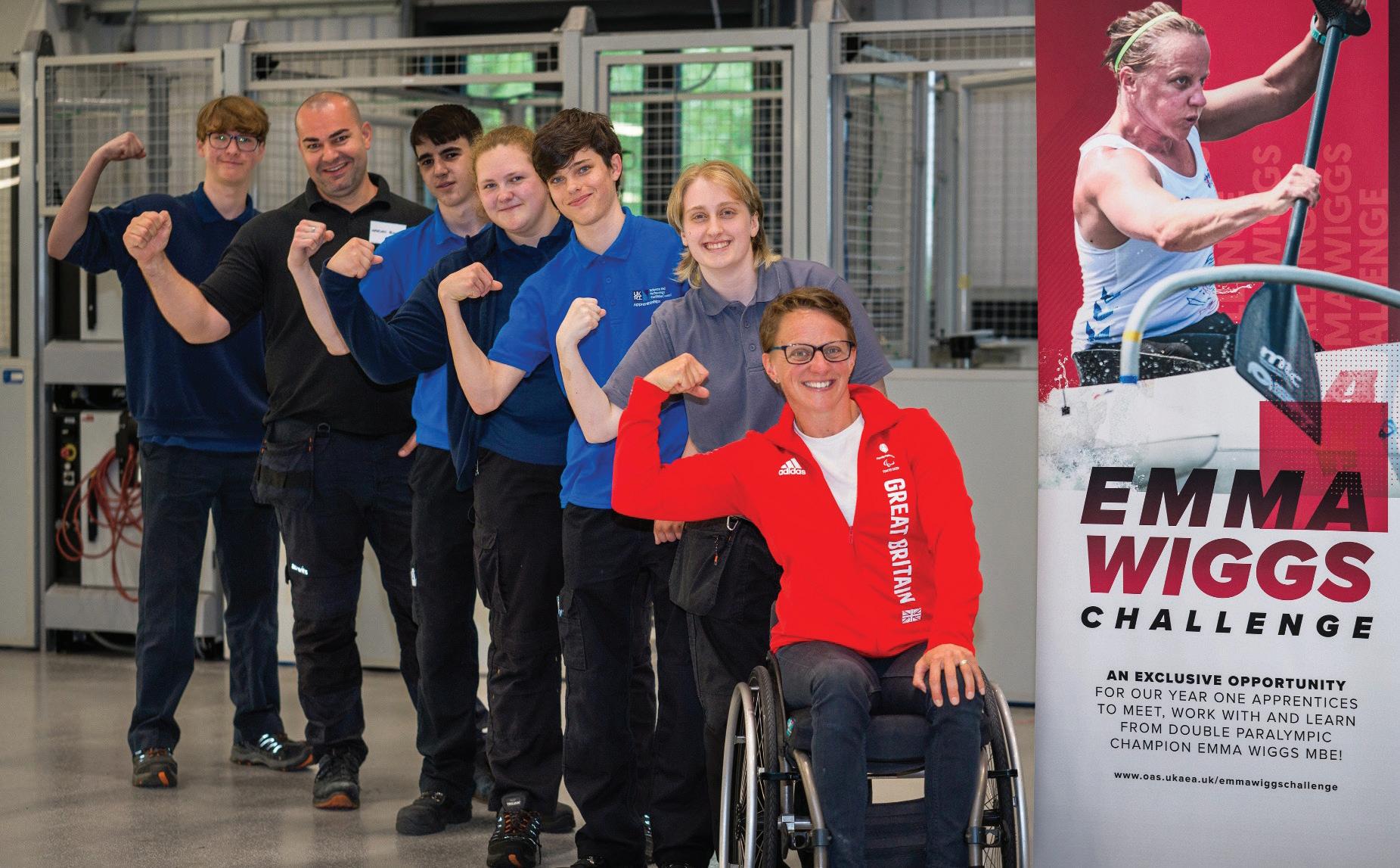
Apprentices at the Oxfordshire Advanced Skills engineering training centre near Abingdon came up with innovative design concepts to help people with disabilities in the final of the Emma Wiggs Challenge 2024.
Double Paralympic champion Emma Wiggs MBE, who launched the competition for a second time following the success of last year’s event, was among the judges assessing the entries which showcased how design engineering can be used to improve life for people with disabilities.
Since her mobility was impaired overnight by a virus at the age of 18, Emma has dedicated herself to paralympic sport, inspiring others with her determination and positive mindset.
Currently in training for the 2024 Paralympics in Paris, she’s become a trailblazer for paracanoeing in the UK.
Her track record includes gold medals at both the Rio and Tokyo Paralympics.
Emma had previously tasked the Manufacturing Technology Centre (MTC), which provides training for the Oxfordshire site, to design a bespoke
This year through the Emma Wiggs Challenge, learners have been creating design solutions around everyday tasks which someone with a disability might find challenging.
She was on hand to help them as they refined their designs.
The winning entry was Sense-Aid, designed by Sophie Walters. Inspired by her own personal experience with autism, the new product aims to help autistic adults find comfort and grounding in times of stress.
The wristband, which is produced from different fabrics and was refined using research, community surveys and computer aided design, is designed to support autistic adults with a practical, portable product in a market which offers primarily child-centred solutions.
The runner-up project was Brush, designed by Thomas Potts, Luke Scofield and Owen Green. The team identified a universal problem for wheelchair users – that of dirt building up on tyres and the challenge of cleaning them before going into a building.
Brush is an easy-to-clip-on unit which cleans as it goes and is 3D printed using PLA (polylactic acid) and flexible TPU (thermoplastic polyurethane).
The brush is replaceable and can be easily detached for use as a standard manual brush.
The highly commended finalist was The Braille Knife designed by Marian Bumbar.
Her inspiration came from imagining the daunting task of selecting the right knife in the kitchen, without the sense of sight.
Apart from the obvious safety considerations, this also involves gauging texture and functionality through other senses. Marian’s solution is the Braille Knife.
Made with strong, lightweight titanium blades which feature Braille engraved directly onto the handle, the design helps those with impaired vision to confidently select the appropriate utensil.
Emma said: “As I train for my own next challenge of qualifying and competing at the Paralympics in Paris, I’ve been delighted to work with and advise the apprentices on their projects.”
by Stephen Emerson, Managing Editor
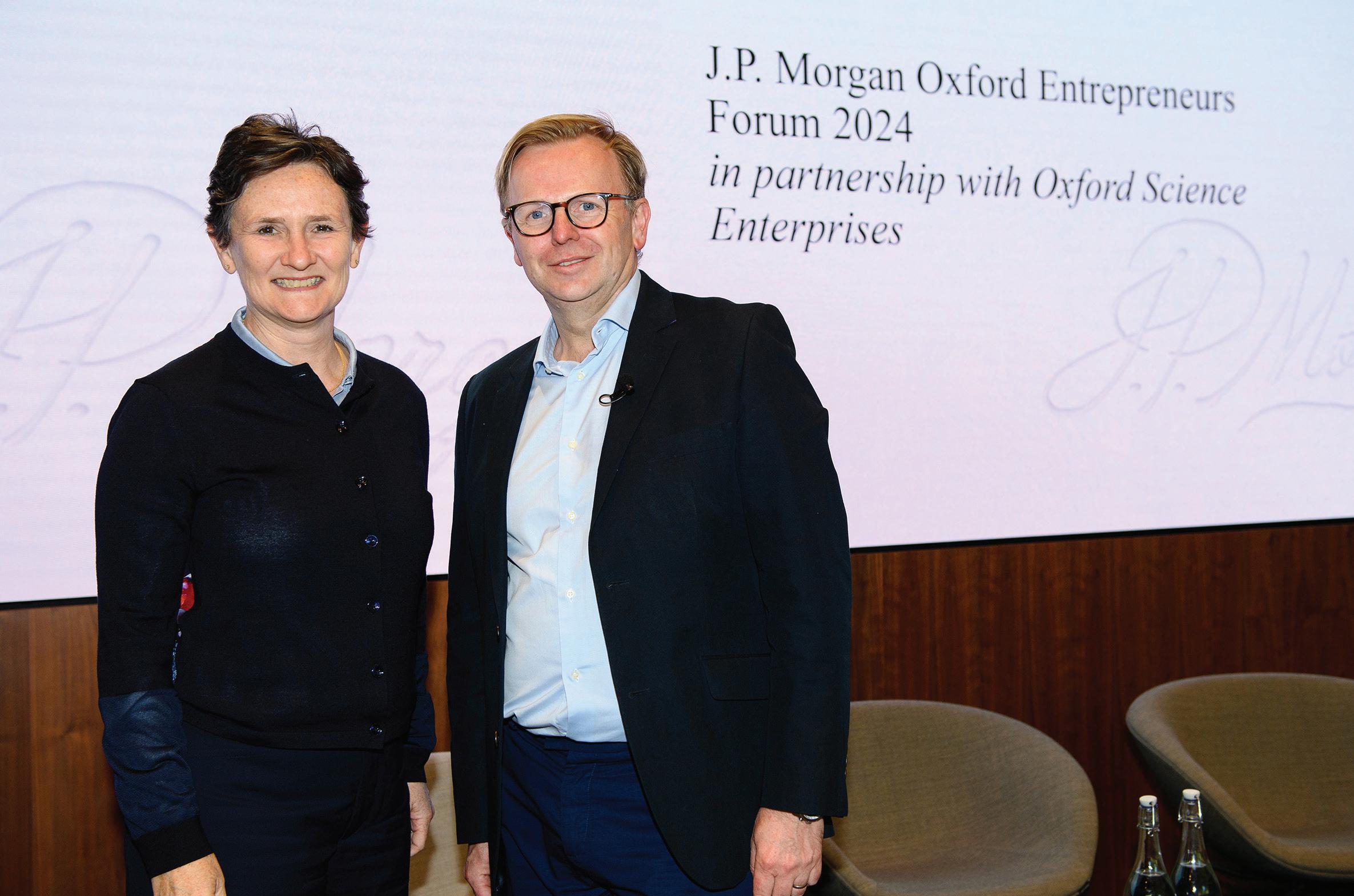
Expertise is needed to take advantage of early stage investment opportunities
The collision of science and software is creating a life sciences and deep tech growth drive. Oxford is at the epicentre, and yet investors drawn to these sectors are met with early stage companies where specialised knowledge is increasingly vital.
The Oxford Entrepreneurs Forum, held in May at Rhodes House in Oxford and organised by JP Morgan Private Bank, set out to explore the private market opportunities within this space and how private investors can navigate this increasingly complex investment landscape.
The inaugural event brought together Oxford-based entrepreneurs and investors who have a focus on the life sciences, tech and health sectors, and builds on a similar event held last year in Cambridge.
Oxford and Cambridge have become magnets for life sciences and deep tech start-ups in recent years, with Oxford now ranked as the third most intensive science and innovation cluster in the world. Companies in the deep tech and life
sciences space use data and high-powered computing innovations to develop solutions to a broad spectrum of health issues.
Successful deep tech and life sciences Oxford spin-outs include Oxford Nanopore Technologies, OXSIGHT, NightstaRx, Oxford Immunotec, Perspectum and Barinthus Biotheraputics, but there are many more.
John Derrick, Managing Director at JP Morgan Private Bank, which advises entrepreneurs, family foundations and endowments within Oxford, said there was now an institutionalisation process taking place in the private markets.
He said: “The private market is a very unstructured world compared to the listed markets, which are quite organised. You need a bank that can help you access global and domestic investors.
“The size of transactions has also got significantly larger so you cannot just depend on the same small circle of people.”
Elena Lovo, PhD, is Head of Life Sciences in
Europe, the Middle East and Africa for JP Morgan’s Innovation Economy business and works with life sciences companies across the region, from early stage to exit.
She said that innovation in the life sciences and deep tech sector is moving at lightning speed.
She added: “Original money comes into the universities for the medical research and then that gets patented and licensed to form university spin-outs.
“There is a real acceleration going on in science and we are seeing medical advancements converge with the software side.”
John said that the idea for the event came from a desire to introduce investors early to companies with high growth potential and build on Oxford’s reputation as a global life sciences and tech hub.
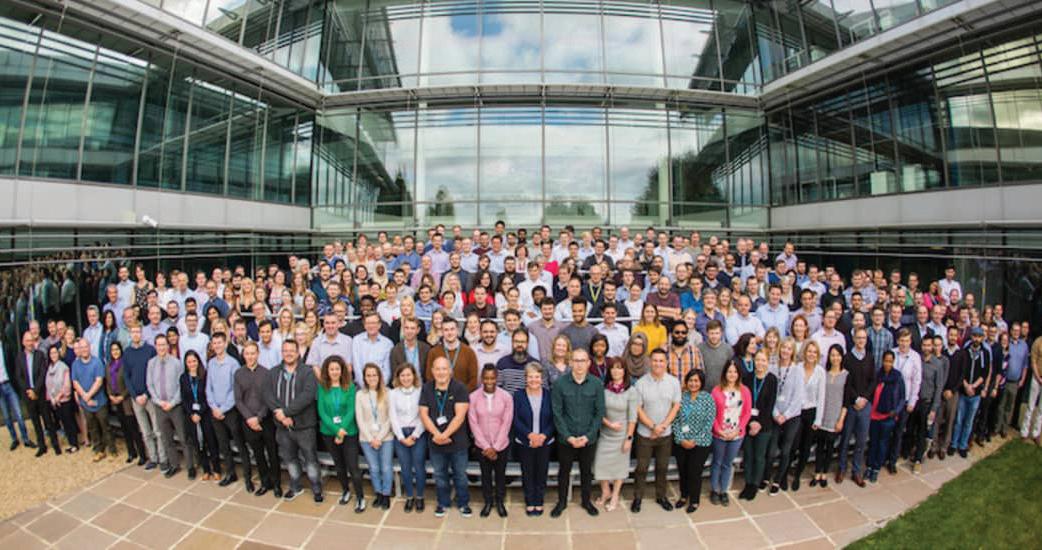
He said: “You can turn up when the company is just about to IPO, but that’s a bit too late. We are building relationships early, and this event is specifically focused on helping to bridge that gap.”
Family offices are key for JP Morgan Private Bank, however many of these offices may not have the expertise to successfully select and back emerging companies.
John said: “Even if you’re a very wealthy family with a significant family office, you may not have enough experts so it’s about partnership and being able to access networks in a more structured way.
“They are really interested in being exposed to healthcare, climate tech and artificial intelligence developments as a key theme for the next 40 years, but they do need a bridge.”
“We provide that bridge to the sector through JP Morgan Private Bank and also our colleagues in the wider bank.”
Choosing the right investor is crucial as spin-outs are often headed by professionals from an academic background who lack the commercial experience to scale up.
John said that opting for “clever capital” that would complement and support business growth was a common trait in successful companies that have emerged from a university setting.
He said: “There is a lot of capital around, but you want clever capital. You can accept the highest investor, but that is a bad idea if it is the wrong investor.
“What capital are you bringing into your company? Is it helpful capital? Ideally you want to bring in capital and expertise.”
Elena echoed the importance of bringing in “clever capital” and added that JP Morgan would often connect their clients with advisory boards and give them access to a global network of experts.
She said: “In life sciences, there is still capital available, but it is a lot more selective.
“It is really important that entrepreneurs and companies understand how to manage the capital they have in terms of the number of dollars coming in versus the use of it.”
Elena added that it is key to get your story right to the investors to stand out in what can often be a competitive market.
She said: “When we talk to companies, we always ask them to tell us the story that they would tell their kids or their parents because a lot of investors at the earlier stage tend not to be specialised.
“You need to talk about the scientific data, but this has to be done through a story in a concise manner that is accurate and will hold people’s attention.”
The journey of an entrepreneur rarely follows a straight-line growth trajectory and it was vital, John said, that entrepreneurs placed their future prospects and those of their family at the centre of their investment decision-making.
He said: “Entrepreneurs should consider taking some money off the table to ensure the life needs of their family are covered.”

“We have all seen entrepreneurs who can go 20 years without taking anything off the table, and then a competitor comes in with new technology and their markets disappear.”
Rising interest rates have stifled investments in the life science sector globally, however there are signs of optimism.
Elena said: “In Europe we have seen an increase of around 19 per cent in Venture Capital-led financing across the board and not just in life sciences, compared to quarter one in 2023.
“This capital is a lot more selective than before. The rounds tend to be larger in investment, but smaller in number.
“Investors are very aware of where the valuations sit today which are lower compared to the last three years.”
The Business Magazine tracks all major mergers, acquisitions and investments in the South East with its Deal Ticket services. This is updated weekly on our website.

Biotech firm Oxford Biodynamics has announced a new blood test which can diagnose six types of cancer in dogs.
The EpiSwitch SCB (scooby) test is based on the firm’s EpiSwitch platform and was developed in collaboration with a number of groups, including the University of Minnesota.
The test will now be made available to a select group of vets who will generate real-world data and it is expected to be commercialised through a partnership or outlicensing arrangement with an organisation in the pet healthcare sector.
“The ability to detect the presence of common, life-threatening dog cancers with high accuracy using blood samples provides an improvement over current methods of diagnosis, reducing or eliminating the need for invasive biopsy
procedures,” said Professor Modiano, of the University of Minnesota.
“I believe that the eventual implementation of these tests also has potential to enhance the precision and therefore improve the management and outcomes of canine cancer patients.”
The new test can detect six high-utility, frequently occurring cancer types: three sarcomas, two lymphomas and malignant melanoma, each with balanced accuracy of more than 89 per cent, claims Oxford Biodynamics.
Chief scientific officer at Oxford Biodynamics, Dr Alexandre Akoulitchev, said: “Once again, we were determined to translate to practice the full potential of our EpiSwitch technology, this time to tackle a prevalent veterinary challenge in support of our four-legged friends.”
Once again, we were determined to translate to practice the full potential of our EpiSwitch technology, this time to tackle a prevalent veterinary challenge in support of our four-legged friends
The scooby test is expected to help veterinary specialists diagnose cancer and make more informed treatment decisions, minimise or avoid unnecessarily toxicity, and efficiently manage costs.
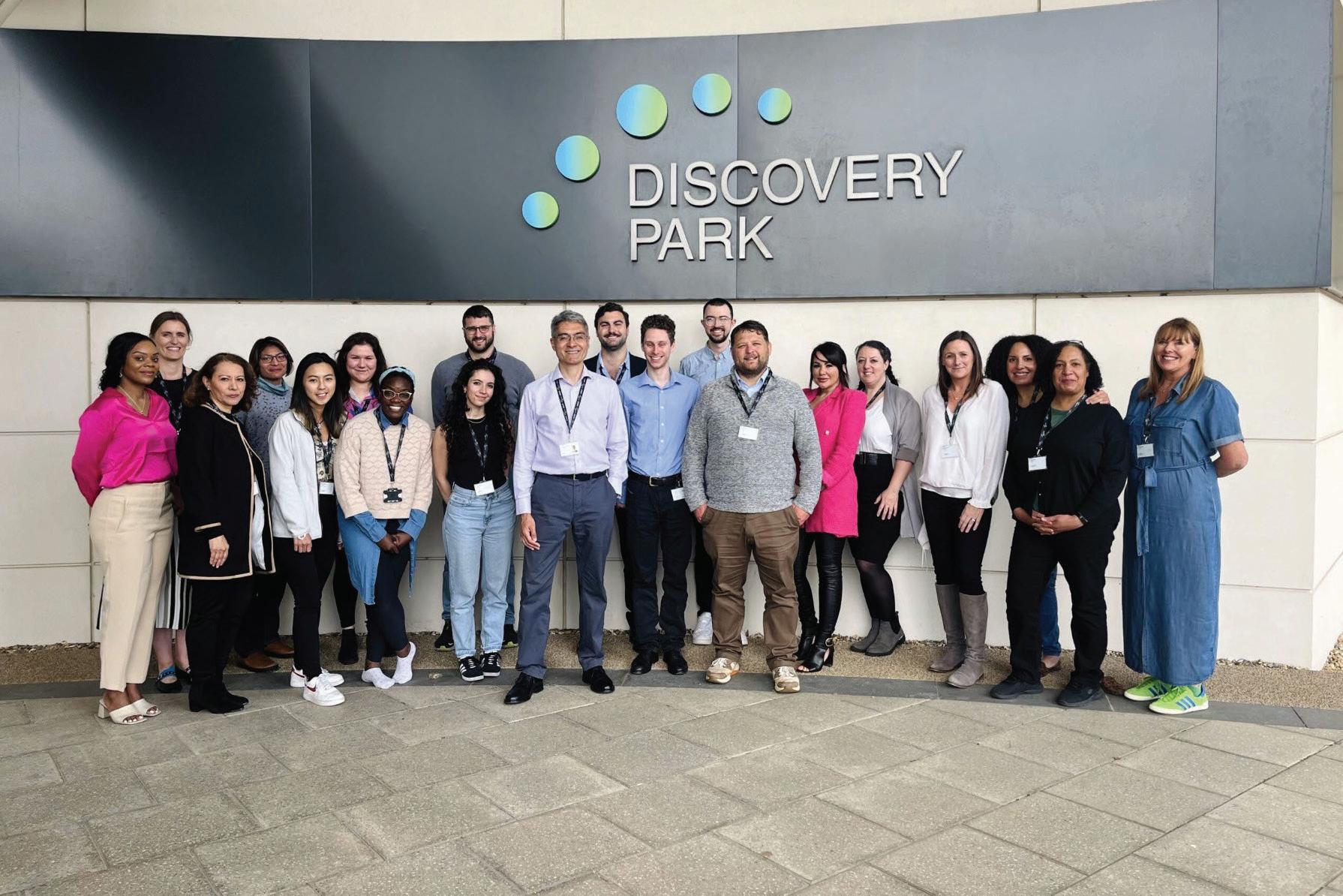
Discovery Park innovation campus in Kent has chosen 11 promising start-ups in femtech and women’s health to join Discovery Spark, a growth and support programme for early-stage businesses.
This special female-focused edition of the Discovery Spark programme offers mentoring and support, preparing start-up founders for success in investment pitches.
Concluding with Pitch Day this month, the cohort will compete to win a prize package worth more than £50,000 – including a year of laboratory or office space at Discovery Park, as well as support from specialist partners.
Discovery Park selected femtech and women’s health as a focus for the programme in response to the government’s Women’s Health Strategy, which highlighted the lack of representation in medical research and shortfall in healthcare solutions specifically for women.
Despite living longer, the average woman spends nearly a quarter of her life in poor health, compared with a fifth for men.
“Discovery Park is committed to championing the next generation of life science leaders, but even we were overwhelmed with the number of applications received for this edition of Discovery Spark”, said Dr Renos Savva, Discovery Park’s Head of Innovation.
“The selected companies represent the best of the best in new innovations for
women’s health, helping to address the ‘missing 52 per cent’ in health equity.”
Companies selected include Imphatec, inventors of a pioneering subcutaneous drug delivery platform which aims to revolutionise the treatment of chronic and long-term illnesses – many of which disproportionately affect women.
The company recently went through its first seed round, raising significant capital.
Also included is Hulk Bio, winner of the Scottish EDGE Wild Card award 2024 – a biotech which is transforming infant nutrition by offering a stem cell-based human milk alternative when breastfeeding is not possible.
BodyOwn is aiming to simplify management of female sexual and reproductive health by providing a central point for validated information, care services and assisted guidance, using tech to set new standards of care for women’s health.
And personalised care provider Minter et AI Hormone Health is looking to improve access for women seeking diagnosis and treatment of perimenopause and the menopause, providing consultations and hormone health services both virtually and in-person.
The other companies selected for the 2024 cohort are Cooden Cosmetics, Etre Libre, Joii, Make your path, Peach, SM Discovery Group (SMDG) and Young Mums Support Network.
Venturefest South, the fast-growing innovation and business growth programme for the south, is to return this November for the eighth year, with influential new partners on board.
New this year will be a series of ‘Rumble Events’, focusing on topics including funding, investment and IP protection, to be held at partner venues in the run-up to the day-long event on November 14 at the Utilita Bowl in Southampton.
The 2024 programme also welcomes Arts University Bournemouth, Blake Morgan, Barclays Eagle Labs, Openshaw & Co, National Biofilms Innovation Centre and National Oceanography Centre as partners.
Mark Hamson, innovation centre manager at the National Oceanography Centre, said: “Innovation is key to what we do, and we’re looking forward to working with Venturefest South to reach more businesses and individuals that can help turn great science and technology into advice and applications.”
They join a line-up of existing partners which includes DSTL, South Hampshire College Group, Carswell Gould, British Business Bank, Solent Partners and the universities of Winchester, Southampton and Portsmouth.
This year’s programme kicked off with a partnership meeting hosted by Barclays Eagle Labs in Southampton, where the new leadership team discussed regional issues and opportunities.
Since its inception, Venturefest South has supported more than 8,000 entrepreneurs with funded or free resources and a platform to showcase their innovative businesses.
Applications are now open, with entrepreneurs, start-ups and scale-ups across the South of England invited to be part of this year’s programme.
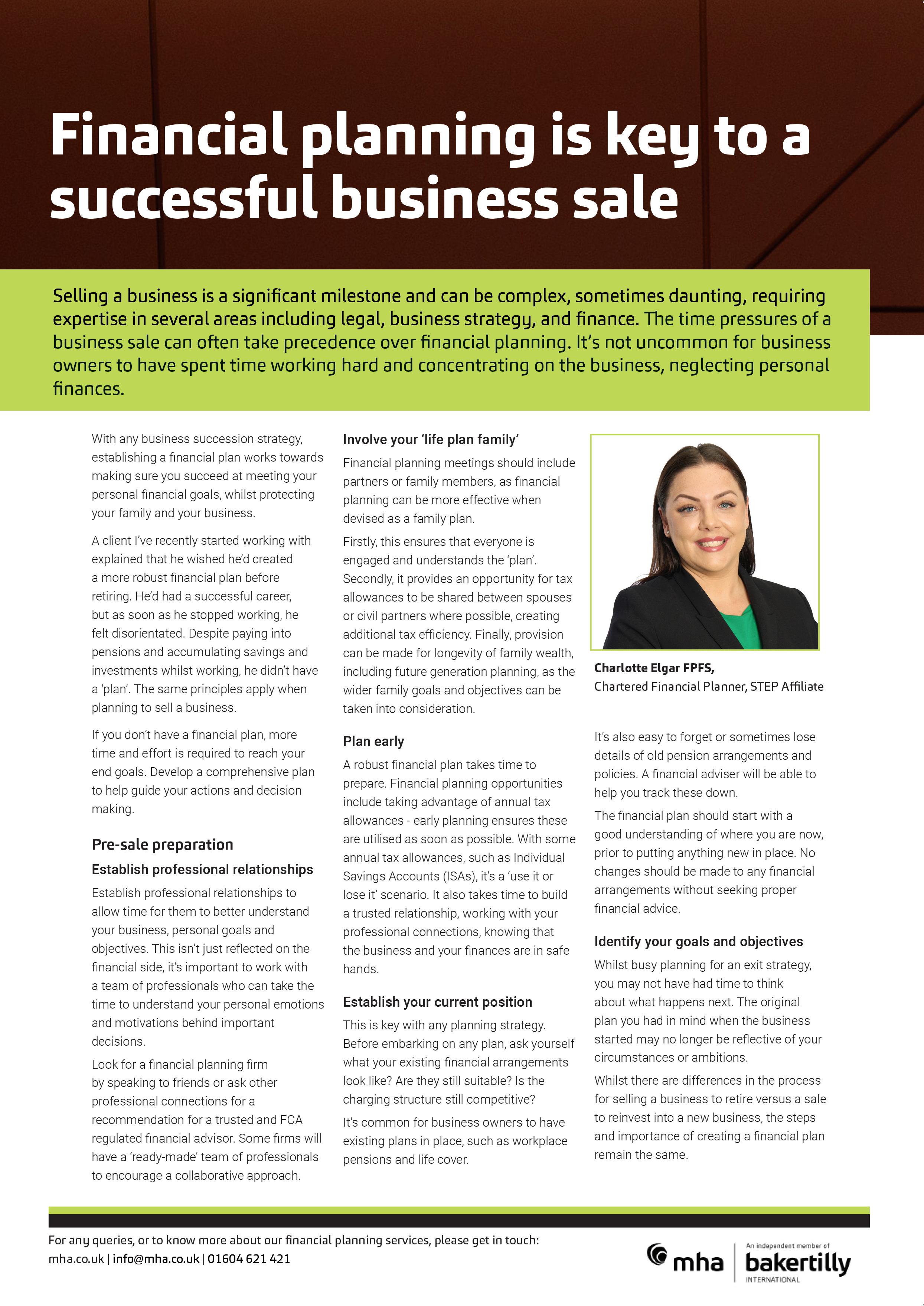
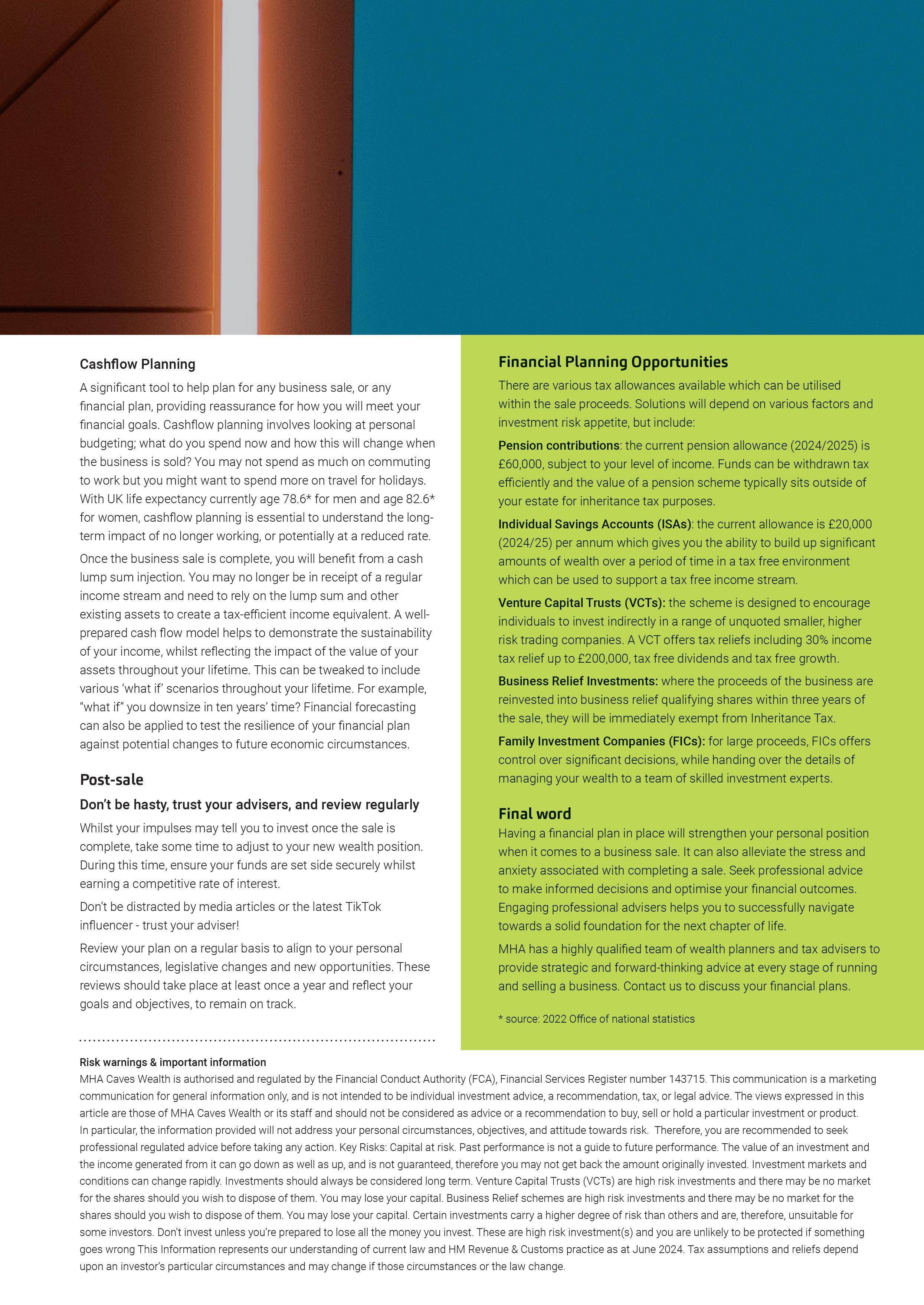
Military training provider Mabway (Hampshire)

has been acquired by Tech firm Calian Group (Canada)
Buyside advisers include: Osborne Clarke (legal)
Sell-side advisers: Momentum Corporate Finance

has been acquired by Halma (Buckinghamshire)
Brokerage Hilton-Baird Group (Hampshire)

has been acquired by Corporate finance firm FRP Advisory (London)
Advisers:
Cavendish (Nominated Adviser and Joint Broker) Investec (Joint Broker)
4Com Technologies (Dorset) Payroll company Shape (Hampshire)

has been acquired by Daisy Group (Lancashire)

has been acquired by HR systems provider Ciphr (Berkshire)
Workforce management firm Swipeclock (United States)

has been acquired by Finance software firm IRIS Software Group (Berkshire)
Advisers: Piper Sandler (financial) Paul Hastings (legal)
Yacht-builder Sunseeker International (Dorset)

has been acquired by Private equity firm Lionheart Capital (United States)
IT distributor Spire Technology (Dorset)

has been acquired by IT distributor Westcoast (Berkshire)
Sell-side advisers: Quantuma (corporate finance)
Cathcarts Solicitors (London)

has been acquired by B P Collins LLP (Buckinghamshire)


has been acquired by Landscaping firm Nurture Group (Surrey)
Sellside advisers include: Thomson Snell Passmore (legal)

has been acquired by Airport Retail Enterprises (London)
Sellside advisers include: Quantuma
By Simon Davies, partner at FRP Corporate Finance
2024 has so far delivered some market stability, with economic conditions improving, and with falling inflation and stabilised interest rates we should expect to see a more positive market for dealmaking across the Thames Valley in the coming months.
To date, this is in sharp contrast with last year, which was characterised by uncertainty, leading to caution in the M&A market and a decline in deal volumes across the region.
There remains a hangover of that uncertainty, with many investors more cautious. We are seeing many carry out a more extensive due diligence process, impacting the time it takes to get deals over the line.
Looking ahead, I expect deal activity in the technology and business services sectors to remain strong, as such businesses have great potential for growth.
In these sectors, bolt-on acquisitions can also be done with lower multiples, which further limits the risk for investors.
We are also seeing a resurgence in interest in the manufacturing and industrials sector, and in professional services, as investors look to businesses with technical or commercial expertise that make them resilient in the face of challenging economic environments.
Across the board, we can expect activity to increase in the coming months. The

has been acquired by Q-Park (West Yorkshire)

base rate is now stable and expected to fall, which should help larger, leveragedependent deals to progress whilst encouraging a pick-up in private equity activity.
The earlier than anticipated election should also prove good news for M&A activity.
A prolonged delay breeds uncertainty, but with many deals already in exclusivity and looking to complete before the main summer break, the election uncertainty will be gone before September and the start of new deal processes. As has been proved over many elections, the outcome is less important than the actual hype, decision paralysis and the uncertainty of the event itself.

By Stephen Emerson, Managing Editor
After spending a career working for some of the world’s largest fund managers, Mark Wharrier spotted an opportunity to help companies increasingly being passed over for funding by high street banks and large private equity houses.
So, with a strong CV including BlackRock and Mercury Asset Management, he launched Scientific Partners Ltd in the summer of 2023 with a group of like minded investors.
The company is currently made up of 12 investors who seek out niche companies in the manufacturing and technology space with a turnover of less than £10 million.
The holding company, whose directors are primarily based in Buckinghamshire and Surrey, completed its first deal in December last year, namely Norfolkbased electromagnetic compatibility (EMC) testing equipment manufacturer Laplace Instruments.
It is now on the hunt for hidden South East gems that are often passed over by larger financial institutions but have long term growth potential.
Mark, who has spent 30 years managing
pension funds and investing in UK companies, said: “High street banks aren’t playing the role that they did 20 years ago. They don’t have the bandwidth and the local knowledge that came with branch managers.
“This space has been taken over by private equity who now predominantly want to do bigger deals and are not interested in businesses below £1 million EBITDA.
“They would rather be doing much larger deals because they have a limited number of private equity deals they can complete and don’t want to spread themselves too thin.”
It was while working as a fund manager that Mark developed an interest in smaller manufacturing and technical businesses, whose bustling factory floors seemed a world away from the computer terminals and air-conditioned offices he worked in before.
He said: “What is left of the manufacturing sector in the UK is pretty good. Because we have outsourced much of the commoditised part of the industry to the Far East, the remaining businesses usually
have a lot of intellectual property and expertise.
“I like going into factories and watching people make things. Having spent a career in the city, it’s quite exciting walking around a manufacturing floor and seeing a product being made.”
These SMEs are the engine room of the UK economy, accounting for three-fifths of the employment and around half of turnover in the UK private sector.
Mark said: “We are called Scientific Partners because we are interested in science in its broadest possible sense including software, life sciences, aerospace, defence and testing.
“However, we are more interested in the growth prospects and profitability of the company than it falling into a narrow category.
“The whole of the South East is full of these special companies that are just below the radar. These are the types of companies that we want to have a conversation with.”
The Scientific Partners co-founder said his collective was a long-haul investor and provided a bridge between ambitious

We would love to get in a position in 15 years’ time where we have a collection of really interesting business where we have employed new graduates, opened up new markets, given people rewarding jobs and given them incentives that perhaps they didn’t have when they were owned by the founder.
management teams and a founder who may be looking for an exit.
The ideal candidate company, says Mark, has an EBITDA of £1 million which means it is too small for private equity and too large for a Management Buyout (MBO).
He said: “People always need to retire at some point and historically this exit has come from an MBO or the company is sold to a competitor.
“For a lot of founders, their business is their life’s work. They don’t want to sell to someone who is going to start sacking people or to sell it to private equity only for the business to be sold again a few years down the line.
“We are interested in finding niche businesses and giving them all the support they need to grow while maintaining their autonomy.”
Scientific Partners, like all investment ventures, is looking to achieve growth, but aims to hold businesses over the long term and reinvest the cashflow in new acquisitions.
This growth, Mark says, can only come from businesses marshalled by a strong management team that are not reliant solely on the founder and who are given space to develop a plan that will grow the business beyond its current baseline.
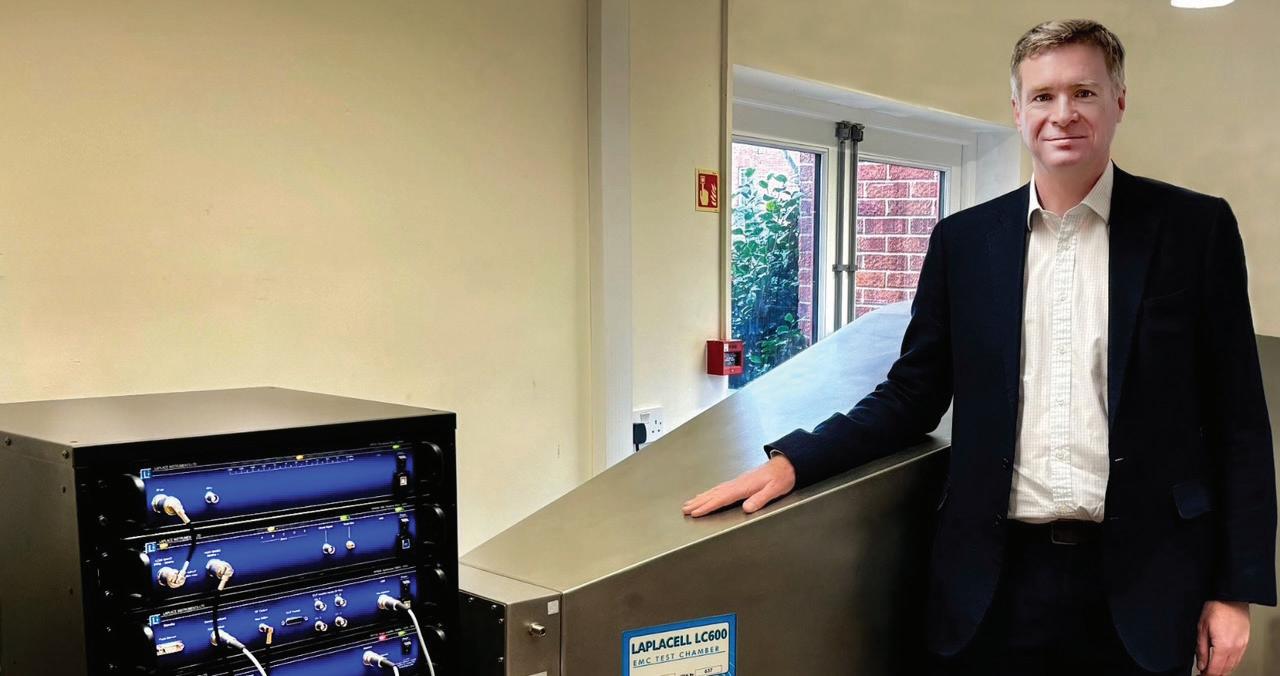
He said: “Most of the companies we are looking at have fewer than 20 employees.
“Everybody is busy spinning a lot of plates and our job is to give a little bit of oxygen and breathing space to the management team to think about how to grow the business.
“Most small companies may not really be thinking too deeply about strategy, new product development, new trade shows and new markets and exporting, because this just takes too much of their time away from the day job.”
What does the direction of travel look like for Scientific Partners over the long term?
Mark, who has just turned 50, says he has another 20 years left of his working life and plans to spend it helping innovative businesses to grow.
He said: “Ideally we would like to buy one business a year, but we will not buy a business just for the sake of it.
“We would love to get in a position in 15 years’ time where we have a collection of really interesting business where we have employed new graduates, opened up new markets, given people rewarding jobs and incentives that perhaps they didn’t have when they were owned by the founder.”
The Business Magazine website has launched a new Deal Ticket service which gives corporate financial specialists the ability to tell the story of their transactions to the dealmaking community and people who are considering selling their business.
Visit thebusinessmagazine.co.uk/dealticket to find out more.


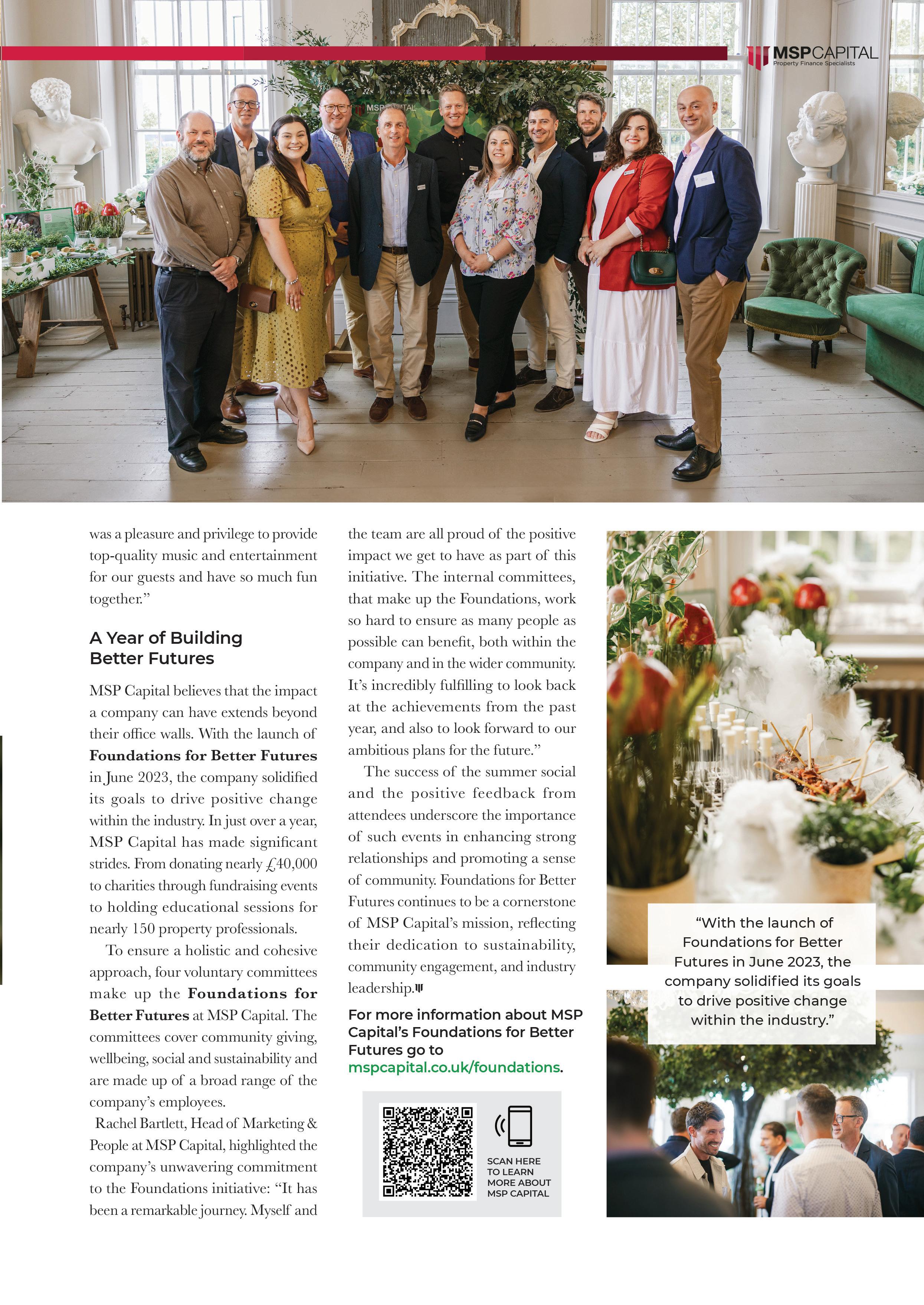

Asymchem Laboratories is set to take over the former Pfizer small molecule API pilot plant and development labs at Discovery Park in Kent, gaining its first manufacturing foothold in the UK.
Based in Tianjin, China the company will continue to operate the site as a clinical small molecule development and manufacturing facility to meet global demand for pharma services and supply.
Asymchem expects the development labs to begin operation this summer followed by the API pilot plant.
The site is expected to support around 100 staff by the end of this year, including many previously employed by Pfizer.
Planned additions for the site include capabilities for the manufacture of peptides and oligonucleotides, as well as sustainability capabilities making use of continuous flow and biocatalysis.
Mayer Schreiber, CEO of Discovery Park, added: “We’re delighted that Asymchem has selected Discovery Park as their European base and home to their first manufacturing facility in Europe, bringing new jobs and safeguarding scientific talent.
“They join a community of over 160 companies in our designated Life Sciences Opportunity Zone, representing an incredible talent pool which contributes significantly to the UK life sciences economy.”
A multi-million-pound investment from owners VT Holdings – one of Japan’s largest retailer groups – will see Caterham increase its production capacity by 50 per cent, to 750 units annually from its new headquarters in Dartford, Kent.
The new building will be home to Caterham’s production, engineering, motorsport and commercial teams.
The 54,000 sq ft facility is located
in a new nine-acre industrial park development called Dartford X, close to the existing factory, enabling the retention of the skilled workforce who are responsible for hand assembling all cars.
Following a nine-month fit out and transformation, the new building now features the latest paint booths, an engine shop, parts warehouse and 33 individual bays, where each car builder is responsible for the complete build of a Seven. The additional floor space and
layout will enable the business to operate more efficiently.
Bob Laishley, CEO of Caterham, said: “Moving into our new global headquarters is a significant moment in our brand’s history and will be transformational for the business and the future of the Seven. For the first time in our 50-year history the production, engineering, motorsport and commercial teams will all be housed under one roof.”

Everrati, a Bicester manufacturer of electric vehicle powertrains, has launched a partnership with luxury hypercar brand W Motors.
Based in Dubai, W Motors produces models including the Lykan HyperSport, Fenyr SuperSport, and GHIATH, a series of security and defence vehicles initially developed for the city police force.
The brand will now serve as Everrati’s manufacturing partner for the region,
Albion Stone has developed a pioneering sustainable production line to launch its new range of Heritage Portland Stone bricks.
Founded in 1952, the Dorset mining and manufacturing business supplies stone to some of the UK’s most historic buildings –including Buckingham Palace and St Paul’s Cathedral.
After spotting a gap in the market, Albion Stone now boasts the UK’s first production line making low-carbon bricks from offcuts of natural stone, mined on the Isle of Portland.
The process produces 75 per cent less embodied carbon than traditional clay fire bricks, which must be mixed, formed, dried and heated at extreme temperatures –consuming a lot of energy.
“We’ve been extracting and producing Portland stone for just gone 40 years”, said Michael Poultney, managing director of Albion Stone.
“Twenty years ago, we switched from quarrying to much more environmentally sensitive mining of Portland stone, but in just 12 months we’ve made some of the biggest and most innovative progress
the natural stone market has seen for some time. Our surplus blocks of Portland stone have always been an issue – these stones have a range of geological features that are deemed too variable for most traditional architects.
“We’re really excited to be able to take advantage of this stone in a fresh and innovative way, and create a whole new product that will dramatically reduce the carbon footprint of some of the world’s biggest and most historic projects.”
The investment was backed by a £450,000 asset finance package from Lloyds Bank.
This enabled Albion Stone to more than double its manufacturing capacity with a new facility and diversify its product range.
The business has also brought on another five team members and is on track to grow turnover by 20 per cent to £10 million in 2025.
Albion Stone can now process an additional 8,800 tonnes of Portland stone – the equivalent weight of 20,747 jumbo jets – and has plans to open a second manufacturing plant for its Heritage brick range.
bringing its electrified portfolio to the Middle East and beyond.
In turn, Everrati, through its newly-launched Powered by Everrati business to business division, is set to develop and supply electric powertrains to W Motors for its upcoming range of zero emission vehicles.
The Oxfordshire firm will also establish an expertise centre in the Middle East, based at W Motors’ new automotive factory in Dubai Silicon Oasis.
Electric van powerbank maker
TUAL takes new HQ in Bicester
TUAL, a designer and manufacturer of electric van powerbanks, has opened a new headquarters at Bicester Motion.
The new site will add to its technical development and engineering centre, and planned assembly line in Glasgow.
The company has developed modular, portable powerbanks to integrate into a van’s load space, allowing for overnight charging regardless of location.
TUAL currently employs a team of eight, with plans to grow to 30 staff across three continents by 2026.
Philip Clarke, chief executive officer and founder of TUAL, said: ““We intend to scale our commercial operations at Bicester, in parallel with the expansion of technical operations in Glasgow, to help businesses make a success of the electric commercial-vehicle transition.
“The industry needs to seize the opportunity to electrify commercial vehicles.”

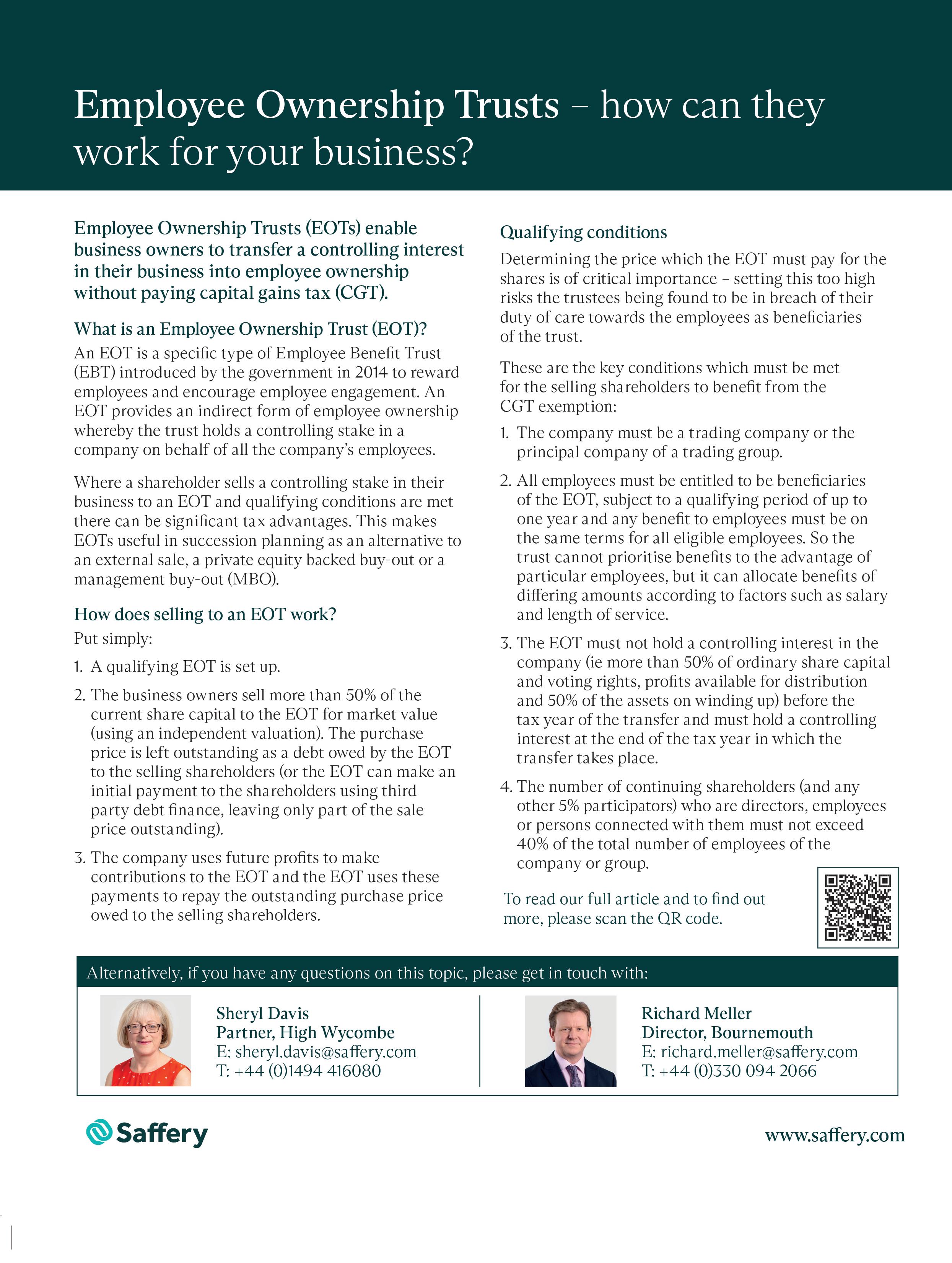

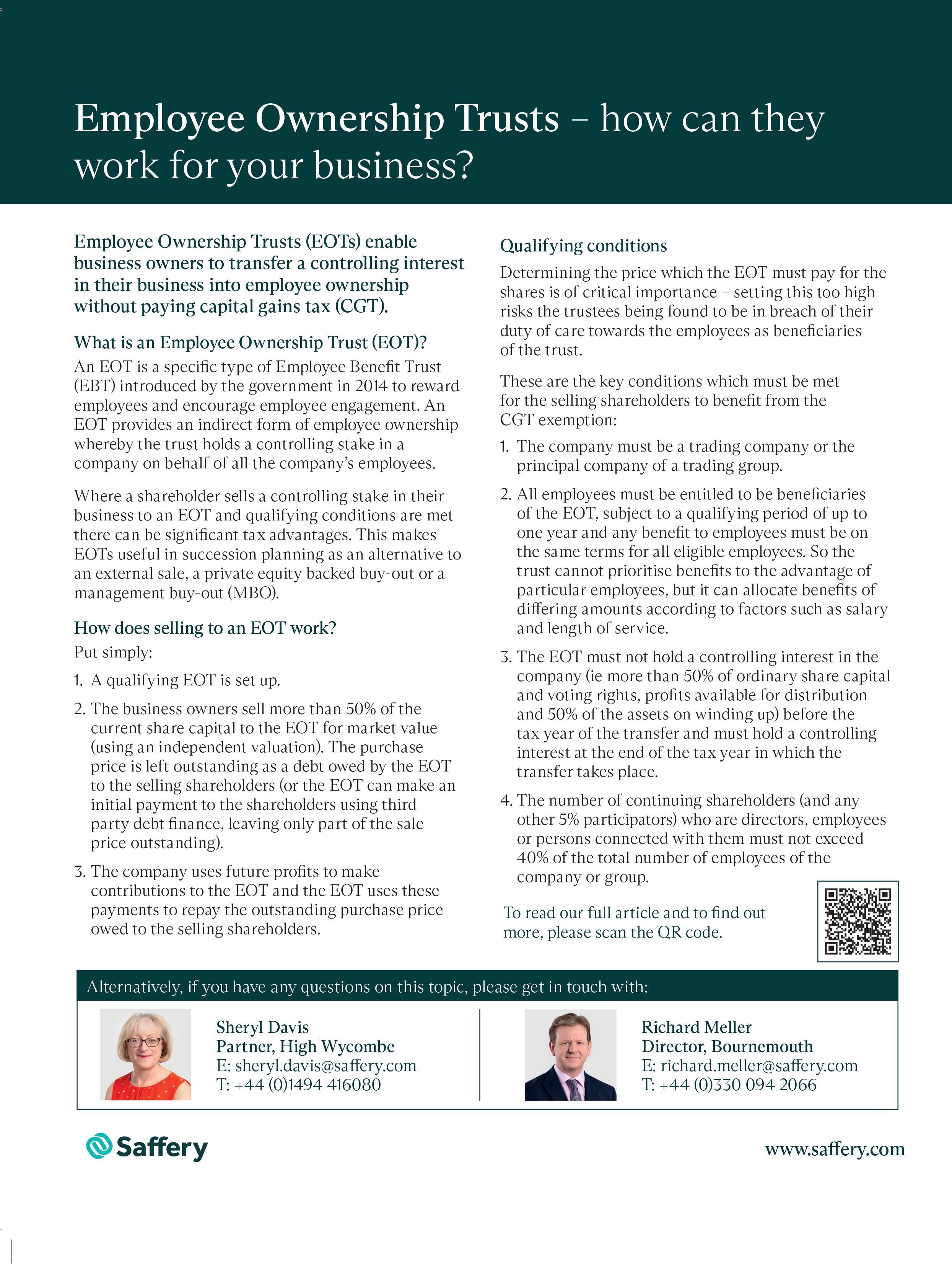
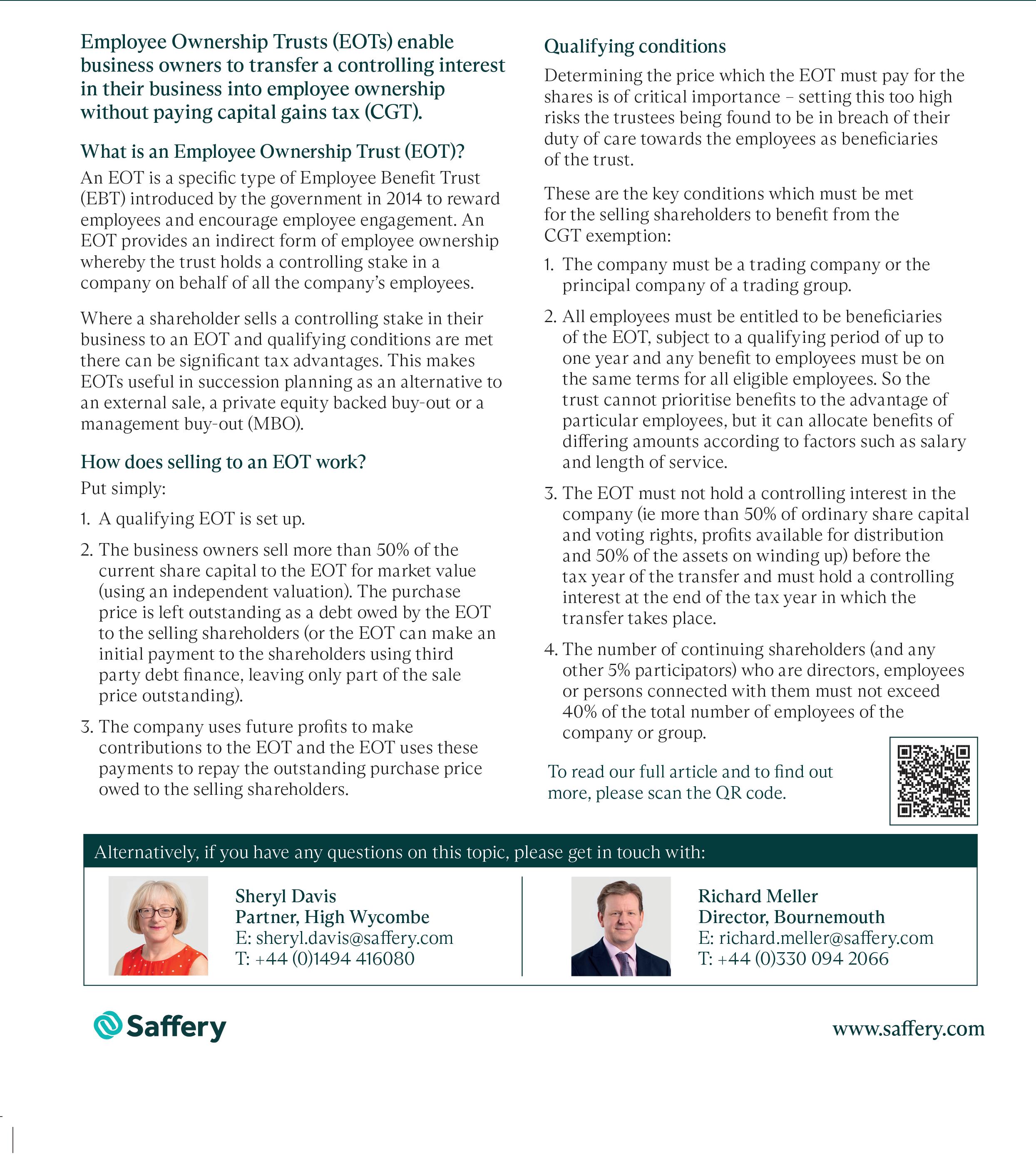
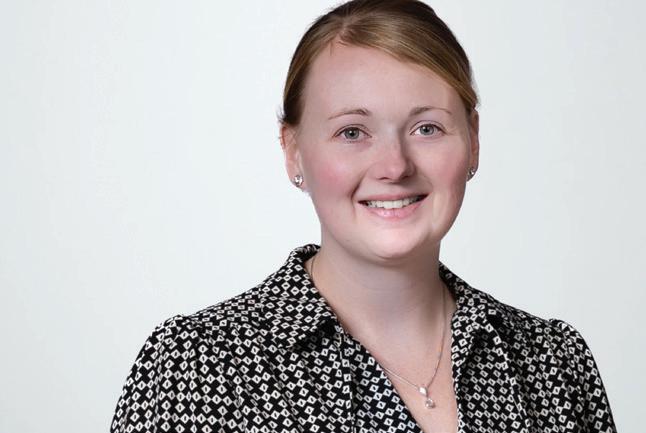
01 Gardner Leader makes property partner appointment
Law firm Gardner Leader has appointed Lauren Blackman as partner on its residential property team based at the firm’s Maidenhead office. Before joining Gardner Leader, Lauren held roles at Kite Griffin Solicitors in Bracknell.

02 Oxfordshire’s EZ-Charge promotes CTO to Director of Operations
Charge point operator EZ-Charge has promoted Peter Shadbolt to Director of Operations as part of its growth plans. Peter, previously chief technology officer, will oversee the Bicester company’s development and operations across product development, customer service, user experience and network rollout.

03 5 Villages Group adds to logistics team
Hampshire-headquartered 5 Villages Group, which operates in the logistics, distribution and manufacturing industries, has welcomed Mark Houghton. Mark brings more than 15 years’ experience in the global supply chain to his new role as managing director of 5VG’s logistics and distribution arm.
He’ll be responsible for business growth– including Hampshire brands like Drumcross and Kitson Recycling.
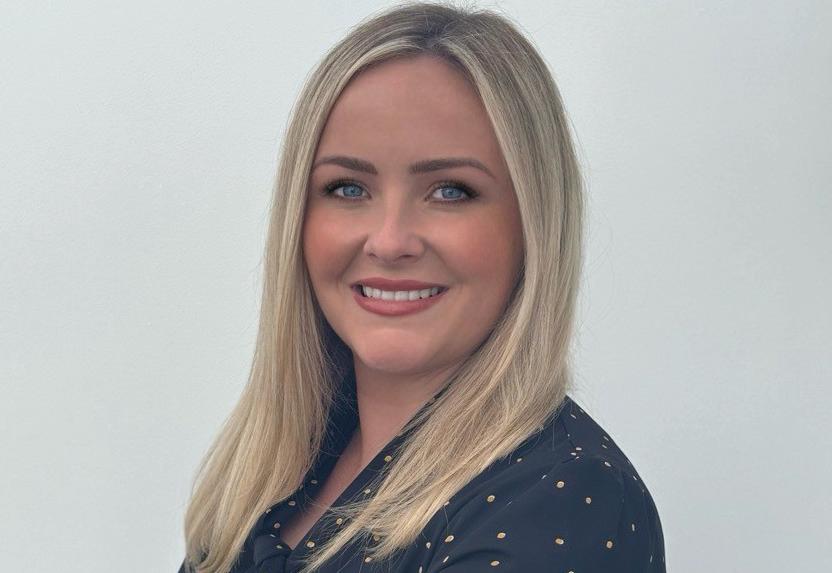
04
Evelyn Partners makes key Bournemouth appointment
Wealth management Evelyn Partners has appointed Danielle Pearce as a financial planner and leader of its Bournemouth financial planning team. Danielle provides advice to individual and corporate clients across areas including pensions, protection and investments, along with more specialist areas such as tax mitigation, trusts and estate planning.
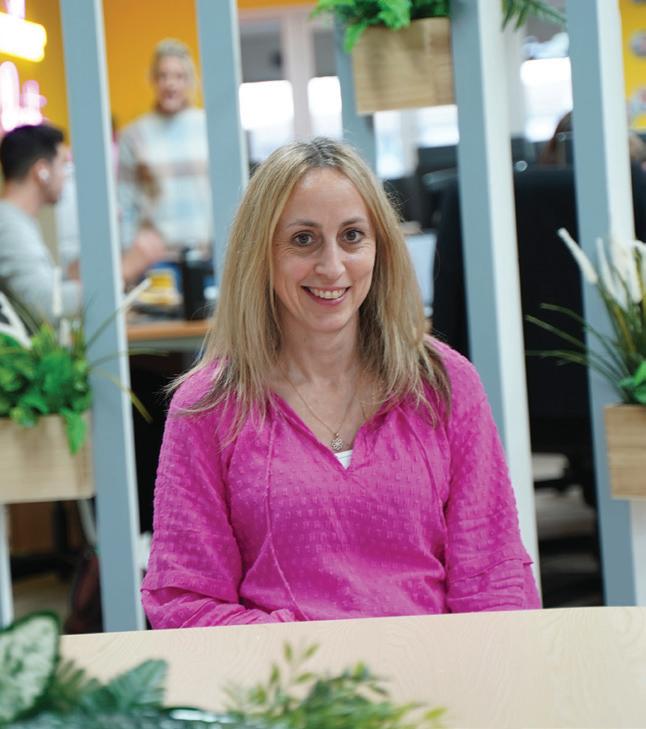
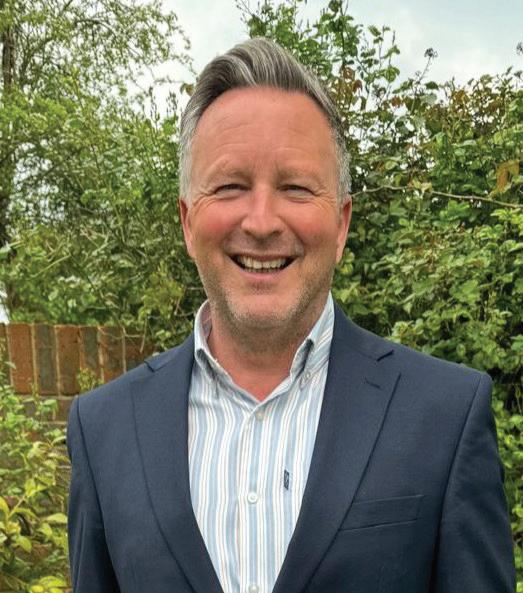
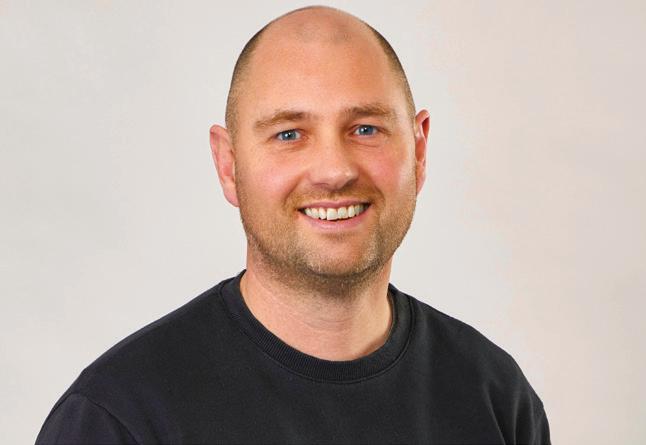
05
New MD for Southampton recruitment firm
Dan Brogan has been appointed Managing Director at 3R, a funding and back-office partner for SME recruitment businesses.
The move follows a reshuffle of the Southampton firm’s board and senior management last year, as well as its expansion into the US.
06
New CEO for Oxfordshire marketing agency
Oxfordshire marketing agency Webmart has named Kelly O’Sullivan as CEO. Kelly started her career as an account manager at the agency in 1998, before going on to hold prominent roles across other sectors.
She was head of print and publications at Sainsbury’s for more than two decades. Prior to stepping into this latest role, Kelly served as Webmart’s chief operating officer.
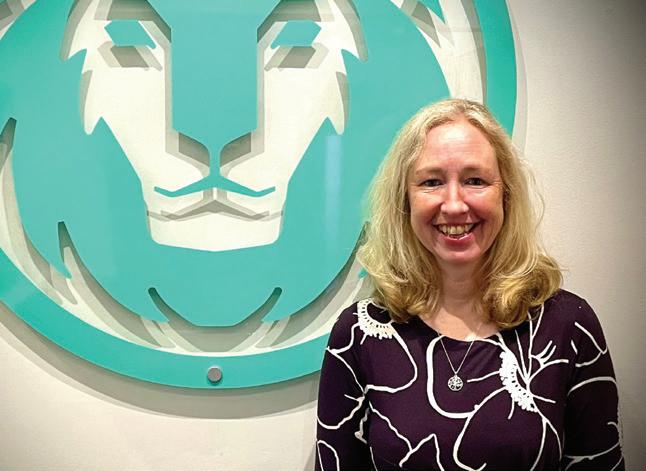
Blandy & Blandy welcomes new disputes team member
Thames Valley law firm Blandy & Blandy has welcomed Angela Bowman as a partner in its Dispute Resolution team.
Angela is a full member of the Association of Contentious Trust and Probate Specialists (ACTAPS).
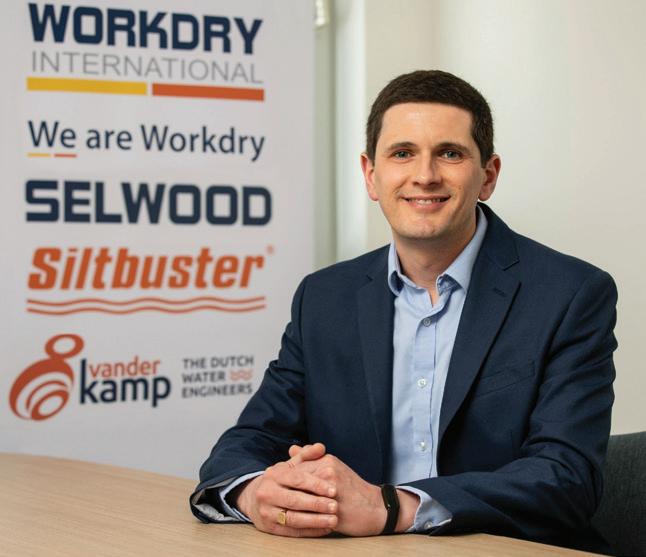
08 Workdry International appoints CEO
Dan Lee has been appointed CEO of Workdry International, an Eastleigh firm which provides engineering for the handling and treatment of water and wastewater.
He’ll work with European investors Arcus Infrastructure Partners, who have a majority shareholding in Workdry, to expand the group’s operations in the UK and Europe.
Founder of chemical surface treatment business Krystal Kleen Heritage, Dan has 15 years’ experience at the helm of high-performing asset-based industrial services businesses, including stints at Safetykleen and phs Group.

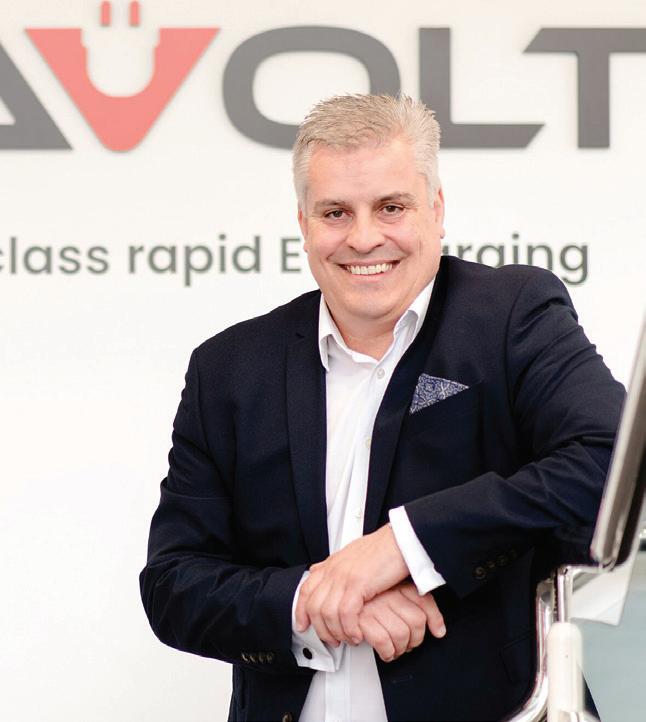
Change in leadership at Hampshire’s InstaVolt
InstaVolt, the UK’s largest rapid EV charging network, has seen a change in leadership as Adrian Keen steps down after more than seven years as Chief Executive.
As the Hampshire company gears up again for growth, Delvin Lane (pictured) has been named CEO in his place.
Delvin joins from eEnergy Group, where he was MD of energy management.
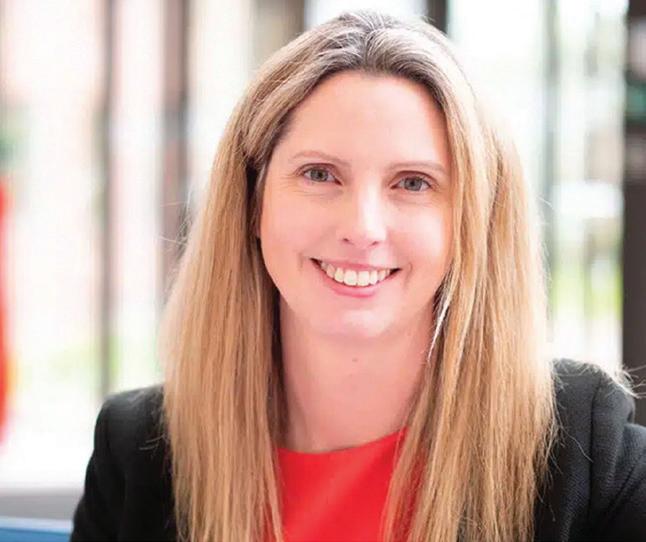
10 Moore Barlow makes key appointment to real estate team
Law firm Moore Barlow has appointed Victoria Charlesson as a senior associate within its real estate team in Southampton but will support colleagues across all the firm’s six offices with planning-related matters.
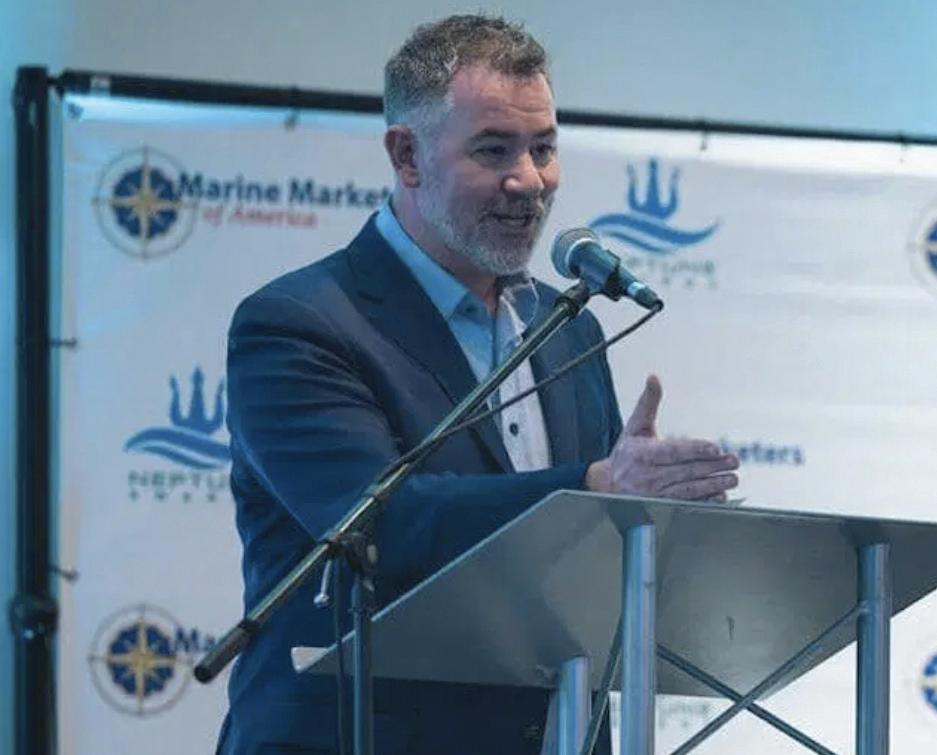
11 savvy navvy appoints strategic adviser
savvy navvy, the Dorset developer behind the ‘Google Maps for boats’ mobile app of the same name, has welcomed US-based Alisdair Martin as an adviser to its executive board.
Originally from the UK, Alisdair is a leading authority in business strategy within the marine industry.
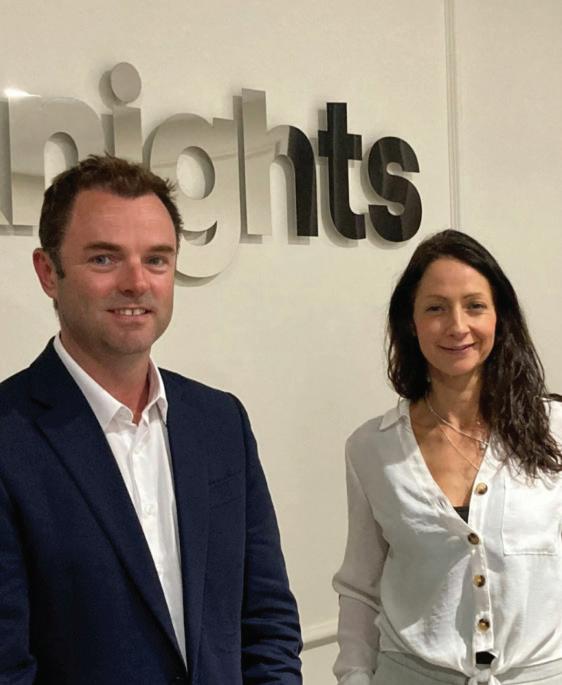
12 Knights boost East Sussex team with double appointment
Law firm Knights has bolstered its Brighton team with specialists in intellectual property and clinical negligence.
Partners Philip Partington and Elise Bevan have joined the firm taking the number of new partners in Brighton since the start of the year up to six.

New technology has potential to transform the industry, but the path ahead should be tackled with caution
Participants

Moderator
Stephen Emerson, Managing Editor, The Business Magazine
Lee Robbins, Director, CapEQ
Rebecca Combes, Partner, Evelyn Partners
Louise Jeffreys, Managing Director, Gunner & Co
Stephen Baker, Partner and Head of Dispute Resolution, Herrington Carmichael
Alex Canham, Corporate Partner, Herrington Carmichael
Mark Chapman, Commercial and Regulatory Partner, Herrington Carmichael
Matt Jenkin, Employment Partner, Herrington Carmichael
Hannah King, Legal Director, Employment, Herrington Carmichael
Marc Sevitz, Director of Accounting, Jenesys
Jeremy Hill, Director, SG Kleinwort Hambros
Guy Nieuwenhuys, Investment Director, Rockpool Investments
Luke Hanratty, Partner, Saffery
Mark Wharrier, Director, Scientific Partners
Stuart Thompson, Director, ThinCats
Dan James, Director and Head of Corporate Finance, Wilson Partners
The march of new technology has the potential to positively transform productivity in the financial services sector with the opportunities to deliver strong financial returns over the next decade.
This was the view of the participants of a roundtable organised in partnership with The Business Magazine and Herrington Carmichael at the legal firm’s headquarters in Farnborough.
The roundtable discussed how the financial services sector will be transformed by new technology, in particular Artificial Intelligence (AI), with the change also opening new opportunities for wealth generation while at the same time creating a new frontier of risk.
A report released in June by the City of London Corporation and KPMG predicted that AI could boost the UK economy by £35 billion over the next five years.
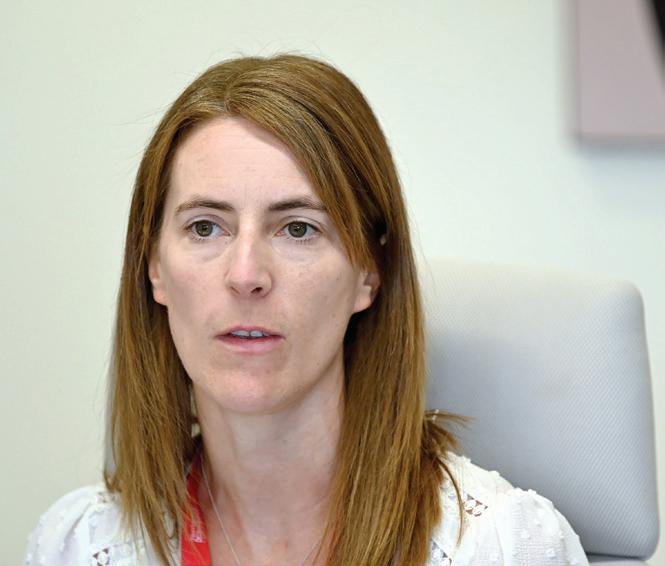
This increase across sub-sectors of financial services, including asset management and investment banking, is expected to be realised through upskilling workers’ AI proficiency and increased productivity.
The benefits of AI in improving job satisfaction were highlighted by Hannah King, Legal Director, Employment at Herrington Carmichael.
She said: “The report suggested that where AI has been introduced into elements of people’s roles, it has improved their job satisfaction in the region of 63 per cent.
“Bringing in AI into people’s roles alleviates them of the more process-driven mundane aspects, allowing them to spend more time on the fulfilling parts.
Jeremy Hill, a director at private banking and wealth management firm SG Kleinwort Hambros, said that financial services, like many industries, would be transformed by seismic changes unfolding in the technology space.
He said: “For tech, the future is unchartered and just because things have happened in the past doesn’t mean they are going to happen again.
“We are on the verge of an enormous industrial revolution and all the ingredients are there to do exceptional things.
“Whether that’s with climate change, productivity or efficiency.”
The proliferation of cloud computing, which provides the infrastructure for AI applications, has opened many new revenue opportunities according to Dan James, Director and Head of Corporate Finance at Wilson Partners.
“The adoption of cloud-based technologies has significantly accelerated over the last five years as has the need for customers to have power at their fingertips with their
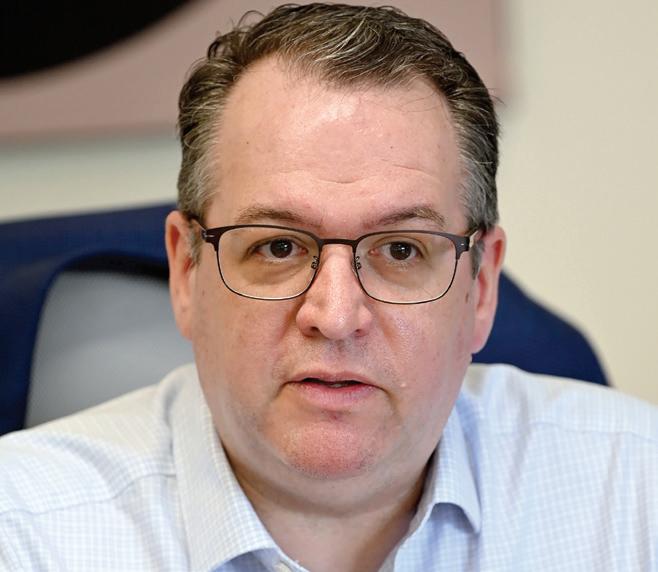
mobile, laptop or table,” he said.
“This has created new markets and new market opportunities for lots of new entrants and new sectors.
“The real opportunity, internally for us, is for AI to change the way we do things. It is an opportunity to allow people to do what they enjoy doing, to add more value, and not get bogged down with procedural tasks.”
The ability of technology to increase productivity was highlighted by Guy Nieuwenhuys, Investment Director at Rockpool Investments, who underlined the role that AI will play in market analysis.
“There are lots of opportunities to make efficiencies in the way we do things, he said.
“We focus on buy-and-build which can be quite a manual process to map the market, however there are massive opportunities around AI to improve that.
“I think there are huge opportunities and we’re only beginning to see what they look like at the moment.”
Lee Robbins, Director of Corporate Finance firm CapEQ, said that when it came to mergers and acquisitions, the speed in which AI can process data would increase efficiency and accuracy when it came to finding new targets.
He said: “It will help identify investors and buyers for clients as well as identify potential targets.
“I think that’s one of the things that the AI will do better in the future as it will cast the net wider.”
Alex Canham, Corporate Partner at Herrington Carmichael, said that increased use of AI would speed up data-heavy due diligence processes and free up advisors for strategic thinking.
He said: “From a corporate transaction context, it is going to really help with the due diligence process in terms of looking at documents and information-gathering.
“It will also help with document production, like board minutes and stock transfer forms.
“There is a clear time benefit because people can then be involved in giving more strategic advice.”
Stuart Thompson, Director at alternative lender ThinCats, said AI would help to make loan decisions quicker and reduce risk.
He said: “Most of what we do is around mergers and acquisitions. We’re not a volume-based lender and we’re probably doing about 80 deals a year into the lower mid-market space.
“I think AI will help us drive efficiencies for customers and analyse risk which ultimately means better outcomes for our customers, making the right decision quicker and also pricing more effectively.”
Rebecca Combes, Partner at Evelyn Partners, said that the financial services industry was rapidly opening up to AI and new technology, but many companies were still at the early stages of adoption.
She said: “Clients are more open to embracing digital services as it is opening up a whole new world for them and they are quite excited.
“We are already using a significant amount of AI tech within the way that we work, especially on routine compliance work.
“However, I think there is a lot of learning that has to be done for us as a firm and a profession.”

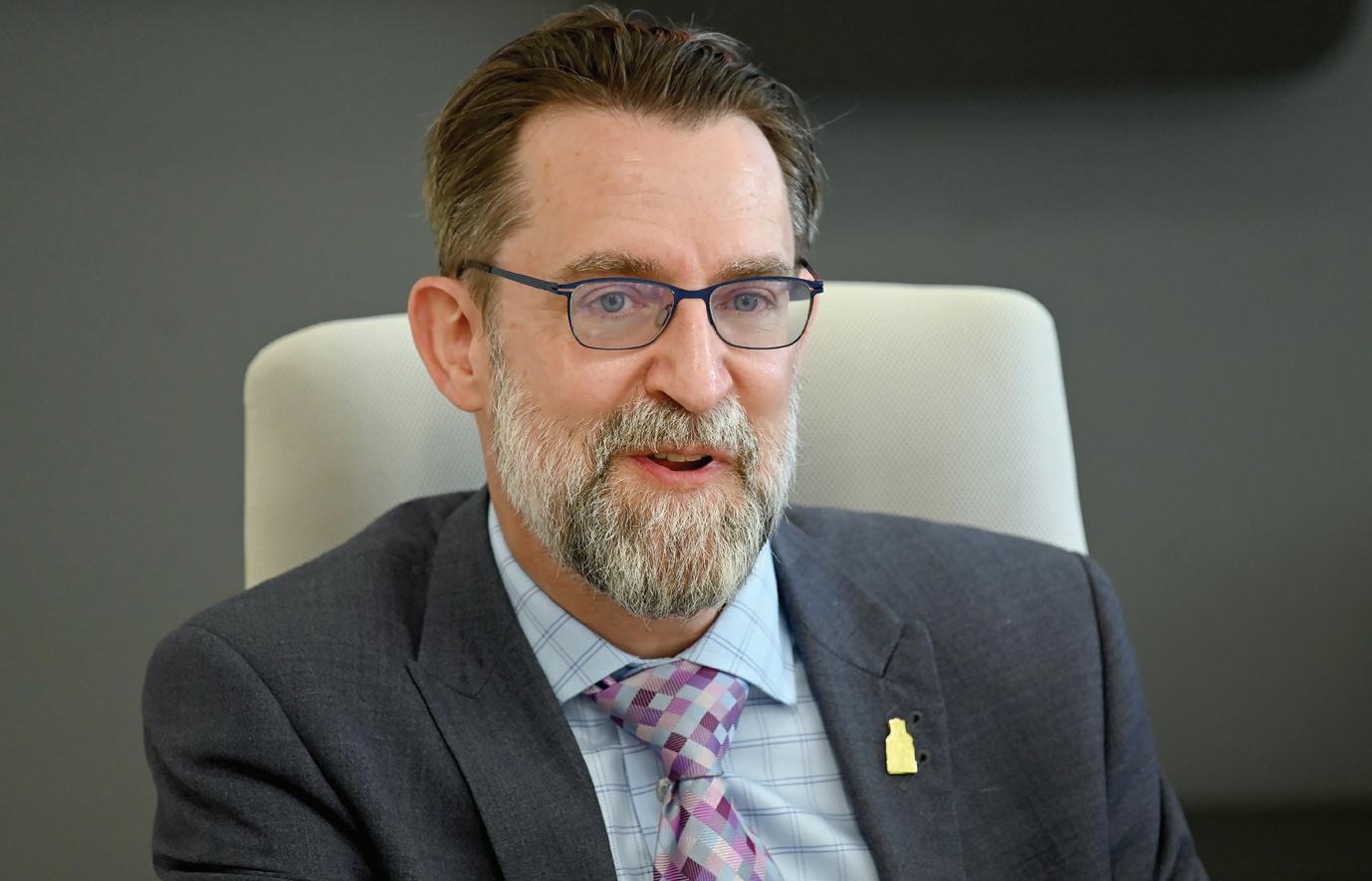
Despite the opportunities afforded by technology, caution was also sounded about the ethical use of some AI applications.
Louise Jeffreys, Managing Director at Gunner & Co, noted that in some parts of the industry, AI chatbots were being used to prospect business where it was not always clear, for the end user, that they were not dealing with a real person.
She said: “Some companies are using social media to build up initial engagement with B2B conversations then move these into the sales teams to make that real world negotiation.
“At the moment we’re quite happy to use mass email as a technology.
“I think this could be considered as an extension of that. I think being upfront with people that they are interacting with a chatbot is key so that they know what to expect and will not be disappointed.”
Stephen Baker, Partner and Head of Dispute Resolution at Herrington Carmichael, cautioned that, as Generative AI technology was still at an early stage, there was the risk of hallucinations, bias and over reliance.
AI hallucinations are incorrect or misleading results that AI models generate. These errors can be caused by many factors, including insufficient training data, incorrect assumptions made by the model,
or biases in the data used to train the model.
He said: “Some of the hallucinations can be quite amusing if you spot them but not so much if you don’t.
“The biases are rooted in the history of biases whether that is gender bias or race bias, for example.
“If the AI picks up on this then the decisions and information it is giving you could be potentially very damaging.
“We need to make sure that AI is used as a tool – like a hammer is to a blacksmith rather than as a replacement.”
Matt Jenkin, Employment Partner at Herrington Carmichael, echoed concerns over hallucinations and said that human checks on output remained vital.
We also have to consider that not only will AI be able to detect fraud, but it will also be able to commit fraud.
He added: “We’re still seeing too many hallucinations with generative AI content.
“We’re starting to see a flow of questions and advice around employment issues that are created by AI being used in the workplace.”
Luke Hanratty, Partner at accountancy firm Saffery, said the expanding use of AI would mean an increase in the complexity of fraud and this posed a due diligence challenge.
He said: “We also have to consider that not only will AI be able to detect fraud, but it will also be able to commit fraud.
“How are you going to be able to spot that when you are doing your due diligence or audit?
“It is only going to be by applying your
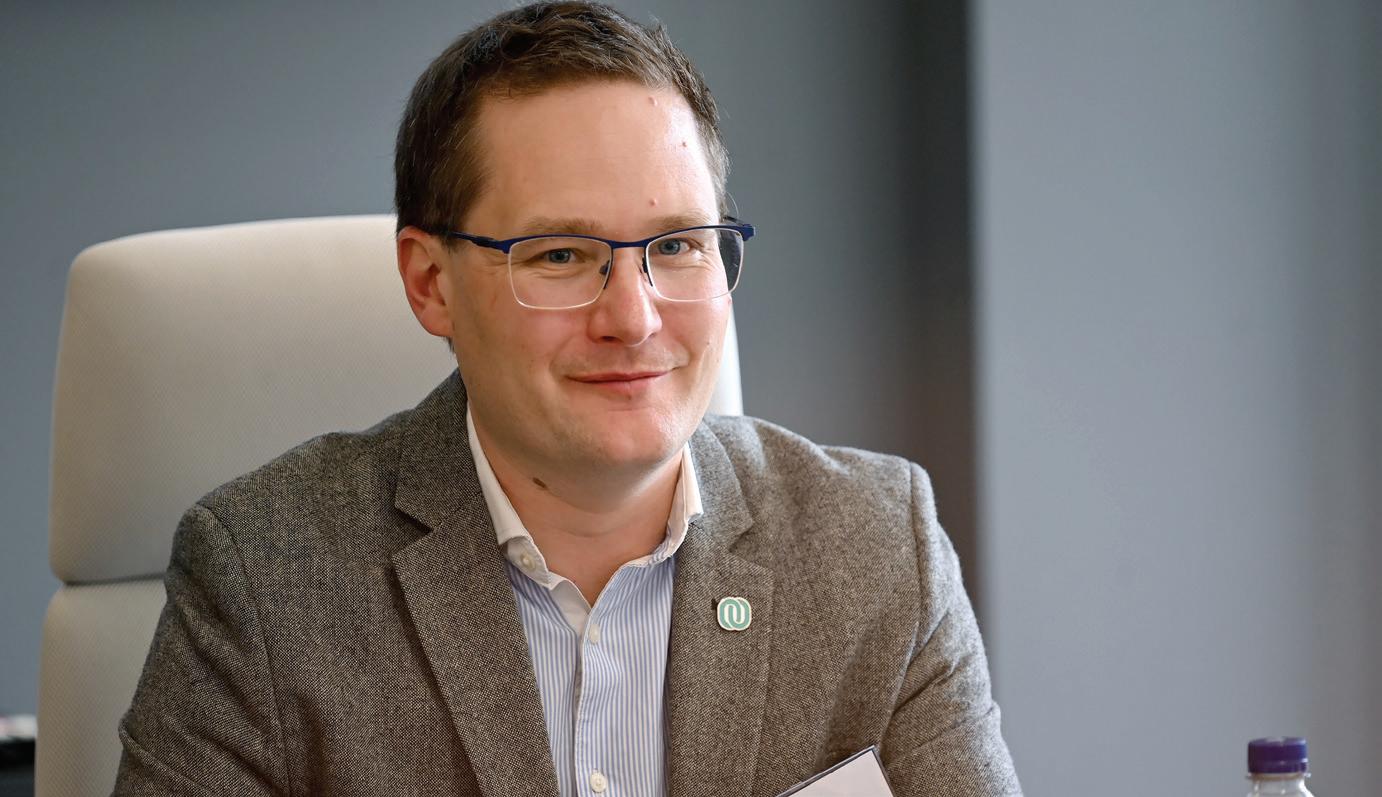
own AI so there is going to be an arms race on this front so that these threats can be identified and flagged in good time.”
The sources of data powering Generative AI models were also discussed, with questions raised by participants over data sources and the destination of input.
Saffery’s Luke Hanratty said: “It is inevitable that AI will play a bigger role in audit and due diligence. However, I think it is currently being held back by concerns over what data is going into AI models.”
Alex Canham of Herrington Carmichael also said that AI was making the due diligence process for company buyers opaque, especially when it came to intellectual property.
He said: “The due diligence landscape has changed. Traditionally people have looked at what you are selling in terms of the staff, property, key contracts but the growth of tech has changed this.
“The importance of tech due diligence is increasing. As people create more bespoke things with AI, it opens questions as to what parts of the product they own.
“Did they create it themselves? What external licenses do they have?”
The level of human involvement was a key in determining how fast AI would be rolled out in the financial services industry, according to Jeremy Hill of SG Kleinwort Hambros.
He said: “Banks like Kleinwort Hambros are 200 years old and there is a lot of legacy data as part of our fabric therefore the opportunity to speed up how we operate is huge.
“The uncertainty is around how much people want some human interaction which is an enormous call.”
Mark Chapman, Commercial and Regulatory Partner at Herrington Carmichael, expanded on the importance of human interaction when using AI in the legal profession.
He said: “We are starting to use AI to do contract reviews as it can summarise data across large volumes of documents.

“The results are still quite variable in that sometimes it can be not bad and other times it can spectacularly wrong.
“There is a balance to be had in terms of professional judgment which is key.”
Roundtable participants agreed that many mundane tasks, normally carried out by junior staff members, would increasingly be carried out by AI in the future.
However, this also raised concerns about how new recruits would learn and progress.
Dan James of Wilson Partners expanded on this point.
“Getting stuck into data and analysis is how you learn and is a valuable process, he said.
“We are potentially going to be asking people to jump straight out of qualification into being a commercial analyst without having really figured out where all the data comes from and how to put it together.
Bridging that gap could be quite challenging.”
Matt Jenkin of Herrington Carmichael also highlighted the skills shortage that, like many industries, would be increasingly felt by the financial services sector.
He said: “Trying to find AI-enabled recruits is like finding hen’s teeth at the moment. If you want to find a specialist in Chat GPT, you are going to struggle. The financial
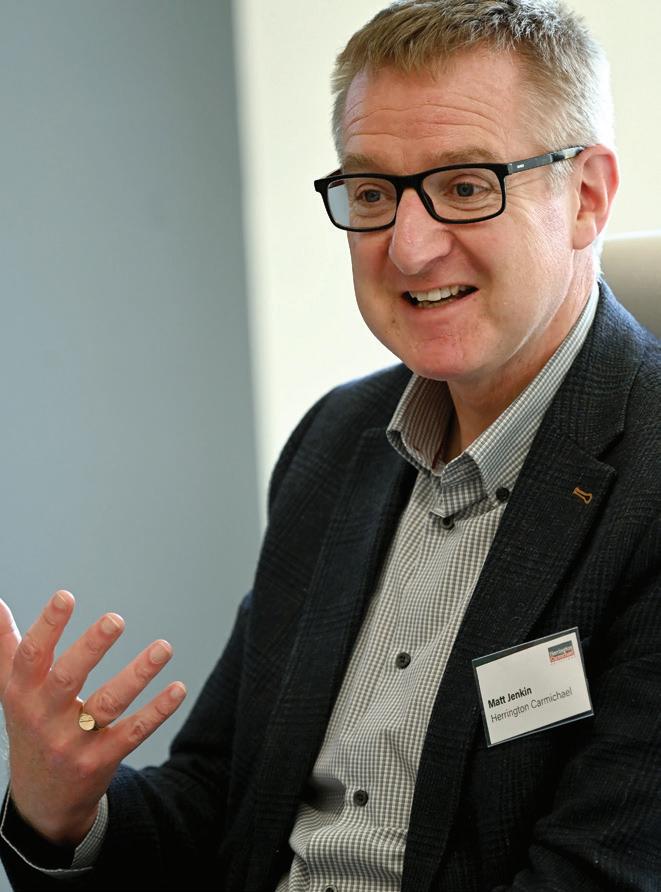
services sector is up against a hugely competitive market out there.
“Attracting talent will be challenging, especially with headlines about the impact that AI will have on the numbers of people employed in the sector.”
Director of Accounting at AI-powered bookkeeping firm Jenesys, Marc Sevitz, said that the technology his firm was developing could help with the expected tech skills shortage in the financial services sector.
He said: “For us it is important to work ethically, and we are saying let’s not use AI to replace bookkeepers and accountants but how can we help them become more efficient by getting live data to them to help shape their decisions.”

The advance of technology posed serious challenges for the UK’s Financial Conduct Authority and other financial regulators around the world.
The roundtable discussed how the regulator could keep pace with this change to protect the industry while ensuring that the UK was not left behind strategically.
Mark Chapman of Herrington Carmichael said: “From a global perspective, will country regulators be able to do what needs to be done?
“Professional bodies around the professional services, including legal and accounting, need to come together to say what they need from countrywide regulations, and these are then fed back to the regulator.
“I think the trick is to have a regulator that’s super nimble because we’re going through technological change that we have never seen before.”
Guy Nieuwenhuys of Rockpool Investments said smart regulation that adapted as AI technology progressed would be key to ensuring that the UK kept its competitive edge.
He said: “With AI and regulation, I would hope that no measures are in place that provide a shock to the system.
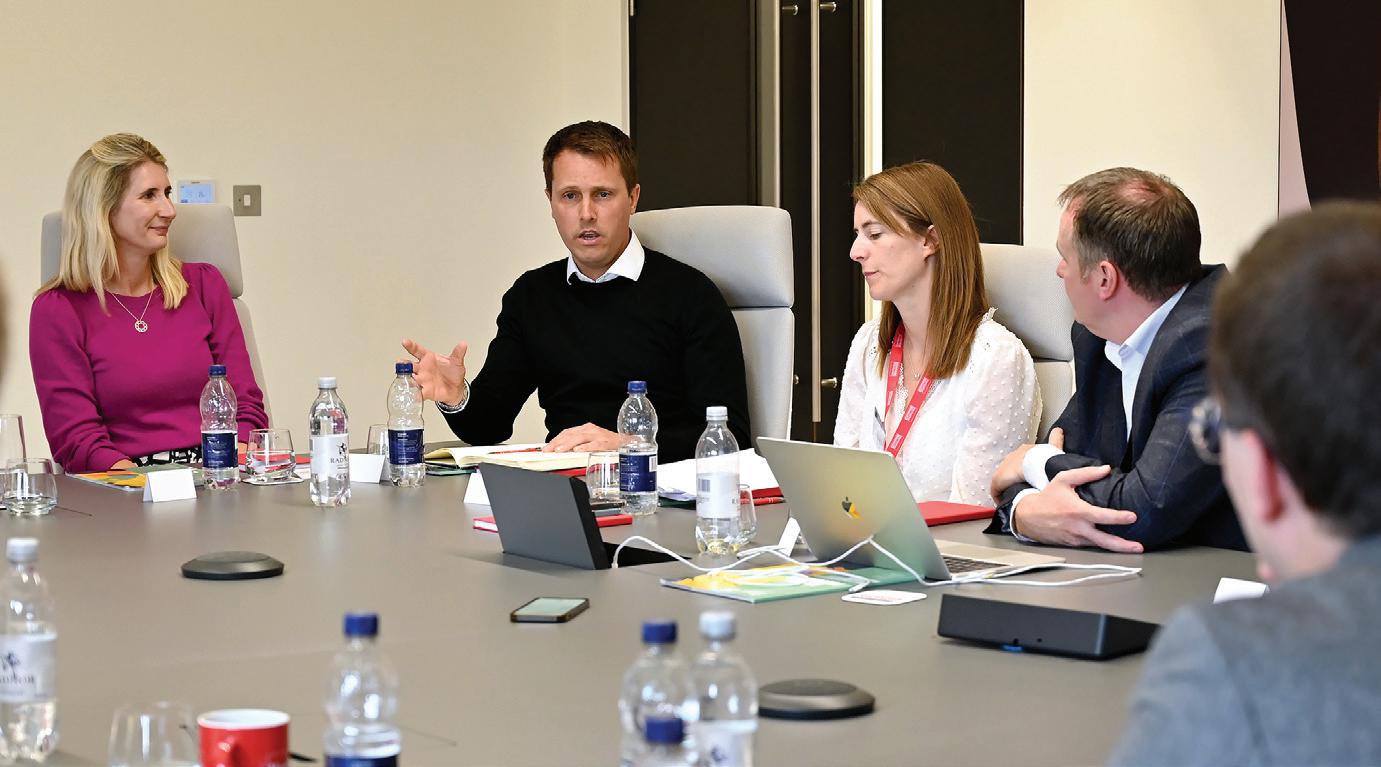
“There needs to be a gradual approach.”
Stuart Thompson said regulation around AI would hit the volume end of the financial services market first before filtering down to lenders like his own firm ThinCats.
He said: “We view the impact on AI and financial services being on the volume end of the business such as those involved in opening credit and mortgage applications.
“We see them as setting the benchmark for how AI and tech will drive this market and then that will slowly water down to us.
“We are doing 80 deals a year so we have to weigh up in terms of what the impact is going to have on our business.”
Mark Wharrier, Director of niche investment house Scientific Partners,

said that investors were increasingly considering how vulnerable target companies were to being disrupted.
He said: “I think there is a risk in any business, and you have to think about a business’s competitive advantages, how durable they are and how reliant it is on technology and people.
“It’s about how competitive a business can be in the long term. It’s not just about one factor, it’s the whole basket.”
By the time this report is published, a new government will have been elected, with pre-election polls predicting a Labour government with a comfortable majority.
The roundtable agreed that the changeover of political leaders and major events domestically and internationally over the last decade had led to uncertainty which had in turn slowed down corporate transactions.
Guy Nieuwenhuys of Rockpool Investments said: “We have had a turbulent few years with Brexit and the Liz Truss effect on interest rates.
“This unstable environment is never good for dealmaking.
“With a new government coming in, there is the opportunity to create some stability in terms of getting control of interest rates and inflation.”
Roundtable participants said they hoped that a stabilised political environment would encourage a flow in dealmaking but said that interest rates and potential rises in Capital Gains Tax remained key blockers.

Alex Canham. of Herrington Carmichael said: “I have had a lot of conversations with clients who are thinking of selling but are not quite there, in terms of making a decision.
“There is a lot of nervousness around what the next government will do with regard to Capital Gains Tax.
“Most people I have spoken to have said they are going to hold off until they have an idea of what is going on next year.”
While the Conservatives had committed to not raising Capital Gains Tax for people selling their businesses before the election, Labour had, until publication, refused to commit to a similar promise.
Louise Jeffreys of Gunner & Co said: “Over the last six years there has been uncertainty for business owners as to whether they should sell their businesses.
“In these environments, where people have owned their businesses for decades, there needs to be a catalyst to make a sale happen.
“There are enough buyers out there for the sale to be positioned as an opportunity rather than a fire sale.”

Mark Wharrier of Scientific Partners said that global uncertainty in supply chains could also create opportunities for UK companies, particularly those with a security focus.
He said: “There was a broadening out of supply chains and with Russia going into Ukraine that is going to continue.
“This should be an opportunity for companies that have national security characteristics because we are moving
towards operating in a more secured environment.
“The barriers to entry for overseas companies will become much more difficult.”
The above roundtable, produced in partnership with The Business Magazine and Herrington Carmichael, is the third in a series of roundtables with the previous two events focusing on hospitality and construction.
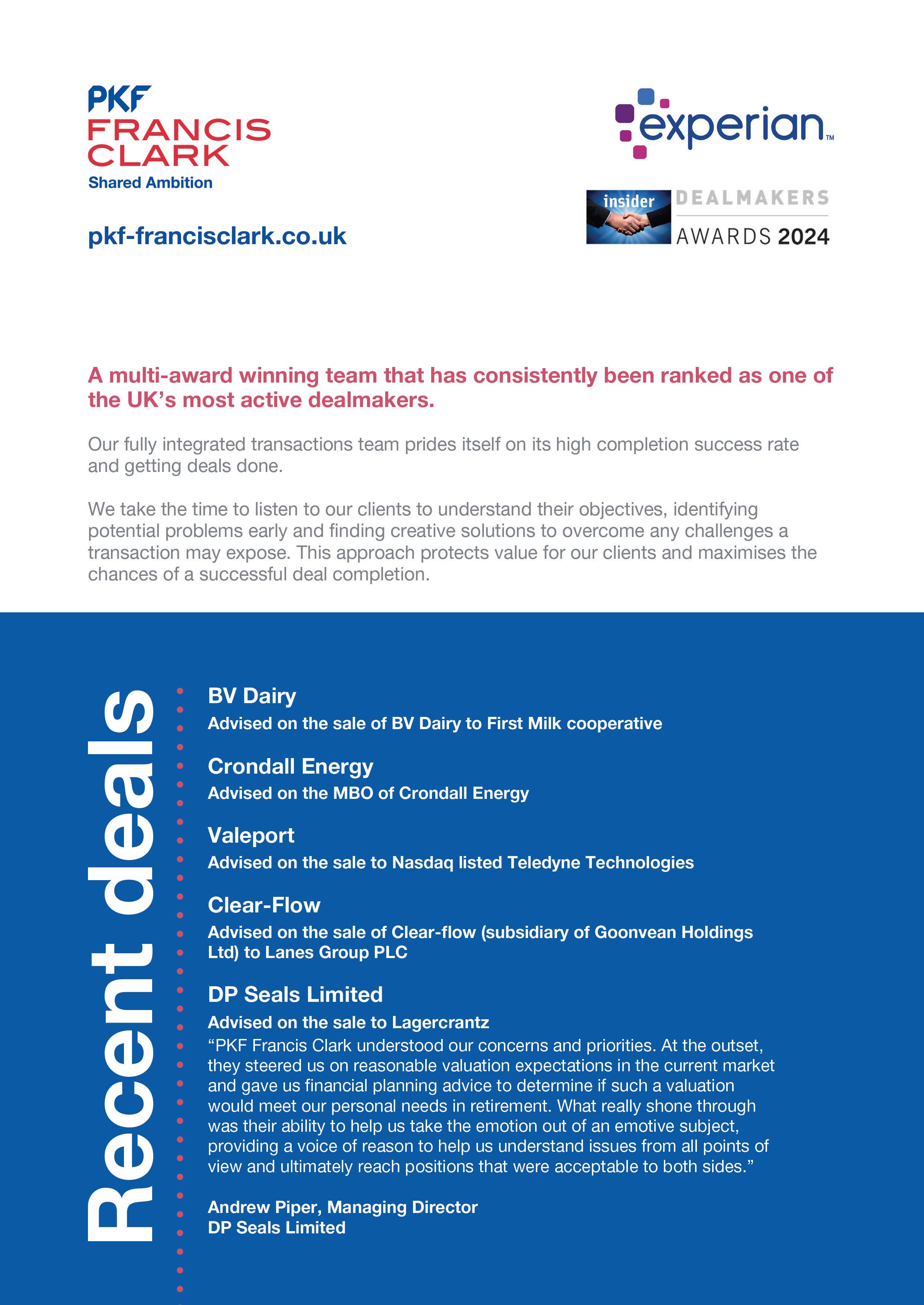
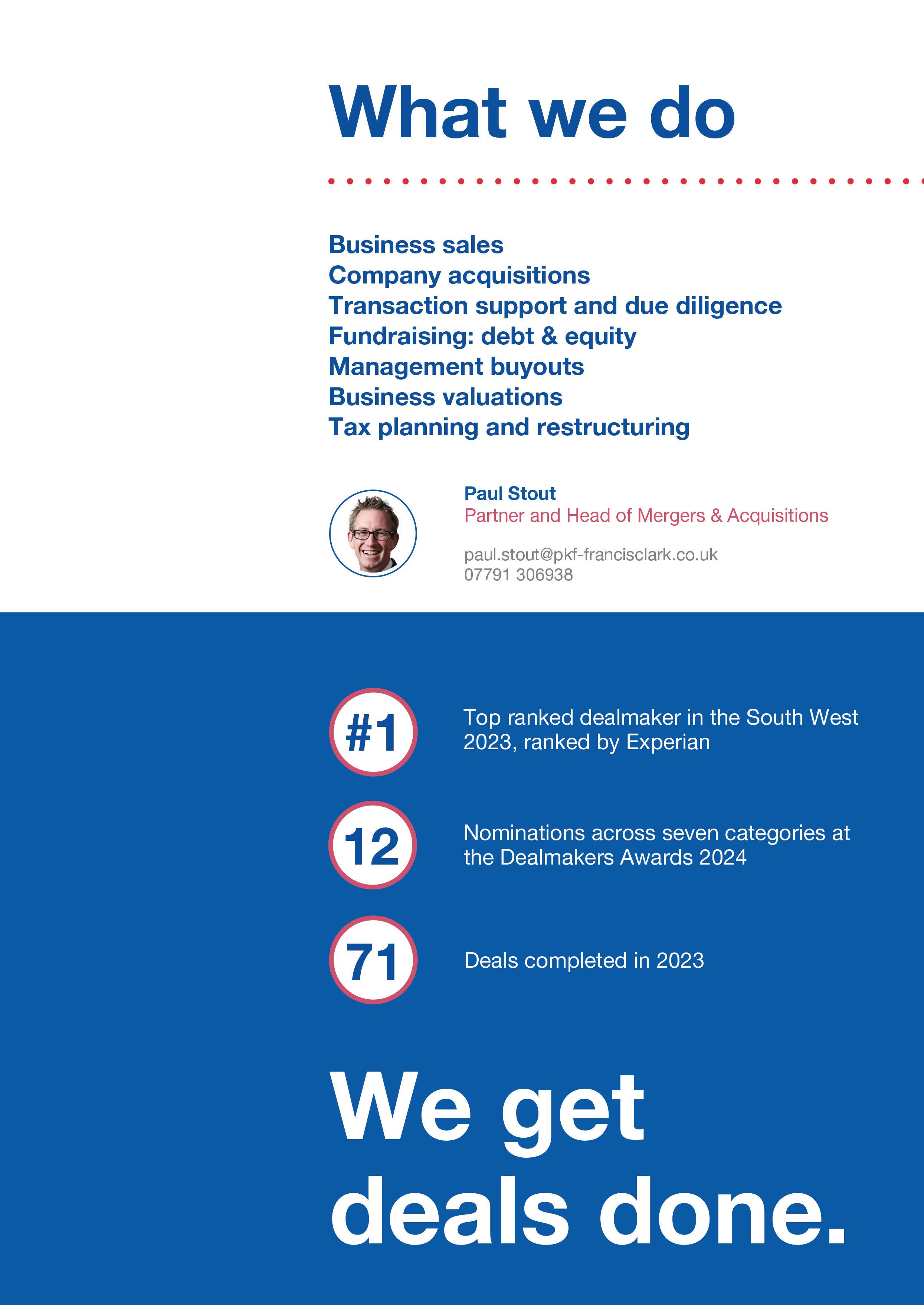
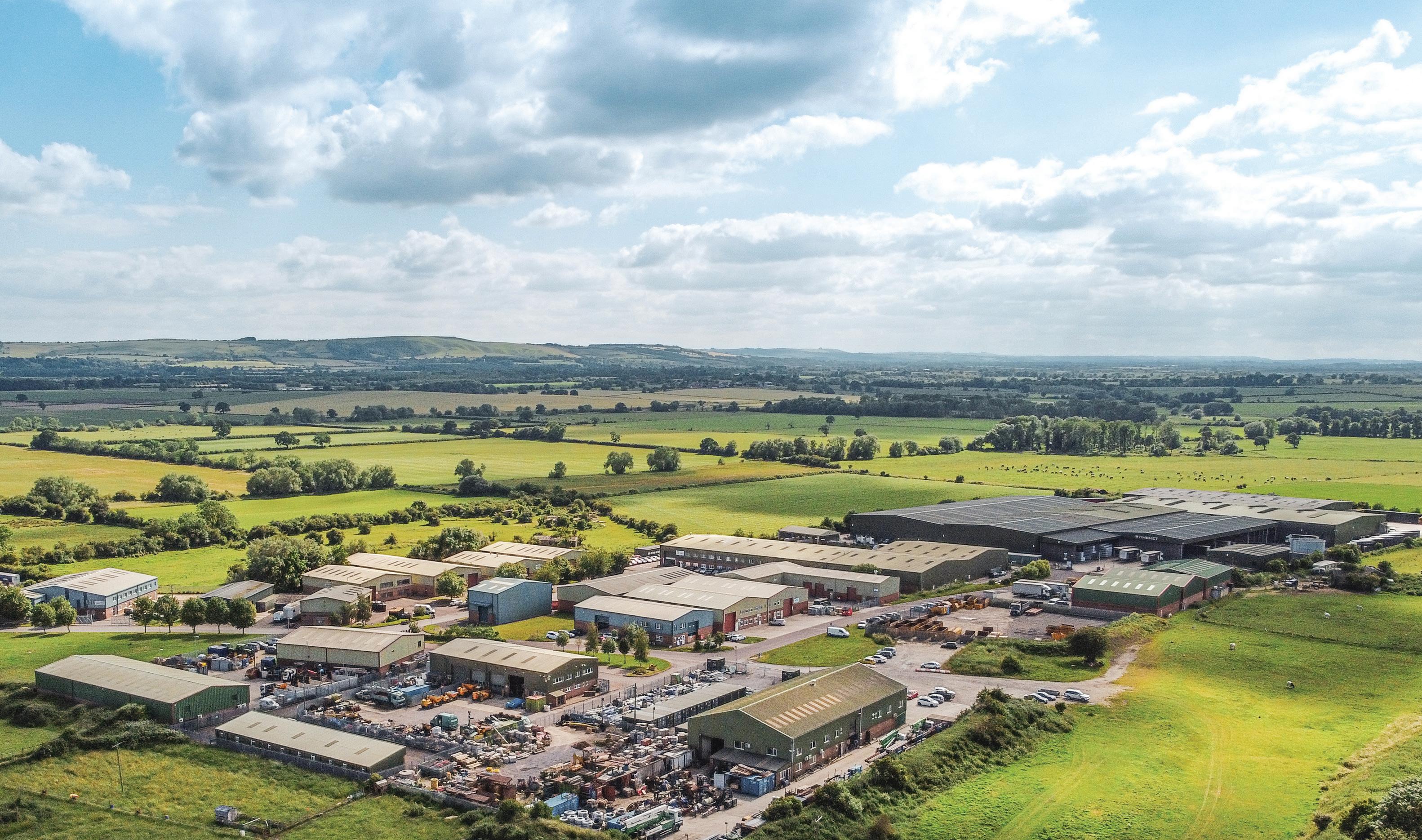
It’s not all fields and farmsteads out in the South East’s rural heartland
By Daniel Face, reporter
If images of Amazon Prime’s Clarkson’s Farm are flashing across your mind when you read the above headline, you’re not alone. The “rural economy” is just another term for agriculture – right?
Defra, the Department for Environment, Food & Rural Affairs, begs to differ. Its Statistical Digest of Rural England notes that the nation’s industrial breakdown is, in fact, ‘broadly similar’ across rural and urban areas.
Of course, that depends on how you define ‘rural’. As far as Defra is concerned, and for the purposes of this feature, we’re talking local authority districts with a majority of their population in rural areas –think small towns and villages.
Public administration, education and health tops the list in both areas, with the sector’s rural businesses accounting for around £58 billion, or 23 per cent, of the nation’s gross value added (GVA) in 2021 – the latest figures available.
Rural is relatively bigger on real estate (15 per cent) and manufacturing (13 per cent), and inevitably smaller on financial and insurance activities and professional services.
What about agriculture, forestry and
fishing? Shouldn’t that skew the breakdown? Well, a little – but only by a couple of percentage points. In 2021, the sector contributed £7.1 billion to the £270 billion GVA of rural England.
There’s far more to the rural economy than fields and farmsteads. No matter the industry, though, there’s a problem. Rural authorities are increasingly lagging behind the rest of the country, and especially London.
In 2001, rural productivity was 89 per cent of the national average. By 2020, that number had dropped to 81 per cent.
The government has a few theories as to why.
Small enterprises are far more common in rural areas, with the greatest proportion of employment occurring in businesses with between 10 and 49 staff.
And the relatively low-productivity sectors of agriculture and tourism are nonetheless big employers in rural England. Plus, the more sparsely populated an area, the less likely it is to benefit from the kind of agglomeration effects enjoyed by
urban centres with tight-knit business communities.
But there’s one major contemporary obstacle to growth which has proven even more pronounced within rural economies, and which should come as no surprise – skills.
A survey earlier this year from the National Innovation Centre for Rural Enterprise (NICRE) found that just over half of all rural businesses find it difficult to recruit or retain suitably skilled staff, compared to less than half of urban firms.
“Skills and labour availability are major challenges for rural businesses and are affecting current productivity and future growth”, said Dr Barbara Tocco, senior research associate at NICRE.
“Given the geography of rural areas and the limited pool of suitable labour locally, opportunities for skills improvement policies should concentrate efforts on facilitating collaborative action by sector and/or locality.
“Our research sheds light on the need for long-term strategies that can better address rural labour market needs, including opportunities and access to funds for skills improvement and training provision.”
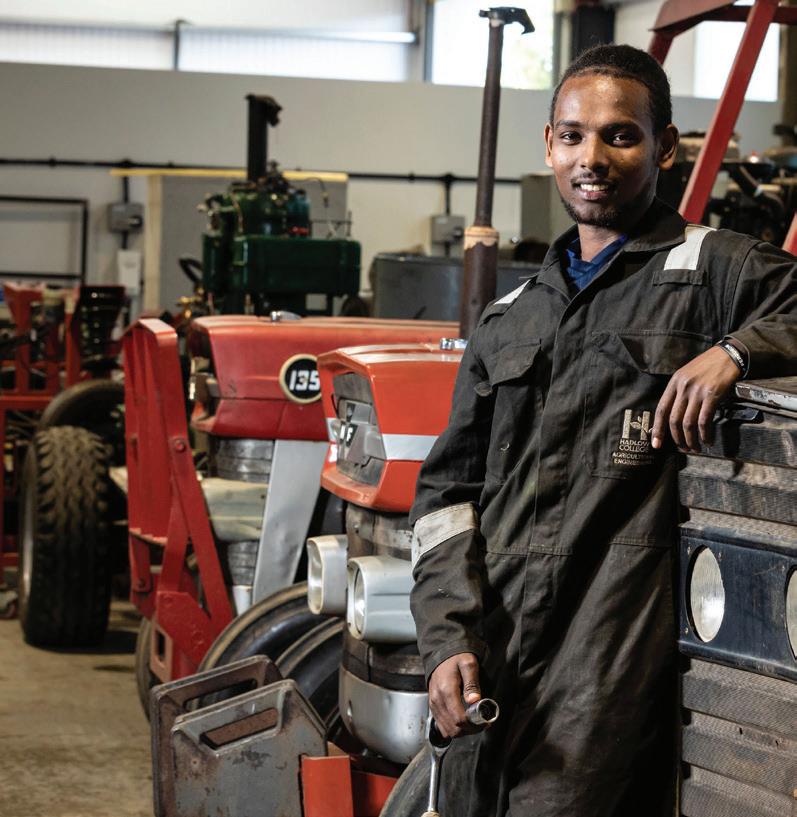
Robert Halfon, former minister for skills, apprenticeships and higher education, agreed.
“The government is increasing apprenticeship funding to £2.7 billion by the next academic year,” he said.
“Our land-based colleges are also developing the future workforce rural enterprises need.
“They’re hives of technical and vocational skills, offering high-quality T Levels in areas such as agriculture, land management and production, and skills bootcamps in various green skills.”
These colleges are spread throughout the South East – there’s Berkshire College of Agriculture, Hadlow College in Kent, Merrist Wood College in Surrey, Sparsholt College over in Hampshire and Kingston Maurward College in neighbouring Dorset.
And as we’ll see later, Plumpton College in East Sussex has cemented itself as the UK’s centre of training for winemaking.
Building solid careers is the key here. Rural employment opportunities for young people can often be seasonal, insecure and/or part-time – readily available, but short-term and lacking in future prospects.
As the former minister adds: “These training opportunities have a mutually beneficial relationship for employers and learners.
“They provide employers with a solution to tackle skills shortages and nurture a
tailored workforce, while also providing learners with a pathway to a good career and better wages.”
There’s no way around it – rural England needs investment. If you ask the Centre for Progressive Policy, a think tank championing inclusive economic growth, some of the biggest opportunities lie in manufacturing.
Last year’s Open for Business report highlighted Arun (West Sussex), Wealden (East Sussex), the Isle of Wight and Dorset as potential rural gold mines for manufacturing investment.
“Our analysis reveals many pockets of high-potential industry in small cities, towns, coastal and rural areas across the UK”, said lead author Ross Mudie.
“Encouraging business investment into these communities could transform their economic fortunes and boost the UK economy by £70 billion.
“Government has a critical role to play to create the conditions to attract business investment into these places and industries.
“A new manufacturing mission should be the backbone of an ambitious strategy to revitalise UK enterprise and deliver fair growth across the UK.”
But not everyone is prepared to wait for a top-down approach, and that’s especially true outside the big cities.
Data from Venture Forward, an annual report compiled by domain registrar GoDaddy, shows that more than 94,400 new start-ups were founded in rural England in the 12 months leading up to 2023, with 24 per cent of those based in the South East – the top region on the list.
Support for these ‘micropreneurs’ has come from Westminster in the form of the £2.6 billion Rural England Prosperity Fund, launched in 2022 to help local authorities fund capital projects for small businesses and community infrastructure.
Buckinghamshire secured a £1.8 million share of the fund, with another £2 million for Dorset, £536,000 for the Isle of Wight, £716,000 for West Oxfordshire and £598,000 for West Berkshire, to name a few.
Use cases for the funding range from investing in food processing equipment to visitor accommodation and converting farm buildings for other business applications.
That alone should go to show the sheer variety of industry spread throughout the rural South East. But if you’re not convinced, in this feature we’ll meet some thriving businesses carving out a niche in the country.


Last year saw publication of Virgin Media O2’s Great Rural Revival report, the first of four investigations into the current state of rural broadband and opportunities for the future.
Researchers found that if rural businesses across the UK had access to excellent digital connectivity, it could boost national turnover by 10.5 per cent, or £65.1 billion. Rural employment would also be expected to grow 6.8 per cent, the equivalent of 284,000 new jobs.
For farmers, better broadband enables real-time monitoring and tracking technologies for crops, soil and livestock. For factories, it could drive a new wave of automation.
Among all industries analysed in the report, it’s tourism that stands to benefit the most. The modern holidaymaker has become accustomed to app-based booking and contactless payments – both of which rely upon strong connectivity.
More importantly, though, it’s no coincidence that tourism is also the sector which has seen the strongest shift towards remote work in rural areas over the last five years, amounting to a 35 per cent increase.
The transformation may not have been as drastic as in the big cities, but there are plenty of rural residents turning to home working... only to find their broadband isn’t up to scratch.
If you want something done...
Ludo Skinner is managing director of construction at
“Our focus is on those rural areas that other operators don’t see as financially viable”, he explained. The vast majority of our competitors are overbuilding each other in dense urban centres where there’s a much lower cost to connect each property.
“For us, the simple business objective is to get ultrafast broadband to those who need it most, wherever they are.”
The story of Wessex Internet began in 2010, when founder James Gibson Fleming was looking to get a better broadband connection to his farm near Blandford.
James had been quoted £120,000 for a 300-metre leased fibre line – so he decided to connect himself up instead. Then his neighbours. Then his friends.
Two years later, he launched a joint venture with telecoms firm M12 Solutions and started to expand across North Dorset.
Nowadays, Wessex Internet operates across the county, plus Hampshire, Wiltshire and South Somerset.

James has since handed the reins to his son, Hector, but remains chair of the company. That was six years ago, before strong, stable connectivity would become all the more important for rural Britain.
“Covid was obviously a key turning point in terms of remote working”, said Ludo.
“Eighty per cent of our new customers were previously on speeds of less than 30 megabits per second.
“So it’s a complete gamechanger for the vast majority, coming from not being able to work from home to being as well connected as in a city centre office.
“And within local communities, we’re also building to small commercial estates, industrial parks and units within farm buildings – businesses of all shapes and sizes.”
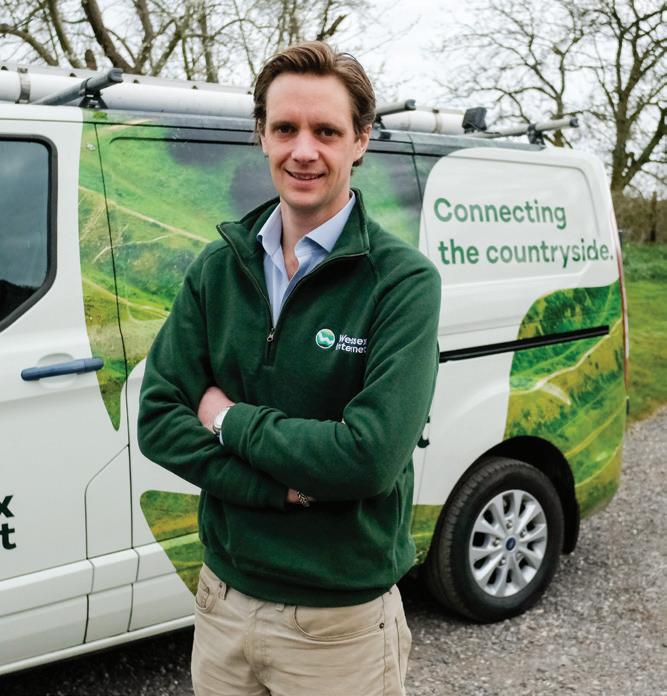
The pandemic may have accelerated take-up for Wessex Internet, but the foundations were laid back in 2018 with the introduction of the £67 million Gigabit Broadband Voucher Scheme.
Westminster began offering vouchers of up to £3,000 for small and medium-sized businesses – or £500 for residents – to help cover the costs of procuring highspeed broadband in underserved rural areas.
“That was really the first organised, largescale subsidy the government put into building a full-fibre network”, said Ludo.
“We were big advocates of the scheme, because it supported our aim to connect rural communities and gave us a financial mechanism to make that possible.
“We’d work out the funding required to connect a rural community, then encourage local businesses and individuals to sign up for the voucher scheme – so we’d get to a point where it was viable to make ultrafast internet available for everyone in that area.”
That initiative has since evolved into Project Gigabit, a £5 billion flagship scheme of the Johnson government to deliver gigabit-capable broadband to hardto-reach communities across the country.
The former PM personally awarded the very first contract of the scheme to Wessex Internet, with a remit to connect more than 7,000 properties across north Dorset by 2025.
Soon came another for the New Forest, and two more earlier this year for Wiltshire and South Somerset.

In total, these four contracts will see the company deliver full-fibre broadband to 40,000 premises over the next five years – both homes and businesses – with plans to link up another 20,000-plus incidental properties across the region.
Just because Wessex Internet is no longer reliant on locals signing up for vouchers, doesn’t mean they’re any less involved with the community today.
In fact, they say that’s exactly what separates them from the competition.
“We rely on our relationships with the communities we serve, and stakeholders at all levels, in order to grow our network”, Ludo explained.
“Our capacity to build where most other operators don’t go is completely underpinned by our ability to engage with landowners and cross private land.
“We often use methods seen in the agricultural sector rather than traditional utility installations.
“Then for each of the regions we cover, we have a community engagement manager
who’s in constant touch with parish councils, community groups – anyone that can help us explain what we’re trying to do and build interest in the service.”
Finding customers is half the mission. Just like many growing rural businesses, Wessex Internet is essentially on a nonstop recruitment drive, and engagement like this is key if they want to secure a decent share of the limited local labour pool.
“The challenge we have is growing our team fast enough”, said Ludo.
“Across our build teams we need to hire around 50 people over the year ahead.
“There are ways we can temper that through using contractors at the right levels. But ultimately, we want to keep a real grip on quality.
“It adds a huge amount more value if we can hire people who live in the communities we serve and are potential customers of ours, rather than those who won’t derive any benefit having got the fibre in the ground.”
So, with the company’s network coverage set to treble over the next five years, it’s all hands on deck – provided they can find them.

The Business Magazine last checked in with some of the South East’s leading vineyards in our May issue last year (you can still read the feature in our digital magazine online)
Needless to say, for such a fast-growing sector, a lot can happen in a year – not least the largest grape harvest the UK has ever seen.
WineGB, the national association for the British and Welsh wine industry, expects an estimated 20 to 22 million bottles to be produced from last year’s harvest. That’s up a whopping 60 per cent on Britain’s previous record yield in 2018.
A decidedly soggy summer gave way to the warmest September in almost two decades, resulting in a ‘near perfect year’ for viticulture.
The region’s winemakers have been busy capitalising on that success – buying up land, striking deals, growing international exports and, of course, winning awards for quality British-made bottles.
We’ll catch up with a few of them now.
With vineyards in Kent and West Sussex, Gusbourne has seen its international sales flourish recently, growing to 33 new markets last year alone and generating revenues of £1.5 million – 21 per cent of its total net revenue.
That global success was recognised this May as the company won its first King’s Award for Enterprise, alongside just five other Kent businesses.
CEO Jonathan White said: “We’re incredibly honoured to receive this prestigious award.
“As an English wine producer, we’re
In November 2023, wine merchants Berry Bros & Rudd joined forces in a 50/50 venture with Symington Family Estates to acquire Hambledon Vineyard in the Hampshire countryside.
For the latter, it was the producer’s first acquisition beyond Portuguese soil – but Hambledon represented ‘something very special’, said chair Johnny Symington.
continuously looking at ways to expand our distribution and awareness overseas to enable us to share the finest English wine with enthusiasts worldwide.
“I’m absolutely thrilled to be leading such a thriving, dynamic wine producer, and want to thank everyone at Gusbourne for their ongoing commitment to driving our business forwards.”
Right now, that means growing the company’s footprint for the first time since 2015, as Gusbourne looks to plant an additional 59 hectares across its two vineyards.
With new owners has come a new managing director, as James Osborn –formerly of the English wine consultancy team at real estate consultancy Knight Frank, and onetime head of Squerryes Wine Estate in Kent – steps up to lead the company into the future.
Not only that, but in May, Hambledon secured a £10 million facility from Secure Trust Bank to fund a new visitor centre and break into the UK’s burgeoning ‘oenotourism’ sector.
The money will also help the estate boost its market share both at home and overseas.

Last year’s bumper harvest translated to big sales at Chapel Down, with revenues up 15 per cent at £17.9 million.
The end of 2023 saw the Kent winery join the alternative investment market (AIM) – ‘testament to the maturity of the business and the growth we anticipate in the years ahead’, said CEO Andrew Carter.
“Last year was a landmark year for English wine and Chapel Down. We have the leading brand, the deepest distribution which we continue to expand at pace, and we continue to win international acclaim for the quality of our wines.”
The company is looking forward to another round of double-digit sales growth next year, though forecasts ‘a more typical harvest’.
In the meantime, Chapel Down is set to grow its area share of the UK’s vineyards to almost 10 per cent with the planting of Boxley Abbey and Buckwell on the North Downs of Kent.
And last summer, the team secured permission for a new £32 million development at Canterbury Business Park comprising an 11,900 sq m winery and up to 8,000 sq m of warehousing.

WineGB held its annual conference this April at Plumpton College, East Sussex –the UK’s centre of training for winemaking. In attendance was the then environment secretary Steve Barclay with some good news for the future of the sector.
“Around 2,300 people work in the British wine industry, with a further 8,300 people employed part-time,” he said. “Those numbers are expected to grow by 50 per cent next year.”
To that end, the government has launched the Future Winemakers’ Scheme, a £1.5 million initiative to educate and train up-and-coming viticulturists in the South East.
The funding will go towards the delivery of new courses at Plumpton, which teaches all ages from 14-16 right up to adults looking to reskill.
Sam Linter, the college’s director of wine, also serves as chair of WineGB.
“As we look towards the future of the UK wine industry, empowering the next generation of people working in the industry at all levels is not just an
investment in individuals, but a strategic move towards driving innovation and sustainable growth within the sector”, she said.
“By prioritising training and development initiatives, we’re nurturing a talent pipeline that will shape the landscape of winemaking and vine growing, elevate quality standards and reinforce the UK’s position to becoming a key player in the global wine market.”
Alongside the announcement came a series of proposals aimed at reforming legacy EU laws to better support British producers.
Among them were new rules to allow no and low alcohol wine to be produced and marketed as wine in response to fastgrowing consumer demand.
The government could also permit UK businesses to carbonate and sweeten imported wine on home soil, as well as improve wine labelling rules to ensure that the term ‘British wine’ only applies to products made here with British-grown grapes.
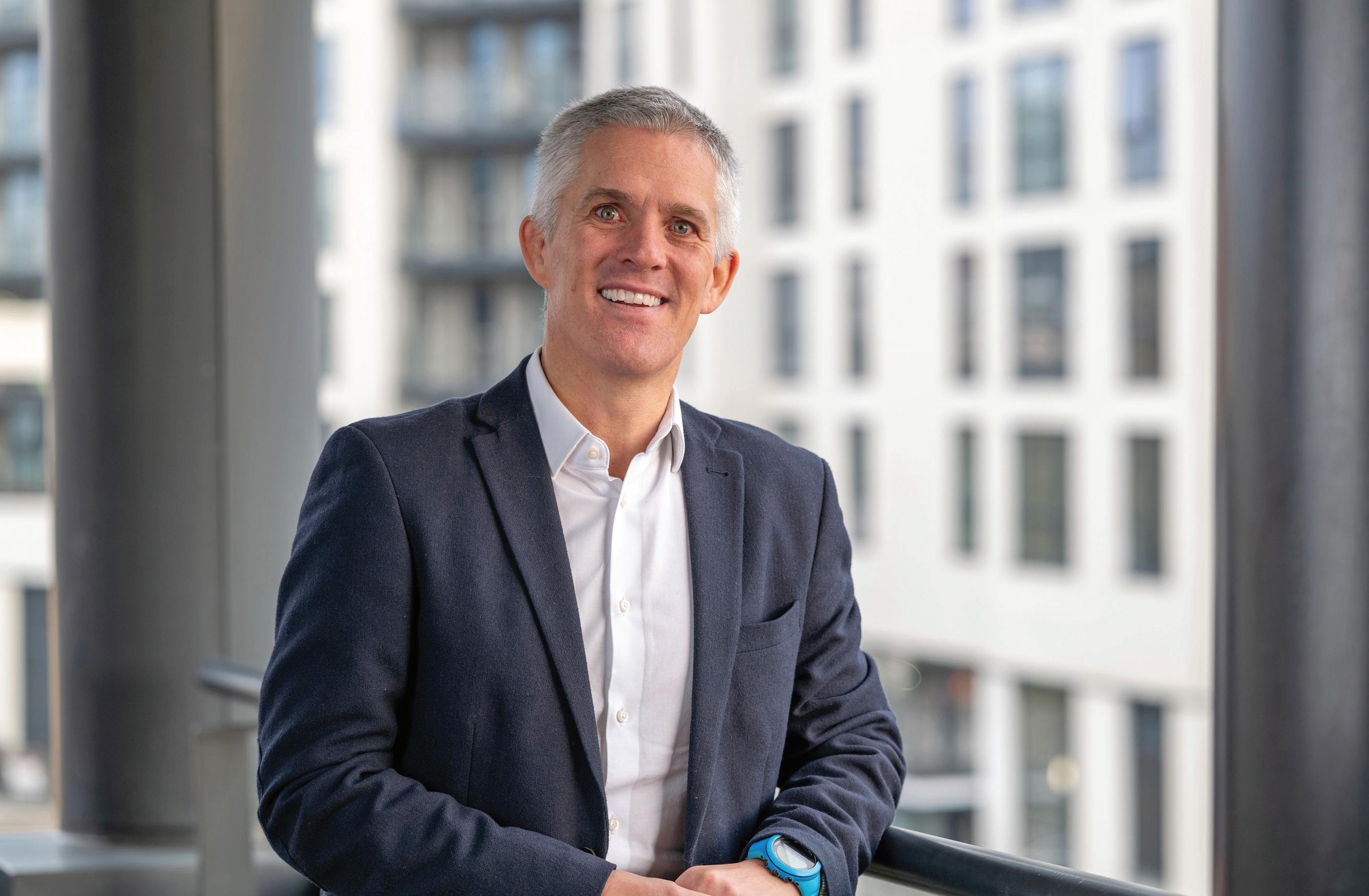
In the first of a series of articles from accountants and business advisors, BDO LLP, regional managing partner Steve Le Bas asks: Is the future bright enough for the Central South?
There’s a real sense of optimism around the Central South right now. Positioned as the UK’s global gateway, there’s been a concerted effort by organisations and partnerships, such as The Solent Cluster, Solent Partners, Business South and the local LEPs, to capture and promote what makes the Central South a unique place to do business.
With an enviable coastal location, proximity to London, and unrivalled connectivity, we’ve already achieved so much. The region has produced five unicorn businesses since 1998 and can boast one of the UK’s largest listings on the US stock market in recent years.
There are centres of excellence across the Central South and by taking these building blocks and putting them together, before you know it, you have something far greater than the sum of its parts. The case for collaboration is strong. We’ve
seen other regions in the UK embrace this model to create geographical powerhouses and sector clusters, which has made them more attractive for inward investment, created jobs and fuelled economic growth.
The fact that an increasing number of people refer to the Central South – in and outside the region – is a significant step forward, but there’s still a way to go in defining our identity and exact reach. The number one priority needs to be establishing a cohesive vision and driving force to create enough momentum so our leaders, partnerships and businesses can all work together to succeed.
According to BDO’s bi-monthly Economic Engine survey of 500 mid-sized businesses, which looks at the challenges and opportunities facing UK companies with a turnover between £10m-£300m,
29% of businesses in the Central South shared the biggest challenge facing their business over the next six months is recruitment.
Access to talent is proving a barrier to growth in terms of attracting specific skillsets and the number of people they need to hire. We are, however, in the fortunate position of being home to six high-quality universities in the Central South region, so we’ve got some real good talent coming through. The region is a fantastic place to live and work so with the right strategy, we have the potential to retain and attract the top talent needed to power the businesses looking to expand here.
There are also some interesting upskilling initiatives locally like Solent Partners’ Solent Skills Bootcamps which are giving employers and the self-employed the opportunity to retrain, upskill, and fill vacancies. Targeted at adults aged 19 and
over, the aim is to provide participants with flexible training around new skills to help develop their career.
Investment in place I started by saying how well connected we are, but there’s work to be done to improve digital connectivity and technology capabilities. To thrive in future, we’ll need to keep pace with technological change, and we’d hope to see investment in improving internet connectivity on trains between our cities and the rest of the UK.
We’ve had some tremendous investment into regeneration projects in the region across areas such as Christchurch, Portsmouth and Poole, but this will need to be an ongoing commitment from local and central government working together so the region can reach its full potential.
As I write this, we don’t know the outcome of the general election or future for local leadership, but we may see more devolution to help deliver the future vision.
In my role, I see how our teams at BDO and the wider business community are all so personally invested in the Central South so there’s no lack of drive or willingness to see the region grow and develop. It’s such a good place to do business with plenty of opportunities, which is why we’ve made a long-term commitment to BDO’s presence in the region with the investment into our offices in Southampton. We will also continue to invest in our people in the Central South because they are crucial to the future success of our business. In turn, this means businesses looking to access new markets and grow can access the specialist expertise in our local teams and global network to support their ambitions.
It is our combined ambition and success that will be key to boosting the Central South’s wider economic prospects too. We’ve achieved so much as a region without this to date – imagine how bright the future could be if we put individual agendas aside and create a real powerhouse in terms of investment and profile.
For more information contact steve.lebas@bdo.co.uk
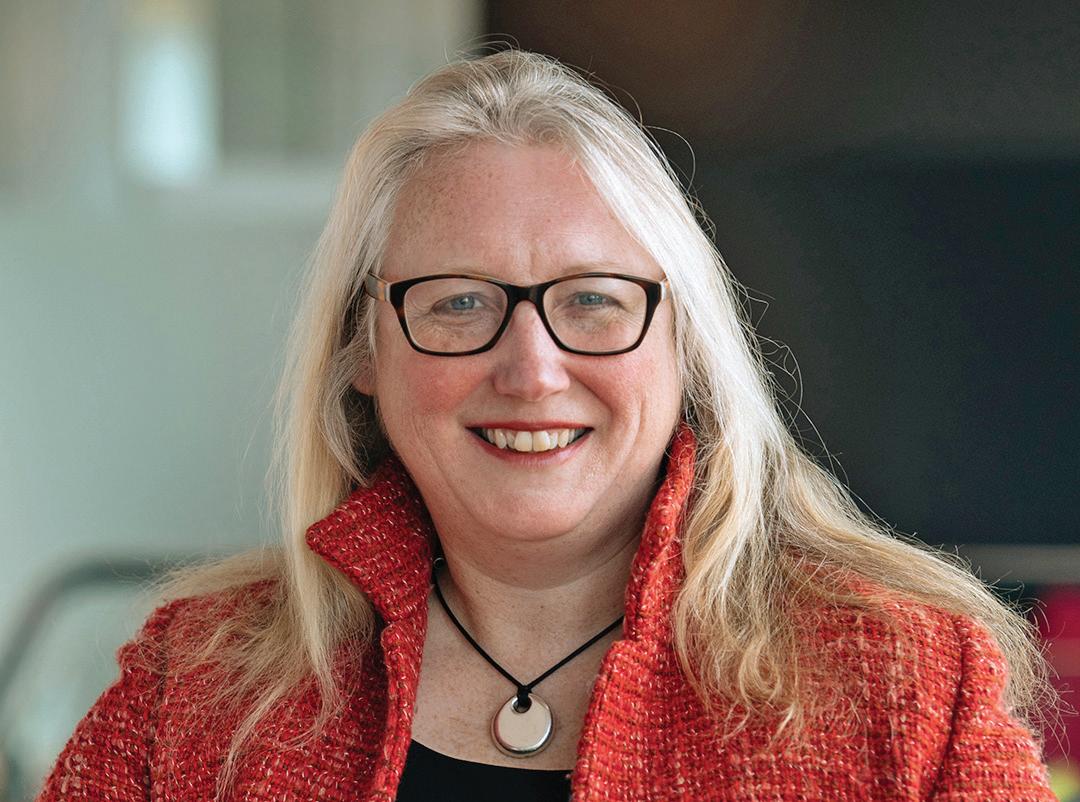
Irene Graham, CEO at the ScaleUp Institute, looks to the future for high-growth businesses in the Central South.
The ScaleUp Institute was established to ensure the UK is not only a good place to start a business but to scale a business and for the past ten years has been tracking what businesses need to accelerate growth.
The Central South is home to 1,675 scaleups growing at 20% or more each year, providing 160,000 jobs and generating combined sales of £27 billion. There’s a good mix of sectors in this growth stage in the region from retail & wholesale, and professional services, as well as a growing number in science, tech and industrials.
Seven in ten businesses in the region tell us they are looking for better access to markets. To meet this demand, enhanced collaboration between government, corporations, and universities/business schools with the local scaleup community is essential. Building physical clusters and hubs that encompass these entities, fostering greater connectivity, will help investment flow, enhance talent development and provide access to research and development opportunities. This approach will also help to build a distinct identity for the regional scaleup ecosystem.
Central South business owners are hungry to grow with 80% telling us they want to export and expand in international markets so would benefit from more dedicated trade missions and proactive relationship management to support international trade and help them identify customers overseas.
We’re upbeat about the future for scaleups in the Central South. There’s so much potential for more growth and this can’t be achieved by any one alone. If the region establishes a strong overall vision and a brand for scaleup services within the Central South, greater collaboration will make the region a key player in making the UK the best place in the world to scale up a business.
As a lead partner to the ScaleUp Institute, BDO is working alongside the London Stock Exchange, BGF, British Business Bank, Innovate UK and others supporting the ScaleUp Britain campaign to drive the growth agenda.


by Stephen Emerson, Managing Editor
The chief executive of Reading’s Economy and Destination Agency (REDA), says collaboration between businesses is key to town’s future growth
When on holiday, Nigel Horton-Baker will seek out what lies beyond the tourist zones, and by the end of his vacation he will have a picture of how the city flows and the reasons behind its successes and challenges.
A town planner by profession, it is a fascination about what makes places tick that has kept REDA’s (Reading’s Economy & Destination Agency) Chief Executive in the economic development and town regeneration game for nearly four decades.
Nigel said: “I like to get behind the scenes, away from the touristy bits to see how places tick.”
A Leeds lad, Nigel’s career has included economic development roles across local authorities in Reading, East Sussex, the West Midlands, Surrey and London.
He also had a spell as Vice-Chair of the South East Regional Assembly (SEERA) and
says he is proud of its legacy contribution to regional spatial planning, alongside the South East Economic Development Agency contribution to regional economic development
However, it is with REDA, formerly Reading UK CIC (Community Interest Company), where Nigel has been since 2013 and enjoyed considerable success.
His links with Reading came earlier, though, graduating from Reading University in Management Studies in the late nineties, and representing the Regional Development Agency SEEDA as a board member of Reading UK from 2008.
REDA enjoys strong support from Reading’s business community. This year it received backing for its Reading Central Business Improvement District (BID) and Abbey Quarter BID. The five-year plans were voted in by 88 per cent and 93 per cent respectively of businesses that voted.
REDA first won the support of businesses in 2007, as Reading UK – one of the first BIDs outside London - and now only one of seven boasting a fifth term. Founded and backed by council funding, it has increasingly become self-funded due to increasing pressures on the public purse.
But it continues to work with Reading Borough Council, often delivering employment and skills programmes with money the council is able to secure from government and private sector sources.
Today, the agency is backed by business contributions, government grants and its 22-strong board made up of leading figures from local, national and international companies based in the town. It represents the interests of more than 600 businesses across the Reading Central and Abbey Quarter BID areas.
REDA led the development of the Reading 2050 City Vision, alongside design

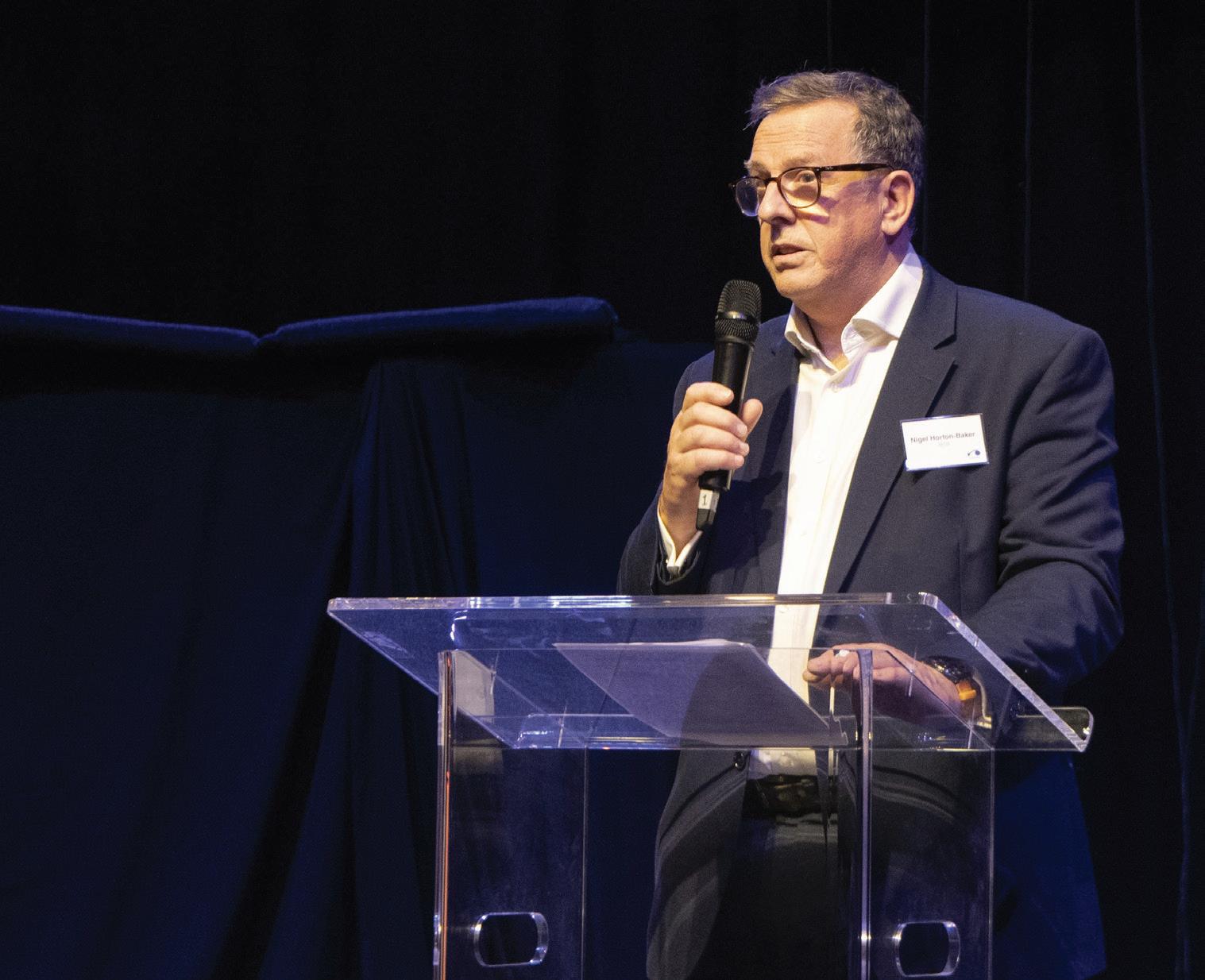
The film sector is a great opportunity to associate with Reading, with yet another global multi-billion pound industry which could further grow our economy
consultants Barton Willmore (now Stantec) and the University of Reading, which aims to encourage sustainable economic growth and create a smart and environmentally sustainable city.
Since Nigel’s appointment in 2013, REDA’s turnover has increased from £450,000 to £2.5 million, with staff rising from four to 10 people.
It is investing more than £1.5 million in keeping the town centre safe, clean, attractive, sustainable and a great place to work, visit and live.
Last year REDA also invested in 20 new small businesses with training, and provided start-up grants of up to £1,000 per business. Year on year, REDA supports thousands of local residents with employment advice, providing up to 4,000 schoolchildren with access to career advice and problem solving projects from local businesses
Reading has transformed from its beer, bulbs and biscuits reputation to a tech
hub which has matured into a diverse ecosystem of digital, big IT, financial and professional services, energy and life sciences firms.
But what comes next? Nigel and REDA’s members are keen to tap into supply chain opportunities that Reading’s film industry will bring, including an estimated 3,000 or more jobs for the greater Reading area
Nigel said: “The film sector has galvanized the business community. More than 150 crammed into the ‘Hollywood’ Hilton Hotel for our first film awareness network meeting.”
Through its sponsorship of the Reading Business Network REDA has been working with more than 300 companies to ensure they are supply-chain ready.
The agency is compiling a register of companies working with Shinfield Studios, Reading University and Resource Productions. REDA also produced a skills report central to the Thames Valley Chamber, securing millions of pounds of Local Skills Improvement Plan money for
Berkshire’s further education colleges to invest in creative sector training.
It is also working on self-employment and enhanced skills training for local companies, with Slough-based Resource Productions and Reading College.
Nigel said: “The film sector is a great opportunity to associate with Reading, with yet another global multi-billion pound industry which could further grow our economy.
Tourism is a key driver of future economic growth in the town.
Reading’s tourist industry is worth £400 million annually and supports 6,700 jobs with six per cent of the workforce employed in the tourism sector.
Nigel said: “Reading’s probably not on most people’s bucket lists as a place to go and have a holiday, but we get a lot of day visitors, students and friends and family visits.”
The key to making Reading a “bucket list” destination, according to Nigel, is to create a tourist focal point that draws in visitors.
The St James’ Way route, which launched in 2022, is part of this strategy.
The walk now has more than 500 waymarking signs in the shape of the ‘camino’ scallop shell which is the emblem of St James.
For walkers retracing the steps of medieval pilgrims, St James’ Church in Reading is the departure point for the 68.5 mile route that runs to God’s House Tower in Southampton.
It was a popular route for pilgrims on a religious journey heading to Santiago de Compostela from England during the 12th to 15th centuries.
After reaching the south coast, travellers would sail to Galicia in Spain before walking to Santiago to visit the shrine of the Apostle Saint James.

by Nicky Godding, Editor

The government’s stringent new energy regulations could drive a new era for
Converting legacy town and city centre buildings is expensive for property owners, but the longer-term benefits could deliver not only for landlords, but also for tenants –and the wider community.
Since April last year, all new and existing commercial lettings must have an EPC rating of E or above unless a valid exemption applies.
That’s a headache for long-term city centre property owners who have enjoyed receiving regular income on commercial buildings, such as offices and retail. But now many are seeing the life cycle of their property coming to an end.
This could either be because professional companies such as law and accountancy firms demand top quality space to attract the highly-skilled employees they need, or thanks to a steep drop in demand for retail premises. Many face having to make what could be a hefty investment in refurbishing
their buildings to meet not only new energy performance standards, but also higher expectations from tenants.
In older, listed buildings – of which there are many in cities such as Oxford, Bournemouth and Brighton for instance, if an EPC is below an E ranking, landlords will not be able to continue with an existing tenancy. It is currently expected that, for a commercial property, a C rating will be needed by 2027.
According to David Chichester, Regional Director at commercial property agency Eddisons, while the property sector is still awaiting clarification on this from the new government, some landlords are already thinking proactively and beginning to plan their strategy for reinvestment.
“Others, perhaps those commercial property owners who have enjoyed longer ownership and years of relatively regular rental income, may not have the appetite to invest significant sums in upgrading. As a
result, they are considering selling,” he said.
Because refurbishing older buildings won’t just be about upgrading their energy performance. Regulations now require better disability access, which could mean a great deal of reconfiguration – with all the planning challenges that come with that, and the higher expectations of tenants, particularly residential.
“Town house floorplates in many of our towns and cities are often small,” said David. “In the past, professional services firms have used them as attractive office space in the centre of a town or city. But increasingly even smaller firms are looking for more modern workspaces which meets today’s hybrid working style.
“And a conversion to residential, which is what many local councils want to bring vibrancy and life back into their town or city centre, will be expensive if they are to include everything a residential tenant

expects, such as an en-suite to each bedroom,” said David.
“If a landlord wants to attract good tenants, they will have to make these investments, but on the flip side, if they do invest, they have a much more valuable asset in the longer term.”
While it has been happening for more than two decades, the decline in town and city centre footfall has been relentless, and the pace of it has increased over the last few years. First it was the attraction of outof-town shopping – with the opening of shopping centres such Bluewater in Kent.
Then developers saw opportunities in city centres. In Oxford developers built the new Westgate which opened in 2017. These city centre retail spaces did bring shoppers back into the cities, but their benefits didn’t extend much further into secondary retail.
Then there has been the rise in online shopping, and then the pandemic. As a result, demand for city centre retail and office space has suffered.
One way to revive our high streets and city centres is to convert redundant commercial buildings into residential use. This can not only reverse the doughnut effect where there’s no activity in the centre, but plenty going on around the edges, but also revive a city’s night-time economy – which is good news for local councils which will see its council tax take go up.
And it attracts other commercial segments too. Hairdressers, coffee shops, beauticians and gyms alongside cafes, bars and restaurants.
“Planning is regularly cited as delaying investment in our towns and cities, and certainly investment in our planning departments is needed,” said David. “It takes months to get a planning application through when it used to take weeks, but in 2021 the government introduced new rules
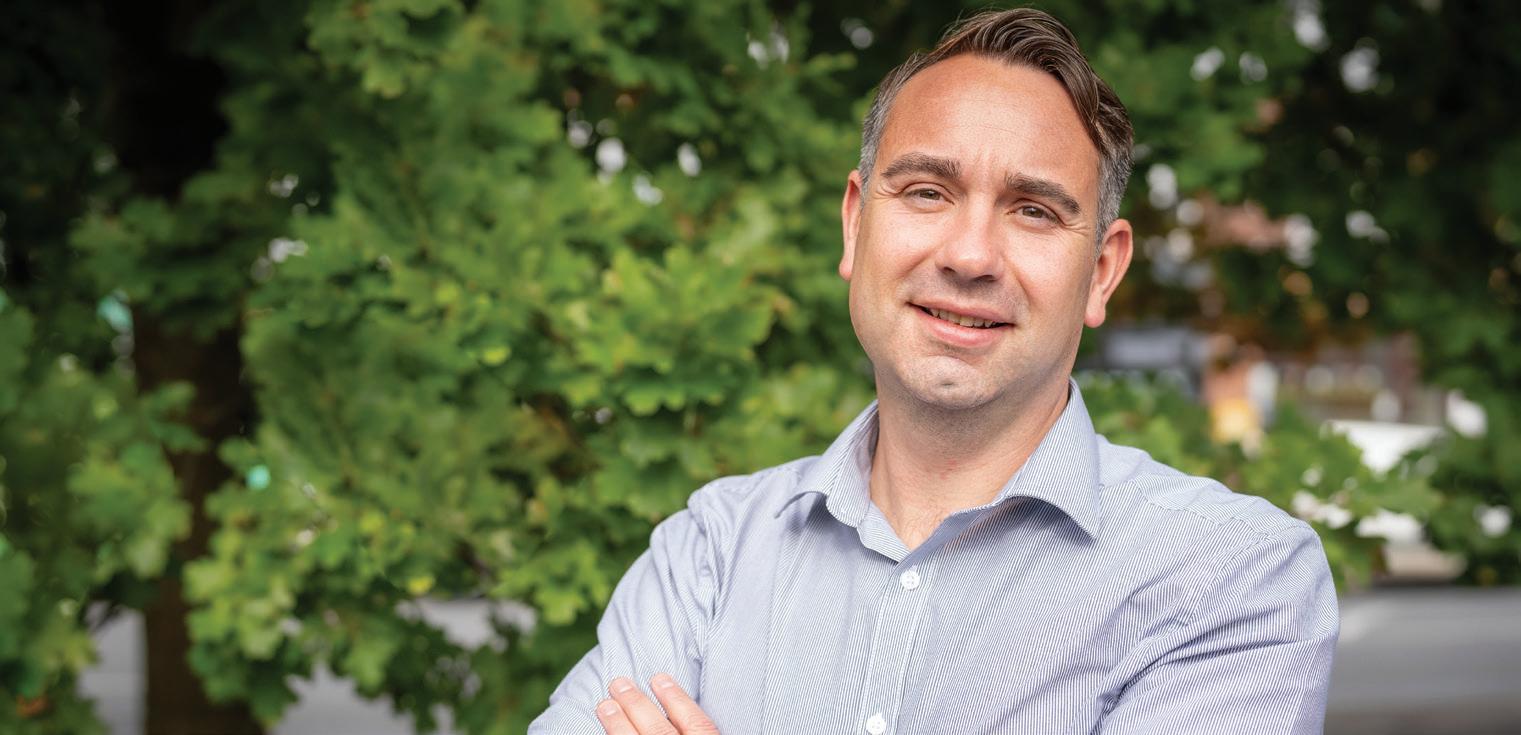
making it simpler to convert commercial premises into residential.
“Then we can look at what is appropriate for the market locally, and there are a number of new asset classes. A property owner may want to look at a straight residential conversion, or perhaps selfcontained studios for young professionals. Houses of multiple occupation (HMOs) would meet the lack of student and young professional accommodation in some of our university cities.
Build or convert-to-rent is a lucrative sector in many cities such as Southampton, Oxford or Reading because there is a certain percentage of the population which is relatively transient.
“After university graduates often stay in the city where they studied for a few years or relocate for work early on in their career. In both cases, until they decide where to build their lives more permanently (and saved enough money for a mortgage), many are happy to live in shared accommodation as long as they have their own facilities.
“It’s about understanding the market and where it’s going to go next,” added David. “Those wanting to upgrade old office buildings to meet the expectations of the modern worker will need to consider adding to its facilities – and not just a small gym in a corner, but a proper communal space where staff can socialise. There’s no point offering facilities if it’s just a box-ticking exercise.
“Converting redundant city centre
commercial buildings into residential is in everyone’s interest,” added David.
“Yes, the investment required from property owners may be significant, but looked at in the longer term it will help to meet the country’s chronic shortage of residential properties, boost councils’ tax take, bring back a sense of community into our towns and cities and provide landlords with regular income from buildings they can be proud of which meet the government’s longer-term high energy performance requirements.”
A former commercial building on the edge of Bristol city centre was redeveloped into a mixed use building arranged with workspaces for small creative businesses and 24 self-contained studios with bedrooms above.
It was an attractive four-storey building but with an unusual triangular floor-plate which meant rooms in a variety of shapes and sizes.
After redevelopment it offered private offices, workshops and messy space alongside plenty of break-out spaces, kitchen facilities and comfortable seating. It has since attracted a range of creatives and entrepreneurs. The high specification studios/bedrooms all have en-suite shower room facilities and communal space and have been let to professional tenants.


South East edition: Oxfordshire & Thames Valley Berkshire & Buckinghamshire Surrey, Kent & Sussex Solent & South Coast
South West & West Midlands edition: Bristol & Bath, Gloucestershire, Worcestershire & Hereford, Coventry & Warwickshire, Swindon & North Wiltshire
Editorial
Print Editor Nicky Godding nicky.godding@thebusinessmagazine.co.uk
The region’s most influential B2B magazine, in print and online for news, features, interviews and business sector analysis.
2024 Print issues will be published in January, March, May, July, September and November
Managing Director Richard Thompson richard.thompson@thebusinessmagazine.co.uk
Managing Editor Stephen Emerson stephen.emerson@thebusinessmagazine.co.uk
Operations Director Jo Whittle jo.whittle@thebusinessmagazine.co.uk
Visit our magazine online thebusinessmagazine.co.uk
Follow us: @TheBusinessMag linkedin.com/company/the-business-magazine
Reporter Daniel Face daniel.face@thebusinessmagazine.co.uk
Research & Rankings
Researcher Laura Clarke laura.clarke@thebusinessmagazine.co.uk
Events
Events Executive Lauren McCarron lauren.mccarron@thebusinessmagazine.co.uk
Events Executive Kimberley McLean kimberley.mclean@thebusinessmagazine.co.uk
Marketing
Digital Marketing Scott Whittle scott.whittle@thebusinessmagazine.co.uk
Commercial
Head of Client Relations Peter Laurie Thames Valley peter.laurie@thebusinessmagazine.co.uk
Business Manager Alan Lindstrom South Coast alan.lindstrom@thebusinessmagazine.co.uk
Media Sales Manager Alexandra Scrivener South West & alexandra.scrivener@thebusinessmagazine.co.uk West Midlands
Business Development Owen Thomas Manager South West owen.thomas@thebusinessmagazine.co.uk
Events events@thebusinessmagazine.co.uk
Accounts finance@thebusinessmagazine.co.uk
General Enquiries editorial@thebusinessmagazine.co.uk
Magazine Design: Origin Creative I www.origin-creative.com Publisher:
Printers: The Manson Group I www.mansongroup.co.uk Registered Office: 24 Bell lane, Blackwater, Camberley, Surrey, GU17 0NW Contact
Magazine Group Ltd – Company number 13202910

